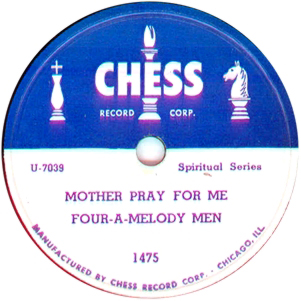
Revision note: Anthony Barnett (email communication, March 5, 2024) has filled in the rest of personnel on the instrumental titled "Dog Days," released on Checker 759 under the name of Al "Fats" Thomas. Now that the severity of the Universal Studios warehouse fire on June 1, 2008 is fully known—it destroyed 175,000 or more masters controlled by Universal Music Group (these included nearly everything UMG had acquired from previous owners of the Chess catalogue)—we regretfully have to assume that any tracks or sides not issued prior that date are lost, unless someone can point to evidence to the contrary (Jody Rosen, "The Day the Music Burned," New York Times Magazine, June 11, 2019, https://www.nytimes.com/2019/06/11/magazine/universal-fire-master-recordings.html). Among the sides that have perished are two vocals and two instrumentals recorded between June 10 and 13, 1950, by Andrew Tibbs with Sax Mallard, and never issued on Chess; Marv Goldberg has helped us nail down the date. We have provided some coverage of Guy Blakeman, the first Country artist to record for Chess (in 1950). We have worked in coverage of 45 rpm releases, from a company that was not an early adopter of the format (July 1951 for Chess 1469, August 1952 for Checker 758). More label photos will follow. We have also added a biography of Bobby Lewis, including more information about his 1952 session with the Leroy Kirkland Orchestra.
On June 3, 1950, Leonard and Phil Chess, now the sole owners of Aristocrat Recording Corporation, changed the name of the label to Chess. (See the announcement in Billboard, June 3, 1950, p. 18; they also announced hiring Len Davis, who had been with Old Swing-Master.) The brothers launched a new series of releases at number 1425. This commemorated their family's first home in Chicago, at 1425 South Karlov Street.
Of the first 8 releases on the new label (Chess 1425 through 1432), 6 used material recorded in June 1950 or earlier; they mark a transitional phase from Aristocrat to Chess. During the new label's first two years, its proprietors dipped further, but not very systematically, into the Aristocrat archives. Meanwhile, the Aristocrat records that they had in stock kept on being distributed until January 13, 1951, when the old label was officially discontinued. Leonard and Phil Chess made ample use of older Gene Ammons sides, reissuing several of his Aristocrat singles, but showed no apparent interest in older Muddy Waters performances. Muddy's only Aristocrat-era side to be reissued on Chess during this period was his 1948 hit "I Can't Be Satisfied," hastily retitled to serve as the flip to Chess 1514. (Chess didn't designate A and B sides, and most often promoted both sides of a release; this is one case where we know which side was the flip.) After the middle of 1952, Aristocrat material ceased to be of interest; it would not draw attention again until 1956, when Chess took up the LP.
Our first table displays material recorded for Aristocrat, up through the founding of Chess Records. Every session for Aristocrat is included that led to releases on Chess singles. Through the middle of 1952, when they lost interest in back catalog, the Chess brothers mined it for 27 sides (25 if we count only releases that actually took place; Chess 1483 by the Blues Rockers was cancelled). When the material was previously released on Aristocrat, we give the Aristocrat release number in square brackets, but the release dates are for the Chess incarnations only. You will find the Aristocrat release dates on our Aristocrat page.
We mark matrix numbers in bold when we have been able to verify them from the actual releases.

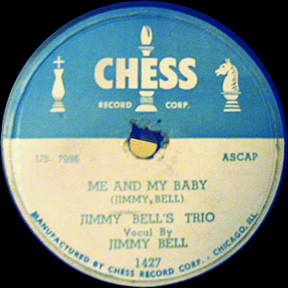
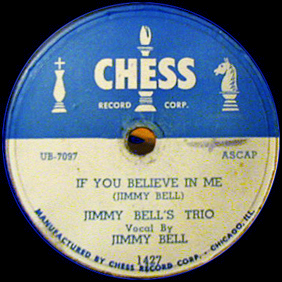

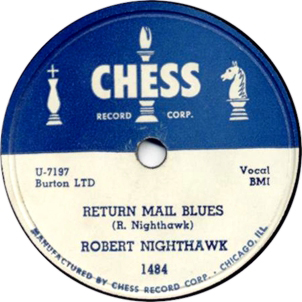
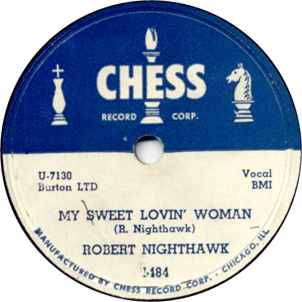
Chess did not promote all of its early releases in the trade papers. Down-home blues, in particular, was left to word of mouth, or personal visits by Leonard Chess. On July 1, 1950 (p. 6), Cash Box declared that Leonard was "bust[ing] right into the disk field with his first two records": Chess 1425 by Gene Ammons ("My Foolish Heart") and Chess 1426 by Muddy Waters ("Rollin' Stone"). The first was a big hit, the second not so much. On July 15, both records garnered an ad in Cash Box (p. 33), which served to remind distributors that Chess still needed some.
In its first few months, Chess worked to extract every penny from its Gene Ammons recordings. The sales on "My Foolish Heart" meant that more Ammons was the order of the day.
Chess 1428 was out in July, and despite the company's limited advertising budget, "Good Bye" was said to have drawn the interest of juke box operators on the South Side (Cash Box, August 19, 1950, p. 7). On September 16, the trade paper noted that 1428 was charting locally (p. 7). Pretty good for a record that Cash Box never reviewed…
While waiting to record Ammons again, the company reissued his entire January session: Chess 1429 was out in July and Chess 1431 in August. As Aristocrat retreads, neither got any ink in the trade press, but 1431 isn't hard to find today.
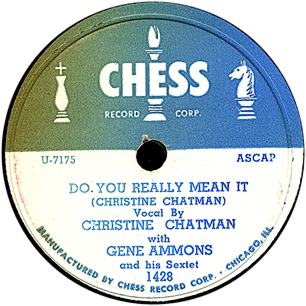
| Matrix | Artist | Title | Release Number | Recording Date | Release Date |
| U-7028 | Tom Archia and his Orchestra | Vocal: Sheba Griffin | Mean and Evil Daddy [Mean and Evil Baby] | Chess 1448 [Aristocrat 601A] |
July 1947 | January 1951 |
| U 7029 | Tom Archia and his All Stars (vocal: George Kirby) | Ice Man Blues | [Aristocrat 602A] | July 1947 | |
| U 7030 | Tom Archia and his All Stars (vocal: Sheba Griffin) | Cherry | [Aristocrat 602B] | July 1947 | |
| U 7031 | Tom Archia and his All Stars (vocal: Buster Bennett) | Fishin' Pole | [Aristocrat 601B] | July 1947 | |
| U 7036 | Seven Melody Men | Rockin' Lord | [Aristocrat 901A] | August 1947 | |
| U 7037 | Seven Melody Men | Nobody Knows - Nobody Cares | [Aristocrat 901B] | August 1947 | |
| U-7038 | Four-A-Melody Men [Seven Melody Men] | I'm on My Way | Chess 1475 [Aristocrat 902A] |
August 1947 | August 1951 |
| U-7039 | Four-A-Melody Men [Seven Melody Men] | Mother Pray for Me | Chess 1475 [Aristocrat 902B] |
August 1947 | August 1951 |
| U 7070 | Tom Archia and his All Stars | Jam for Sam | [Aristocrat 603B] | October 1947 | |
| U7071 | Tom Archia and his All Stars | Macomba Jump | [Aristocrat 604B] | October 1947 | |
| U7072 | Tom Archia and his All Stars | Downfall Blues | [Aristocrat 605] | October 1947 | |
| U-7073(reverb added) | Tom Archia and his Orchestra | Blues at Twilight [Slumber] | Chess 1448 [Aristocrat 603A] |
October 1947 | January 1951 |
| U-7094 | Jimmy Bell's Trio | Vocal by Jimmie Bell | Just about Easter Time | [Aristocrat 1901A] | December 1947 | |
| U-7095 | Jimmy Bell's Trio | Vocal by Jimmie Bell | Jimmy's Swing Boogie | [Aristocrat 1901B] | December 1947 | |
| UB 7096 [sic] | Jimmy Bell's Trio | Vocal by Jimmy Bell | Me and My Baby | Chess 1427 | December 1947 | June or July 1950 |
| UB-7097 [sic] | Jimmy Bell's Trio | Vocal by Jimmy Bell | If You Believe in Me | Chess 1427 | December 1947 | June or July 1950 |
| U7108 | Muddy Waters | Good Lookin' Woman | (Chess LP 80002) | December 1947 | |
| U7109 | Muddy Waters | Mean Disposition | (Chess LP 9180) | December 1947 | |
| U7110 | Sunnyland Slim with Muddy Waters | She Ain't Nowhere | [Aristocrat 1304A] | December 1947 | |
| U7111 | Sunnyland Slim with Muddy Waters | My Baby, My Baby | [Aristocrat 1304B] | December 1947 | |
| [U7112] U-7112 | [Muddy Waters with rythm [sic] accompaniment] Muddy Waters and his Guitar |
[I Can't Be Satisfied] Looking for My Baby |
[Aristocrat 1305A] Chess 1514 |
December 1947 | June 1952 |
| U7113 | Muddy Waters with rythm [sic] accompaniment | I Feel like Going Home | [Aristocrat 1305B] | December 1947 | |
| U7127 | Nighthawks (vocal: Ethel Mae) | Down the Line | (Chess [Br] 6499 433) | July or August 1948 (mastered November 10, 1948) | |
| U7128 | Nighthawks (vocal: Ethel Mae) | Handsome Lover | (Chess [E] 6499 433) | July or August 1948 | |
| U7129 | Nighthawks (vocal: Robert McCullum) | Return Mail Blues | unissued | July or August 1948 | |
| U-7130 | Robert Nighthawk | My Sweet Lovin' Woman | Chess 1484 | July or August 1948 | December 1951 |
| U7140? | Tom Archia and his All Stars | Jam for Boppers | (Chess LP 1445) | early October 1948 | |
| U7141 U-7140 on the label of Chess 1445 |
Gene Amons [sic] and Tom Archia [Tom Archia and his All Stars] |
Boppin with Santa [also sic] [Swinging for Christmas] |
Chess 1445 [Aristocrat 606] |
early October 1948 (mastered October 12, 1948) |
November 1950 |
| U-7142 | Gene Amons and Tom Archia [Tom Archia and his All Stars] |
Talk of the Town | Chess 1445 [Aristocrat 606] |
early October 1948 | November 1950 |
| U7143? | Tom Archia and his All Stars | The Battle | (Chess CHV 414) | early October 1948 | |
| U-7174 | Christine Chatman's All Star Combo With "Gene Ammons" On Tenor| Vocal: Christine Chatman | Hey Mr. Freddy | [Aristocrat 8001B] | February 28, 1949 | |
| U-7175 | Vocal by Christine Chatman with Gene Ammons and his Sextet | Do You Really Mean It | Chess 1428 | February 28, 1949 | July 1950 |
| U7176 | Gene Ammons? | unissued? | February 28, 1949 | ||
| U-7177 | Christine Chatman's All Star Combo With "Gene Ammons" On Tenor| Vocal: Christine Chatman | When Your Hair Has Turned to Silver | [Aristocrat 8001A] | February 28, 1949 | |
| U7178 | Gene Ammons? | ? | unissued? | February 28, 1949 | |
| U-7179 | Gene Ammons and his Sextet | Vocal: Mary F. Graham | Bless You | Chess 1425 | February 28, 1949 | June 1950 |
| U-7180 | Three O'Clock Jam Session | Leo Blivers [sic] Guitar, Ike Day Drums, Gene Ammons Tenor Sax, Christine Chatman Piano, Lowell Pointer Bass | Part 1 (Stuffy) | [Aristocrat AR-711A] | February 28, 1949 | |
| U-7181 | Gene Ammons Orchestra [Three O'Clock Jam Session] |
Once in a While [Part 2 (Once in a While)] |
Chess 1525 [Aristocrat AR-711B] |
February 28, 1949 | September 1952 |
| UB 9549 | Rev. "Gatemouth" Moore and his Congregation | The Bible's Being Fulfilled Every Day | [Aristocrat 905A] | April or May 1949 [United Broadcasting Studio] |
|
| UB 9550 | Rev. "Gatemouth" Moore and his Congregation | Glory, Glory, Hallelujah | [Aristocrat 905B] | April or May 1949 [United Broadcasting Studio] |
|
| UB-9551 | Rev. Gatemouth Moore | I'm Going Through | Chess 1437 | April or May 1949 [United Broadcasting Studio] |
October 1950 |
| UB-9552 | Rev. Gatemouth Moore | Thank You Jesus | Chess 1437 | April or May 1949 [United Broadcasting Studio] |
October 1950 |
| UB9720 [purchased from John Coppage] |
Floyd Smith | Blue Moods | Chess 1439 [Aristocrat 409] |
June 8, 1949 [United Broadcasting Studio] |
November 1950 |
| UB9721 [purchased from John Coppage] |
Floyd Smith | Saturday Night Boogie | Chess 1439 [Aristocrat 409] |
June 8, 1949 [United Broadcasting Studio] |
November 1950 |
| U7194 | The Nighthawks (vocal: Robert McCullum) | She Knows How to Love a Man | (Blues Ball LP 2003) | July 12, 1949 | |
| U7195 | The Nighthawks (vocal: Robert McCullum) | Black Angel Blues | [Aristocrat 2301B] | July 12, 1949 | |
| U7196 | The Nighthawks (vocal: Robert McCullum) | Annie Lee Blues | [Aristocrat 2301A] | July 12, 1949 | |
| U-7197 | Robert Nighthawk | Return Mail Blues | Chess 1484 | July 12, 1949 | December 1951 |
| U7198 | The Nighthawks (vocal: Ethel Mae) | Sugar Papa | (Chess [Br] 6499 433) | July 12, 1949 | |
| U7231 | Gene Ammons and his Orchestra | Pennies from Heaven | Chess 1431 [Aristocrat 411A] |
January 8, 1950 | August 1950 |
| U7232 | Gene Ammons and his Orchestra | The Last Mile | Chess 1431 [Aristocrat 411B] |
January 8, 1950 | August 1950 |
| U-7233 | Gene Ammons and His Sextet | Chabootie | Chess 1429 [Aristocrat 416] |
January 8, 1950 | July 1950 |
| U7234 | Gene Ammons and His Sextet | Full Moon [correct title: More Moon] |
Chess 1429 [Aristocrat 416] |
January 8, 1950 | July 1950 |
| U7235 | Muddy Waters | Rollin' and Tumblin' (Part 1) | [Aristocrat 412A] | February 1950 | |
| U7236 | Muddy Waters | Rollin' and Tumblin' (Part 2) | [Aristocrat 412B] | February 1950 | |
| U-7237 | Muddy Waters and his guitar | Rollin' Stone | Chess 1426 | February 1950 | June 1950 |
| U-7237 [alt.] | Muddy Waters | Rollin' Stone [alt.] | (Chess LP 8202) | February 1950 | |
| U-7238 | Muddy Waters and his guitar | Walkin' Blues | Chess 1426 | February 1950 | June 1950 |
| U-7239 | Blues Rockers | When Times Are Getting Better | [Aristocrat 413 [!]] | March 5, 1950 | |
| U-7240 | Blues Rockers | Blues Rockers' Bop | [Aristocrat 413 [!]] | March 5, 1950 | |
| U7241 | The Blues Rockers | Little Boy, Little Boy | Chess 1483 (cancelled) [Aristocrat 417?] |
March 5, 1950 | December 1951 |
| U7242 | The Blues Rockers | My Mama's Baby Child | Chess 1483 (cancelled) [Aristocrat 417?] |
March 5, 1950 | December 1951 |
| 7247 | Gene Ammons and His Orchestra | Tenor Eleven | Chess 1525 | May 2, 1950 | September 1952 |
| U-7248 | Gene Ammons and His Sextet | Good Bye | Chess 1428 | May 2, 1950 | July 1950 |
| U7249 | Gene Ammons and His Sextet | You Go to My Head | (Chess LP 1442) | May 2, 1950 | |
| U-7250 | Gene Ammons and His Sextet | My Foolish Heart | Chess 1425 | May 2, 1950 | June 1950 |
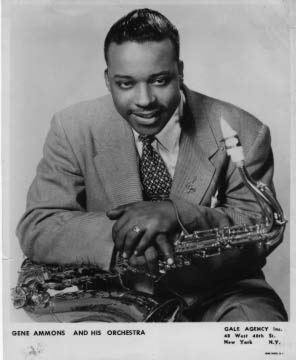
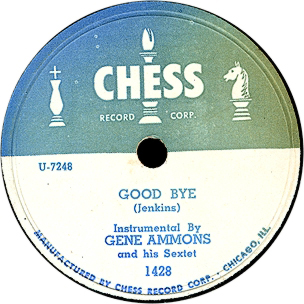
The Chess brothers continued to book studio sessions at Universal Recording in Chicago. Universal would, in fact, remain their studio of choice during this entire period. They did not acquire the ability to make rough and ready recordings in their offices until 1954, and the renowned Chess studios wouldn't open until May 1957. But their operation was on the tightest of budgets. In the U7000 series that Chess inherited from Aristocrat, just 30 new sides were newly recorded at Universal Recording in Chicago—and that's if we assume that the missing U7257 and U7258, U7273 and U7274 were actually made. Two further sides by The Dozier Boys were cut at United Broadcasting Studios in August; the rapidity with which these items were released indicates that they were done for Chess, not for the Premium label which regularly used that studio and eventually sold most of its remnants to the Chess brothers. Besides, Aristocrat had used United Broadcasting Studios on several occasions in 1948 and 1949. Chess also cut two Claude McLin sides at Modern Recording Studio (a studio used by such rival indies as JOB and Seymour). These bring the total to a measly 34.
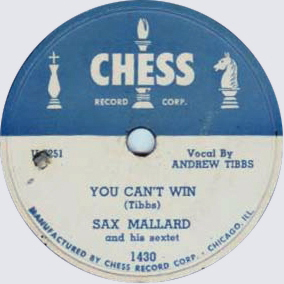
The first session done under the auspices of the new label consisted of six sides by two artists already established on the Aristocrat roster. We had previously placed the session vaguely in July. Now we have learned that it was supervised by DJ and record producer Randy Wood, who among other things distributed Chess in Tennessee, and took place during the NAMM Convention (July 10 through 13). An item in Billboard (July 22, 1950, p. 39, rediscovered by Marv Goldberg) tells the tale. Uptown blues singer Andrew Tibbs had been responsible for no fewer than 7 releases on the predecessor label. Through the middle of 1949 he had been the company's most reliable seller. In May, while he was still an "Aristocrat Recording Star," Tibbs got top billing in a revue at the Flame Show Bar in Detroit (Detroit Free Press, May 19, 1950, p. 12), along with Big Bertha Henderson and Kitty Stevenson. Maurice King and His Wolverines were the house band. For more about Tibbs, see http://www.uncamarvy.com/AndrewTibbs/andrewtibbs.html
Sax Mallard had released three singles of his own and accompanied Tibbs and the Dozier Boys. What's more, when the session was cut, Mallard was a featured soloist in the all-star jazz band that Al Benson had put together for a Saturday night TV show on WBKB. Mallard seems to have used several of his band mates on the session, to which he contributed subtly Ellingtonian arrangements. Filling on on baritone sax, in his studio debut, was Laurdine "Pat" Patrick. Whatever its attractions to jazz fans today, this was not the sound that most record buyers wanted. Just one single was released from the session. Despite the expense of recording them, the rest (probably two further vocals and two instrumentals) remain unissued to this day.
Unfortunately, Tibbs was addicted to heroin, and his habit would soon get him into trouble. In May 1951, he was sent to the Federal facility in Lexington, Kentucky, for the "dope cure." In his case it was successful, and in October 1951 he was working again, at the Baby Grand in Brooklyn (Pittsburgh Courier, October 20, 1951, p. 17). However, he soon developed a drinking habit, and although Andrew Tibbs made a few more records, they would all be for other companies.
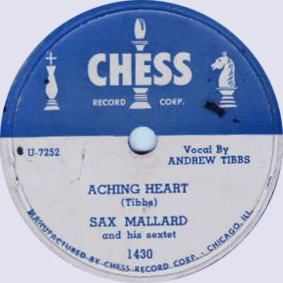
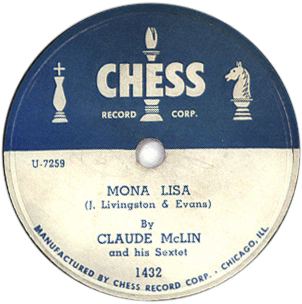
The Chess brothers' next move was to bring Claude McLin back into the studio. They knew the tenor saxophonist from his frequent participation in jam sessions at the Macomba Lounge. In March 1949, his band was in residence there while Tom Archia temporarily worked the Congo Club, and he recorded for Aristocrat behind singer and pianist Laura Rucker. The idea on this occasion was to get Claude McLin to follow Gene Ammons' lead by recording a popular ballad. The tune selected was "Mona Lisa," which had been a big hit for Nat "King" Cole; a violinist and a steel guitarist sweetened McLin's regular combo sound on this number only. The flip side, "Benny's Bounce," was more typical McLin fare, though a mystery second tenor saxophonist joined in. We don't know for sure whether two further sides were made, as was customary at the time, or the allotted 3 hours were consumed getting "Mona Lisa" and "Benny's Bounce" right.
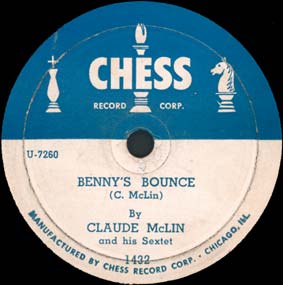
"Mona Lisa" got a review in Cash Box (August 12, 1950, p. 16). The company bought an ad for it in the Pittsburgh Courier (August 19, 1950, p. 16) and even sprang for one in Cash Box (September 2, 1950, p. 15). The record sold well enough to keep Claude McLin in Chicago for another year and a half; he had been scuffling for gigs since late 1949, but his fortunes trended up now that he had a record out.
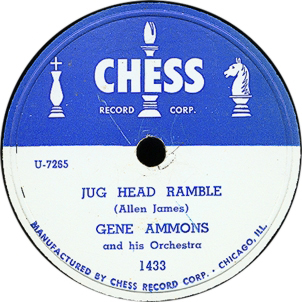
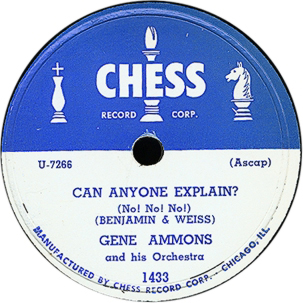
The Chess brothers were eager to record their top-selling artist, Gene Ammons, whose May session had produced the label's biggest hit of the year. Jug entered the studio in August to cut four sides with the latest version of his working group: Bill Massey on trumpet, Mattthew Gee on trombone, Junior Mance at the piano, Gene Wright, bass, and Wes Landers, drums. He even got his celebrity front-line partner Sonny Stitt to participate, on baritone sax. All four sides were promptly released on two singles.
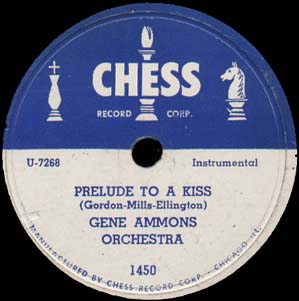
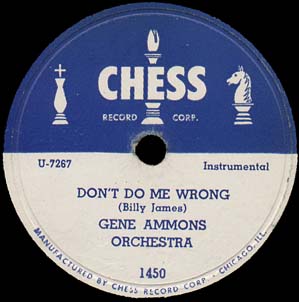
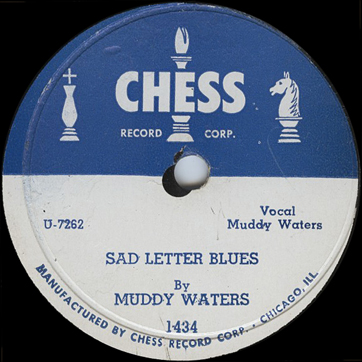
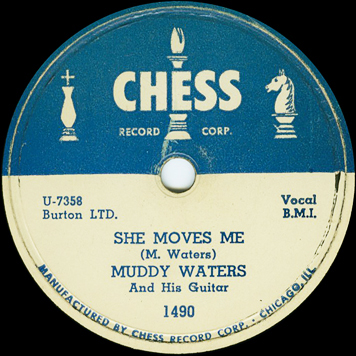
Another high priority was gettingMuddy Waters back in the studio. Since two sides from Muddy's second session for Aristocrat had scored a local hit in the summer of 1948, he had become an increasingly valuable asset to the label, and the Chess brothers intended to build on what he had already accomplished. They had been challenged, earlier in the year, by Muddy's moonlighting on a session for the short-lived Parkway label that featured his regular band with Little Walter and Baby Face Leroy Foster. Foster had left after his Parkway sides were released, but Leonard and Phil Chess finally ended their holdout and decided to include Little Walter on a Muddy Waters session.
Four sides were made at an unclear date—most likely August 15, 1950, when the two sides featuring Jimmy Rogers are known to have been made. The results, enriched by Walter's harmonica playing, were impressive. The company still fell short, however, of including Waters' full band; the only other participant on the session was bassist Big Crawford.
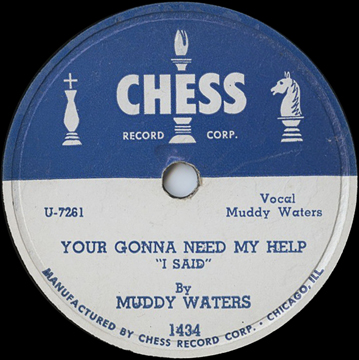
The strong release on Chess 1434 paired two of Muddy's best slow blues, "Sad Letter Blues" and "You're Gonna Need My Help, I Said" (a title that got a creative parsing on the label). The record was not a hit—and the Chess brothers would not buy an ad in Cash Box for anything by Muddy till the end of the year—but the groundwork for future success was laid.
The other two sides from the session were both released within a year, "Appealing Blues" on Chess 1468, and "Early Morning Blues" on Chess 1490.
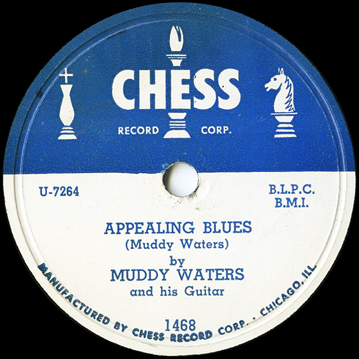
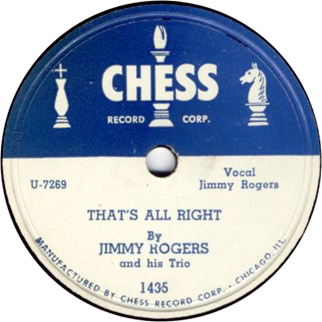
Another delayed reaction to Parkway behavior was signing Jimmy Rogers, who had been playing second guitar in Muddy's working band for quite some time. In all this time, Rogers had gotten one side of one record out: "Round About Boogie," which featured him singing and playing his first instrument, the harmonica, was made in 1946 for J. Mayo Williams' Harlem label. It sold barely anything, to buyers who had no way to know he was there because his side was misattributed on the label to Memphis Slim. Rogers subsequently sang and played guitar on sessions for Ora Nelle (1947), Tempo-Tone (1949), JOB (1949), and finally Parkway (1950)—without getting sides released from any of them. On August 15, he was called in to cut two titles of his own, both already tried and tested. "That's All Right" had been on his JOB session; before that he had played behind Othum Brown's released rendition of the same song when it was called "Ora Nelle Blues." "Ludella" had been Rogers' only side for Parkway. On each, his vocals and guitar enjoyed sterling backing from this bandmates: Little Walter on harmonica, and Big Crawford on string bass. It must have been gratifying to get "Ludella" out on the radio and onto the retail shelves; meanwhile, "That's All Right" was a substantial hit.
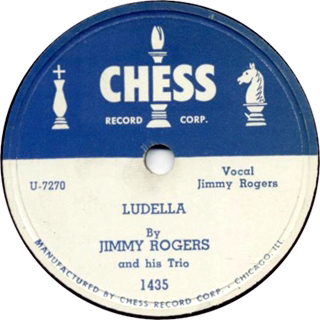
Next came the Dozier Boys, who had been the most active vocal harmony group on Aristocrat. Apparently just two sides were done, at United Broadcasting studio instead of Universal. The resulting single effectively contrasted a jump, "You Got to Get It," with a ballad, "Pretty Eyes," but the release is tremendously scarce today and obviously didn't sell. King Fleming was the session pianist for the date, and a horn section was added for "Got to Get It." The company dropped the group, whose next contract would be with OKeh's revived Chicago operation (they did a session in 1951, and were listed in advertisements for the label, but their sides were never released). The Doziers would fare better with a new indepedent called United, where they recorded in 1952 and 1953.
Two months went by without more studio recording. Leonard Chess still operated the Macomba Lounge, though now that he bore primary responsibility for the record company, club management was largely delegated to Phil. But four years of club ownership and its attendant burdens came to end when the Macomba Lounge was badly damaged by fire. Nadine Cohodas's book places the fire in August, but the lists of contracts accepted and filed by Musicians Union Local 208 indicate it was a little later, probably in early October. The Chess brothers didn't try to open another club; they were now irrevocably committed to the record company.
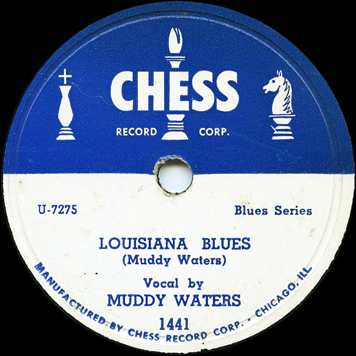
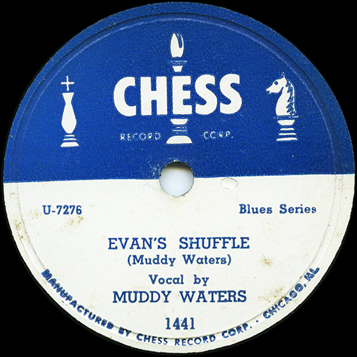
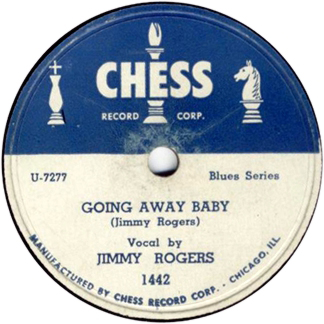
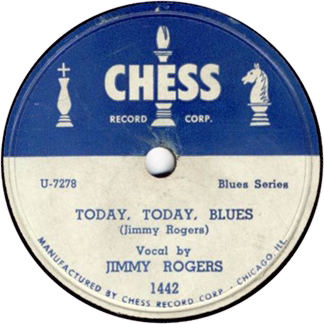
On October 23 the company held another session featuring Muddy Waters' band, again with Walter and Crawford. Only two of the six sides had Muddy's vocals, but one of these, "Louisiana Blues," turned out to be a classic. Its flip, "Evan Shuffle," strategically named after a DJ—it was supposed to be Evans' Shuffle—was an enjoyably rustic instrumental featuring Walter's harmonica. Chess 1441 was out in November. As with Chess 1426 and Chess 1434,Cash Box didn't review it, but at the end of the year, the company placed an ad in Cash Box, for 1441 along with Lucky Thompson on 1438, Calvin Bostick on 1444, and Ammons and Archia on 1445 (December 30, 1950, p. 30).
Two tracks were features for Jimmy Rogers, again accompanied by Walter and Crawford; "Going Away Baby" is a close relation to "Louisiana Blues." The final two were vehicles for Johnny Shines, who was making his debut for Chess, with accompaniment by Walter, Rogers, and Crawford (Shines was not asked to play his guitar on this occasion). The Shines sides were of the same superb quality as the rest of the material recorded that day, but were held back from release, despite being given a number and listed in a Chess catalogue. Apparently Leonard Chess developed second thoughts, on the grounds that Shines's declamatory vocal style was too likely to compete with Muddy Waters'. Shines wouldn't get another opportunity until Joe Brown recorded him in April 1952.
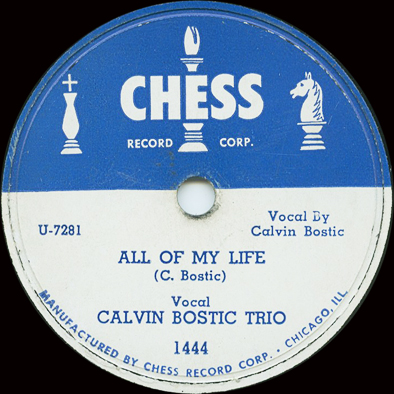
Aristocrat had carried three piano trios on its roster, under the leadership of Prince Cooper, Jimmy Bell, and Duke Groner. Though each trio remained active, their contracts had all expired and the Chess brothers had lost interest. Chess 1427 hadn't sold, and Jimmy Bell decamped to Premium. Exclusive put out a single on Prince Cooper in 1949 (it had been recorded in 1946), and in the fullness of time the pianist would land at Club 51. Duke Groner would resurface at Vee-Jay.
Instead, the brothers chose pianist and singerCalvin Bostick, whose unit had been working steadily in the South Side clubs for a year. He was born Calvin Thomas Bostick on July 4, 1928, in Anniston, Alabama. He began playing piano when he was four years old, and attended secondary school at the Mary Potter Academy, in Oxford, North Carolina. He majored in music at Lincoln University, in Jefferson City, Missouri, studying under the famed composer R. Nathaniel Dett. There Bostick wrote “People Will Talk about You” and “All of My Life.” Upon graduation in 1947 he moved to Chicago, but did not join Local 208 until October 18, 1949.
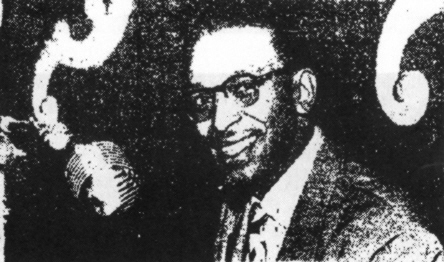
C. T. Bostick showed up right away on the Local 208 contract list on October 20, 1949, when he posted a contract for 3 nights at Square's. He drew well enough to rate another week there (contract accepted and filed November 3, now under the name "Cal Bostick"). On January 19, 1950, he posted an "indefinite" contract with the 113 Club, which featured piano trios. In April he moved to the 411 Club (3 month contract filed on April 6). In July, he extended his residency there for another six months (contract posted on July 20). The 411 Club was a cocktail lounge, where Bostic's classically trained tinkling posed no threat of stretching the boundaries of jazz.
Bostick cut his first single for Chess in October, while still resident at the 411. His session actually took place before the Muddy Waters/Jimmy Rogers/Johnny Shines outing, indicating some casualness in updating the master book. An item in the October 14 Chicago Defender, titled “Calvin Cuts 2 New Sides,” claimed that they were “currently on tryout with local disk jockeys.” “People Will Talk about You” was described as a “novelty blues,” and “All of My Life” was described as a ”blues ballad.” These were both accurate descriptions. The numbers were plainly inspired by Nat King Cole, as was Bostick's vocal style on each. We do not know who Bostick's guitarist and bassist were, but the trio heard on the record is tight and virtuosic and the guitarist gets a solo.
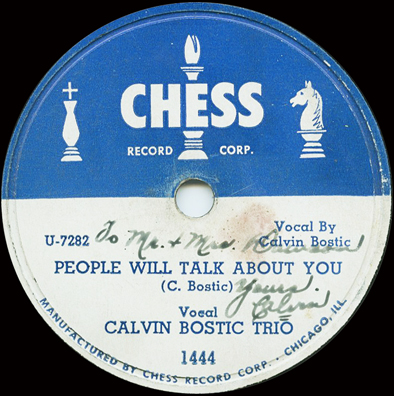
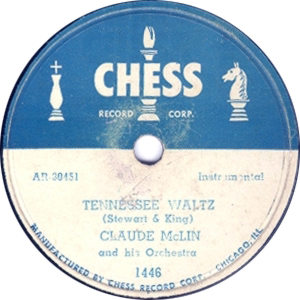
Around the same time, the company urgently wanted a sequel to "Mona Lisa." Claude McLin and his band cut two sides at Modern Recording Studio. This time, the chosen vehicle was "Tennessee Waltz," which was growing into a monster hit for Patti Page on Mercury and was drawing R and B cover versions (in addition to two Chicago-based covers there was at least one out of New York, by Milt Larkin and his X-Rays for Regal). Although the material was worthy, and McLin's rendition, unhampered by the added violin, was eloquent, a new Chicago-based competitor called Chance had had the same idea, and Schoolboy Porter's version trounced McLin's at the cash register. Most listeners today would prefer McLin's jazz balladeering over Porter's purposely square enunciation of the melody. But Chess never reissued "Tennessee Waltz," or its flip, a surprisingly substantial improvisation on "Pop Goes the Weasel."
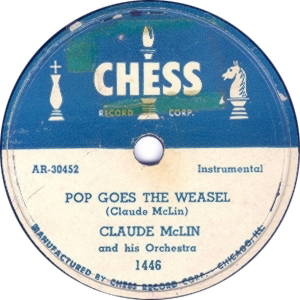
Another symptom of tightness in the finances was the company's decision not to record new numbers for the Christmas season. Instead, Tom Archia and Gene Ammons' medley from 1948 was recycled under a new title, "Boppin' for Santa." The flip of Chess 1445 consisted of "Talk of the Town" (not retitled) from the same session. Credits were changed to draw attention to Jug's presence on both sides. Leonard Chess used the occasion to test out his new system for putting reverb on recordings: it consisted of a 3-foot length of concrete sewer pipe with a speaker at one end and a microphone at the other. The results on "Boppin' for Santa" were underwhelming (as was the applause dubbed in at the beginning) but Leonard would learn how to put his homemade equipment to better use. Meanwhile, Chess 1445 is harder to find today than Aristocrat 606, just as Chess 1448 is harder to find than Aristocrat 601—which goes a long way toward explaining why the Chess brothers didn't bring Tom Archia back for further sessions.
| Matrix | Artist | Title | Release Number | Recording Date | Release Date |
| U-7251 | Sax Mallard and his sextet | Vocal by Andrew Tibbs | You Can't Win | Chess 1430 | between July 10 and 13, 1950 | August 1950 |
| U-7252 | Sax Mallard and his sextet | Vocal by Andrew Tibbs | Aching Heart | Chess 1430 | between July 10 and 13, 1950 | August 1950 |
| U7253 | Sax Mallard and his sextet (vocal by Andrew Tibbs) | She's My Baby | unissued | between July 10 and 13, 1950 | |
| U7254 | Sax Mallard and his sextet (vocal by Andrew Tibbs) | Crying the Blues | unissued | between July 10 and 13, 1950 | |
| U7255 | Sax Mallard and his sextet (vocal by Andrew Tibbs) | Boogie | unissued | between July 10 and 13, 1950 | |
| U7256 | Sax Mallard and his sextet (vocal by Andrew Tibbs) | Blues in Hawaii | unissued | between July 10 and 13, 1950 | |
| U7257 | Claude McLin? | ||||
| U7258 | Claude McLin? | ||||
| U-7259 | Claude McLin and his Sextet | Mona Lisa | Chess 1432 | July 21, 1950 | August 1950 |
| U-7260 | Claude McLin and his Sextet | Benny's Bounce | Chess 1432 | July 21, 1950 | August 1950 |
| U-7261 | Muddy Waters | Vocal Muddy Waters | Your [sic] Gonna Need My Help "I Said" | Chess 1434 | prob. August 15, 1950 | September 1950 |
| U-7262 | Muddy Waters | Vocal Muddy Waters | Sad Letter Blues | Chess 1434 | prob. August 15, 1950 | September 1950 |
| U-7263 | Muddy Waters and His Guitar | Early Morning Blues | Chess 1490 | prob. August 15, 1950 | December 1951 |
| U-7264 | Muddy Waters and his Guitar | Appealing Blues | Chess 1468 | prob. August 15, 1950 | Juney 1951 |
| U-7265 | Gene Ammons and his Orchestra | Jug Head Ramble | Chess 1433 | August 1950 | September 1950 |
| U-7266 | Gene Ammons and his Orchestra | Can Anyone Explain? (No! No! No!) | Chess 1433 | August 1950 | September 1950 |
| U-7267 | Gene Ammons Orchestra | Don't Do Me Wrong | Chess 1450 | August 1950 | February 1951 |
| U-7268 | Gene Ammons Orchestra | Prelude to a Kiss | Chess 1450 | August 1950 | February 1951 |
| U-7269 | Jimmy Rogers and his Trio | Vocal Jimmy Rogers | That's All Right | Chess 1435 | August 15, 1950 | October 1950 |
| U-7270 | Jimmy Rogers and his Trio | Vocal Jimmy Rogers | Ludella | Chess 1435 | August 15, 1950 | October 1950 |
| UB50-817 | Vocal by the Dozier Boys | You Got to Get It | Chess 1436 | c. August 1950 | October 1950 |
| UB50-818 | Vocal by the Dozier Boys | Pretty Eyes | Chess 1436 | c. August 1950 | October 1950 |
| U7271 | and | U7272 | See | Purchased | Material |
| U7273 | |||||
| U7274 | |||||
| U-7275 | Muddy Waters | Louisiana Blues | Chess 1441 | October 23, 1950 | November 1950 |
| U-7276 | Muddy Waters | Evan's Shuffle | Chess 1441 | October 23, 1950 | November 1950 |
| U-7277 | Vocal by Jimmy Rogers | Going Away Baby | Chess 1442 | October 23, 1950 | November 1950 |
| U-7278 | Vocal by Jimmy Rogers | Today, Today, Blues | Chess 1442 | October 23, 1950 | November 1950 |
| U7279 | Shoe Shine Johnny | Joliet Blues | Chess 1443 [never released] |
October 23, 1950 | |
| U7280 | Shoe Shine Johnny | So Glad I Found You | Chess 1443 [never released] |
October 23, 1950 | |
| U-7281 | Calvin Bostic [sic] Trio | Vocal by Calvin Bostic | All of My Life | Chess 1444 | October 1950 | December 1950 |
| U-7282 | Calvin Bostic Trio | People Will Talk about You | Chess 1444 | October 1950 | December 1950 |
| U7283 | Calvin Bostic Trio | Danny Boy | October 1950 | ||
| AR-30451 E0-0B-13025-1 |
Claude McLin and his Orchestra | Tennessee Waltz | Chess 1446 | November 1950 | December 1950 |
| AR-30452E0-0B-13026-1 |
Claude McLin and his Orchestra | Pop Goes the Weasel | Chess 1446 | November 1950 | December 1950 |
Confirming our hypothesis that they were keeping an eye on every penny, the Chess brothers leased or purchased hardly any material in 1950.
Two sides by jazz tenor saxophonist Lucky Thompson, one of which featured a vocal by his wife Thelma Thompson, were recorded in New York City. An item in Cash Box (November 4, 1950, p. 11) gives Phil Chess credit for supervising the session: "Phil Chess returned to Chicago this week after a trip to NY where he cut "Slow Drag," an instrumental recorded by Lucky Thompson and his orchestra." Which doesn't quite fit the recording date of September 15, 1949. It seems more likely that Phil Chess purchased the sides, though we have no idea from whom.
At least we know when Chess 1438 was released. On November 25, 1950 (p. 17), the company splurged on a Cash Box ad for Chess 1438, along with 1444 by Calvin Bostick and 1445 by Gene Ammons and Tom Archia. There was a second mention in an ad from December 30 (p. 30).

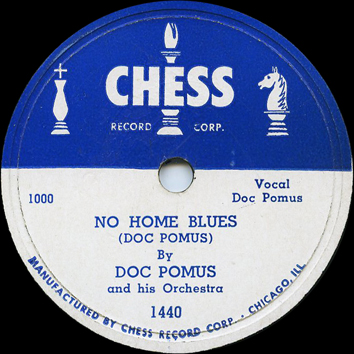
Chess also acquired two sides by blues singer Doc Pomus (who was born Jerome Solon Felder on June 27, 1925, in Brooklyn). Accompaniment to the Doctor's raspy vocals was provided by a jump band. On "Send for the Doctor, Pomus exhorts the tenor saxophone soloist to "Bug out, Ray." A little later the trumpet soloist is encouraged to "Get it, Rex." Pomus recalled in an interview that Leonard Chess had actually traveled to New York to record the session; could be, but at least there's no dubiety about the location. In the liner notes to Whiskey Women and KM 700, Pomus recalled that the session was Rex Stewart's: Stewart was on trumpet, Ray Abrams on tenor sax, Reggie Ashby at the piano, and Leonard Gaskin on bass. That leaves just the drummer unidentified. (Our thanks to Yves Françle;ois for pointing us to Pomus' recollections).
The Pomus sides carry a CR prefix in the plastic, though not on the label. The CR could stand for another record company; it could also be an abbreviation for Chess Records. As a New York-based performer, Doc Pomus did not record again for Chess. In 1957, he became a full-time songwriter, collaborating with Mort Shuman, Phil Spector, and others. Doc Pomus died of lung cancer on March 14, 1991, at NYU Medical Center in Manhattan; he was 65.
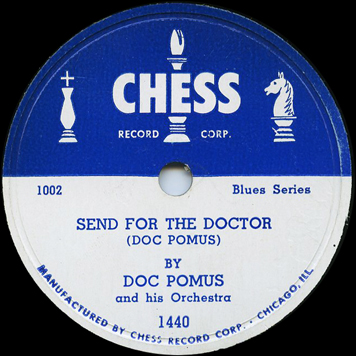
Finally, the brothers picked up two Country sides by Guy Blakeman and His Blue Grass Serenaders. These probably came from Stan Lewis in Shreveport, Louisiana; Lewis had been a distributor since the Aristocrat days, and in the future he would become a somewhat more regular supplier. However, Lewis's strongest connection was with the Louisiana Hayride out of Shreveport, and Guy Blakeman was on a competing circuit, the Midwestern Hayride. This makes it unclear where the sides were recorded; maybe they were done in Cincinnati. It appears Leonard and Phil got them in August 1950 (as indicated by the U7000 matrix numbers that the sides ended up with).
Guy Jasper Blakeman was born in Metcalfe County, Kentucky, in 1911; he sometimes listed Knob Lick as his place of origin. He learned to play the fiddle as a boy. In 1927, he moved to Cincinnati, Ohio, to work in a factory. He lost the factory job in the Depression, but was able to pick up work playing the fiddle on radio station WCKY (Covington, Kentucky) in a group called the Bluegrass Serenaders. The bluegrass style didn't exist yet; the group was merely named after the state. He subsequently worked with the Range Riders, later with the Mountain Rangers, a group that did radio work in Kentucky and in St. Louis, Missouri. When he made his session for Chess, he was a member of the Prairie Ramblers, who appeared on the Midwestern Hayride, broadcast by WLW in Cincinnati (see the ad in The Brook Reporter, Brook, Indiana, June 29, 1950, p. 2).
Such ads as we've spotted for Blakeman's appearances in 1951 (e.g., The Journal-Herald, Dayton, Ohio, September 3, 1951, p. 6) mention the WLW connection, but not the Chess release. In 1952, he won the International Fiddling Contest at the Kentucky State Fair (Louisville Courier-Journal, September 11, 1952, sec. 1 p. 16), which got him four sides on the Gateway label. Blakeman probably wasn't too interested in recording; his other appearances were on a 1979 LP by traditional musicians from the Cincinnati area, and an EP of fiddle tunes from 1982, on the Musique label. Guy Blakeman died in 1992.
We had thought, as others have, that the Blakeman record didn't appear until November 1952. Whoops. The single was reviewed in Cash Box on October 28, 1950 (p. 19). This goes some distance toward explaining how it ended up being one of two singles that were given the number Chess 1525. Most likely, 1525 was meant to start a new series for Country music. Nothing followed and soon the intention was forgotten. Aside from two isolated entries, Chess 1495 by Bob Price, which the brothers got from Sam Phillips, and Checker 761, by Tommy Trent, which they got from Stan Lewis, Chess wouldn't revert to Country till the company launched its 4858 series in 1954. In total, there were 6 sides purchased in 1950, all of which saw release that year.
| Matrix | Artist | Title | Release Number | Recording Date | Release Date |
| U-1902 [source unidentified] |
Lucky Thompson and his Orchestra | Slow Drag | Chess 1438 | September 15, 1949 [New York City] |
November 1950 |
| U-1903 [source unidentified] |
Vocal by Thelma Thompson with Lucky Thompson and his Orchestra | Nothin' from Nothin' | Chess 1438 | September 15, 1949 [New York City] |
November 1950 |
| 1000 [source unidentified] |
Doc Pomus and his Orchestra | No Home Blues | Chess 1440 | 1950 [New York City] |
November 1950 |
| 1002 [source unidentified] |
Doc Pomus and his Orchestra | Send for the Doctor | Chess 1440 | 1950 [New York City] |
November 1950 |
| U-7271 [Stan Lewis] |
Guy Blakeman and His Blue Grass Serenaders | Oh Yes I Am Lonely | Chess 1525 | 1950 [location unknown] |
October 1950 |
| U-7272 [Stan Lewis] |
Guy Blakeman and His Blue Grass Serenaders | I Ain't Gonna Give Nobody None of My Jelly Roll | Chess 1525 | 1950 [location unknown] |
October 1950 |
After a few commercial successes in 1950, Leonard and Phil Chess felt they could afford to step up their recording activity in the new year. 1951 would also see them dip a toe in the growing market for 7-inch 45s. These had been brought to the market by RCA Victor, with much fanfare, in April 1949. Some small labels (such as Rondo) had snapped up RCA's introductory offer of cheap mastering and pressing. Aristocrat had not, however, and during its first full year of operation, Chess hadn't either. One suspects that the gradual spread of 45-rpm jukeboxes, and the even slower advance of 45-rpm promotional copies, had something to do with this decision.
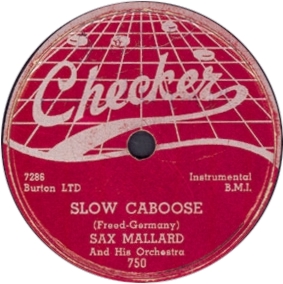
The very first session (by Sax Mallard) was held for release for more than a year, when two sides were used to open the new Checker subsidiary. Checker 750 was advertised in Cash Box on April 5, 1952 and reviewed in Billboard on April 26, 1952 (p. 27). Perhaps the tunes were held back because Mallard had followed the pattern of so many Aristocrat sessions, combining R&B jumps with lounge ballads. One of the released sides featured ballad singing by drummer Osie Johnson—so, apparently, did two further tracks that are still unreleased and probably lost. A blues-based instrumental like "Slow Caboose" held a lot more commercial promise in 1952.
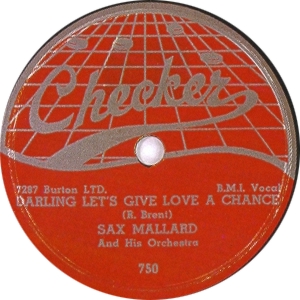
On release, "Slow Caboose" carried composer credits to Alan Freed, the influential Cleveland-based disk jockey, and to one Carl Germany. Although the Chess brothers did not engage in the wholesale production of bogus composing credits, as was standard operating procedure for some of their competitors, in 1952 they did toss writing credits in Freed's direction as an enticement to play their records. Just who Carl Germany was, and why it was important to toss him anything, is yet to be revealed. Such explanations as have been attempted are as bogus as the pseudonym itself. Yet it shows up on several more labels from 1951 and 1952.
A big gap in the U7000 series comes right after the Mallard session—no known sides between U7288 and U7299. Not counting the missing items (which could simply have been skipped in the master book) 94 new cuts were recorded for Chess during the year, nearly all at Universal Recording.
Apparently Calvin Bostick's first release was doing well enough to warrant a second session. In mid-January, Bostick and trio laid down four sides, two of which appeared on Chess 1451. Blessedly, the company now took a hiatus from studio gimmickry (no speeded up piano lines this time). The released sides were a relaxed blues, sung in a style influenced by Nat King Cole but not blatantly imitative, and a better than average lounge ballad. Bostick sang both in a smooth baritone. The gentility quotient was high, but the solid musicianship made Bostick's trio one of the very best plying its trade in Chicago during the period.
Next, the Chess brothers brought Muddy Waters and Jimmy Rogers back into the studio on January 23. This time, Muddy and band recorded a full session, followed by Jimmy Rogers with his own band for three sides. Then Rogers' pianist, Eddie Ware, got to do five more of his own. Clearly there was more money in the kitty.
Three of the the four sides laid down by Muddy (with Little Walter, harmonica, and Big Crawford, bass) were promptly released. "Long Distance Call" and "Too Young to Know" were out on Chess 1452 in March. Leonard and Phil took out an ad for 1452 in Cash Box on March 10 (p. 18) and another on March 24, 1952 (p. 37). Conspicuously mentioned in both cases were bigger revenue generators: Chess 1455 by Al Hibbler and, as of March 24, Chess 1458 by Jackie Brenston.
On "Honey Bee," Little Walter played second guitar, as he had previously done on the Parkway session. The Chess brothers were already talking up "Honey Bee" to Cash Box in mid-June (June 16, 1951, p. 7); 1468 was appended to a display ad for Chess 1465 (by Lou Sargent), 1464 by Gene Ammons, and (still going!) 1458 by Jackie Brenston in the same issue (p. 15).
A fourth side was of comparable quality. But after the Chess brothers added a certain Memphis-based performer to their roster later in the year, promoting someone else's number titled "Howlin' Wolf" wouldn't have made for the best marketing strategy. Muddy's "Howlin' Wolf" had to wait 20 years, well into the era of reissue LPs.
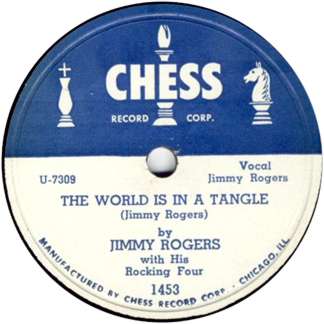
Jimmy Rogers used Ernest Cotton, tenor sax, and Eddie Ware, piano, along with Crawford for his three sides. They were joined by Muddy's regular drummer, Elga Edmonds (still not recording on Muddy's own tracks). It seems odd that Rogers would use a different tenor saxophonist from Eddie Ware, when all of the sides were done in succession, but discographies usually credit Ernest Cotton, a veteran of who also worked with Sunnyland Slim. And the sax work does sound like Cotton's.
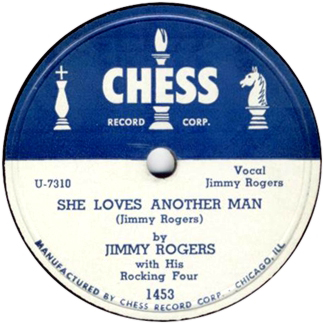
Chess 1453, "She Loves Another Man" and "The World Is in a Tangle," was out in February, ahead of its session mates. Cash Box advertised it on February 24, 1951 (p. 15), putting "Tangle" next to the thematically related "Korea Blues" by J. B. Lenoir. Another ad for 1453 ran on March 10 (p. 18). But Chess 1452 soon eclipsed it in sales.
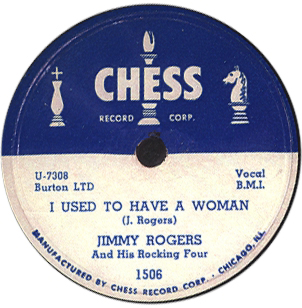
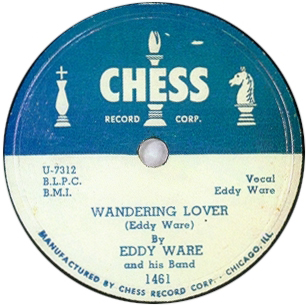
Finally, Eddie Ware made five cuts of his own, three of which were released. Former Miracle and Premium headliner Eddie Chamblee played tenor sax on these cuts. Chamblee was responsible for the vocal on "Lima Beans." This may have been incorrectly credited out of fear of unexpired contractual obligations. We're not sure whether Chamblee was under contract to Premium, which was still in business when the session was cut, or to Decca/Coral, where he may have been in May 1951, when the record was released. Little Walter, who'd stuck around from Muddy's session, ended up playing second guitar on some of the numbers.
Chess 1561 would also appear on 45 rpm, making it the company's oldest single recorded in Chicago to appear in that format in the first half of the 1950s. But this would not happen until 1954, judging from the different type font, and the placement of "Record" and "Corp." in the company logo.
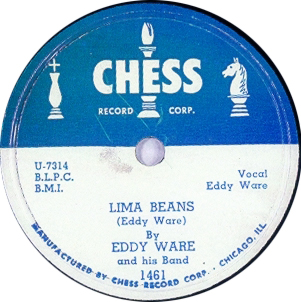
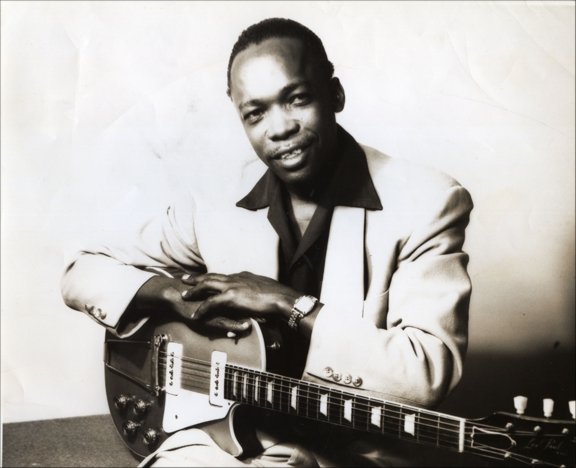
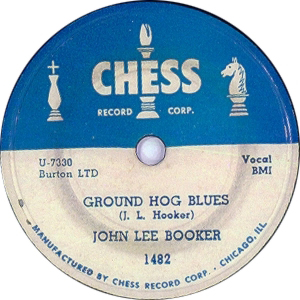
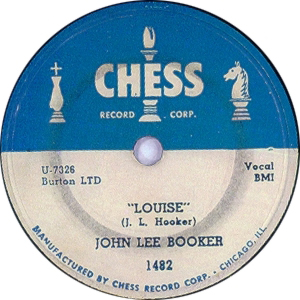
After testing the water with two sides that they bought from Joe Von Battle (see below, under purchased sessions), the Chess brothers decided to bring John Lee Hooker to Chicago for their own session at Universal. The session of April 26 was previously said (for instance, in Michel Ruppli's Chess Discography)to have been done in Detroit and sold to Chess, but later research (by Dave Sax and others) indicates otherwise. The outing was highly productive, leading to three singles on Chess. Because Hooker was still under contract to Bernie Besman in Detroit, the pseudonym "John Lee Booker" was applied, fooling precisely no one. The company didn't even bother to carry the "Booker" handle over to the composer credits...
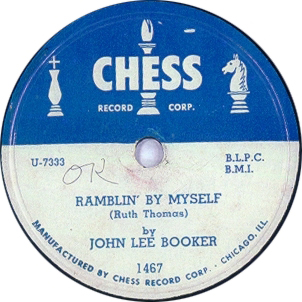
On May 3, Chess got a final opportunity to record Gene Ammons and his combo. This time Jug's tenor sax was accompanied by his regular rhythm section: Junior Mance (piano), Gene Wright (bass), and Teddy Stewart (drums). Two sides from May 3 were promptly released (in mid-June) on Chess 1464. The other two would gather dust until the company put them on an LP. (See below for two sides by Gene's old front-line partner Sonny Stitt, which have been incorrectly associated with this session; they were recorded around the same time, but by Premium rather than Chess.)
Considering Ammons' importance to the company (he and Muddy Waters kept Chess in business in 1950) and his continuing commercial potential (the company was in a hurry to put his music on LP once it adopted that medium), we are not sure why and how he fell off the roster. Ammons may have had some lingering obligation to Prestige, but that presumably expired after his November 1951 session with that label. During 1952 and 1953, he recorded in New York for Decca, then in Chicago for United. Could Leonard Chess have made a bid that was topped by Lew Simpkins and Leonard Allen, or had his interest in Ammons simply diminished? In November 1954, Ammons resumed recording for Prestige, remaining under long-term contract to the company for the rest of his life. The Chess brothers would learn the hard way about the long-term contract: in 1961 and 1962 they made a couple of quickie Ammons LPs for their Argo subsidiary, only to be compelled to hand over the masters, along with monetary damages, after Prestige sued them.
U7339 and U7340 by tenor saxophonist Robert Caffery and his combo were recorded in New Orleans, some time later in May; just to confuse matters, two of the same matrix numbers has already been used on the last Gene Ammons session. The Caffery release, on Chess 1470, is among the least common from this period.
The next session in Chicago featured a singer named Lou Blackwell. Leonard and Phil already knew him, because he'd cut for Aristocrat in August 1949. But Aristocrat never released anything on him. The rest of the lineup on Blackwell's 1951 sesion remains unknown, as the sides have also never been released. The Chess brothers could have found Blackwell's suave baritone too uptown for their tastes. Blackwell would turn in some respectable stand-up blues singing with Tab Smith's combo, on an October 1951 session for United, but he had no better luck getting those sides released. His fourth and last session, for Chance in November or December 1952, finally produced a single, Chance 1130. Art Sheridan may have intended it for his new pop series but it was released in the label's blues and R&B series.
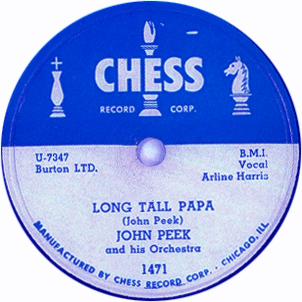
In June, John Peek and his band made their only session for the company. The single that was released, Chess 1471, featured the vocals of Erline Harris. The itinerant singer had been active on the recording scene for a couple of years. She made her debut with "Rock and Roll Blues," recorded in New York City for DeLuxe in April 1949. She next surfaced in New Orleans, recording with Plas and Ray Johnson's combo in July of that year. She'd probably cut the session for DeLuxe, which was controlled by King, but after Dave and Jules Braun left DeLuxe she ended up getting a single on their new Regal label in September 1949. In April 1950 she cut four sides for DeLuxe in Cincinnati, with backing from a band led by jazz saxophonist Joe Thomas. This netted her a single on DeLuxe 3305 (reviewed in Cash Box on September 2, 1950, p. 13). When she joined the Chess roster, Harris had been featured in Chicago clubs for more than a year; during a run at Ralph's Club (2159 West Madison) from April through June 1950 she was duly billed as "Erline (Rockin and Rollin) Harris."
At Ralph's Harris had been accompanied by tenor saxophonist Epp James and his band. Who Peek was and why he was selected for this record date instead of James, or one of the company's house tenor saxoponists, we don't really know. We also don't know why the session for Chess was her last.
The Chess brothers never could figure out how to spell the singer's first name. When Billboard (July 14, 1951, p. 14) announced the signing of the "ex-Deluxe thrush," her name was spelled "Arlene." An ad for Chess 1471 and 1472 in the same issue spelled it "Arline" (p. 65). A display ad inCash Box (July 21, 1951, p. 32), spelled it "Eirlin." But when Cash Box reviewed the record (July 28, 1951, p. 13), it called her "Arline."
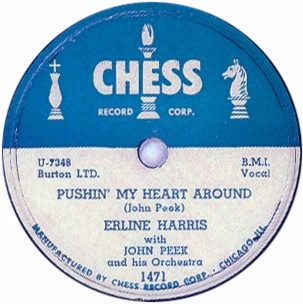
In June, the company moved from 4858 South Cottage Grove to 750 East 49th Street, which would be its home for nearly three years. Leonard and Phil Chess announced to Cash Box (June 30, 1951, "Chess Records Moves to Larger Quarters,", p. 18) that a higher volume of business required more space.
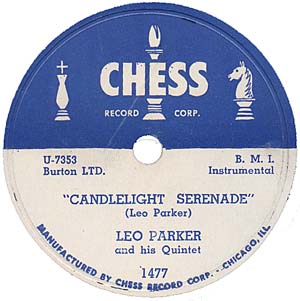
July would prove to be a busy month in the studio. First Chess welcomed baritone saxophonist Leo Parker to Universal Recording. Billboard announced the session on July 14, along with Erline Harris's (p. 14).
Leo Parker (born on April 18, 1925 in Washington DC) was the first musician to play bop on the baritone sax. Though a decade younger, he was also a major influence on Chicago's own Mac Easton. Leo Parker first attracted attention as a member of Billy Eckstine's band in 1944. He acquired the nickname the "Mad Lad" after a number he recorded with Sir Charles Thompson. He made three sessions under his own name for Savoy in Detroit (1947-1948), then cut in New York for Prestige and Gotham in 1950. In 1951 he accompanied vocalist Ray Snead on a session for Mercury.
By this time Leo Parker had become as big a name on the R&B scene as in the jazz world; he had also acquired a drug habit, and a corresponding reputation for unreliability. Parker was accompanied by a group of Chicago-based musicians: Eddie Johnson on tenor sax, Claude Jones at the piano (with an auxiliary doodad called the Lowrey Organo), Johnny Pate on bass, and Al Williams on the drum stool. Except for Williams, all had previously been at the Eddie South session recorded by Al Benson back in March (see below) and subsequently purchased by the company.
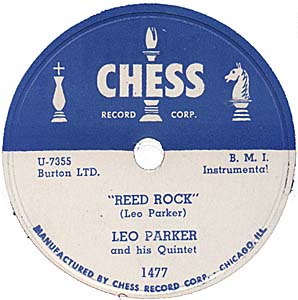
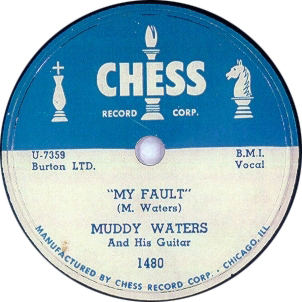
Next Leonard Chess brought Muddy Waters in for a powerhouse session on July 11. The four tunes laid down that day are instantly recognizable from the heavy tread of the bass drum, played by Leonard Chess himself. Elga Edmonds had finally been asked to appear with Muddy, but he wasn't getting the backbeat that Chess wanted. So Chess chased Edmonds off and applied himself to the foot pedal. We doubt that he advertised his presence on the records to Local 208…
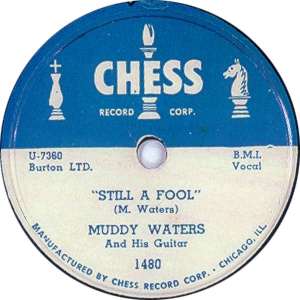
"My Own Fault" and "Still a Fool" appeared on Chess 1480, in September. A Cash Box ad on September 15, 1951 (p. 15) mentioned 1480 in smaller print under 1477 by Leo Parker and 1479 by Howlin' Wolf. The Chess brothers were so fixated on "Moanin' at Midnight" that they put Muddy's title down as "Still a Wolf." The September 22 ad (p. 21) also threw in the latest Jackie Brenston (Chess 1469)—and corrected the title on 1480.
Within a year, the other two sides were on Chess 1490 and Chess 1509 (1509 being the first Muddy Waters item to garner a release on 45 rpm).
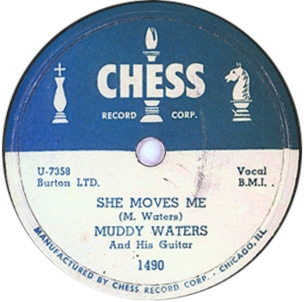

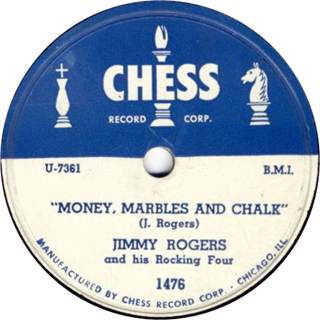
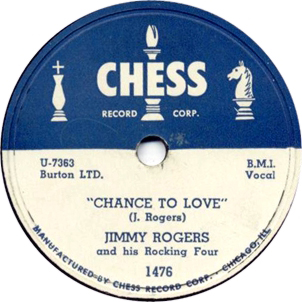
The Felix Gross tracks were reportedly recorded in Los Angeles (Gross, a pianist and bandleader, had previously recorded for Exclusive and for Down Beat / Swing Time in LA; he'd been with Regent in 1950). We used to think these were purchased from some outfit in LA, because we didn't know of the Chess brothers were recording anything in California at this early date. Billboard announced on January 20, 1951 (p. 14). well before the apparent session date for his first Chess single, that "Chess label has inked Felix Gross, ex-Down Beat blues warbler." This could mean either that Chess had bought his sides or that Chess had recorded him; such ambiguous language was quite common during the period. Meanwhile, Gross's second session for for Chess may have originated in Dallas.
On August 4, the company tried one last time with Claude McLin and his combo. This time the band laid down four jazz originals; no violins added, no pop hits covered. Unfortunately from the company's perspective, the tenor saxophonist moved his family to Los Angeles early in 1952, before anything had been released from the session. Now that he was off the Chicago scene, the Chess brothers apparently concluded that McLin's sides would not get the sales push they needed. Two were finally released on an LP in 1972; the other two still repose in the vaults. McLin did get a few further opportunities to record, all in Southern California.
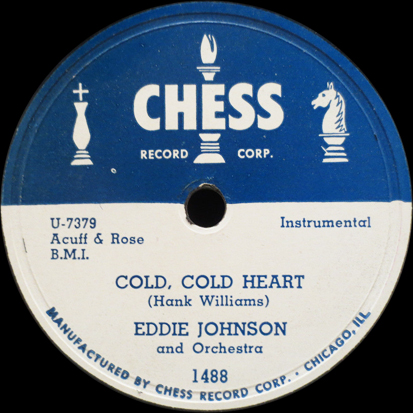
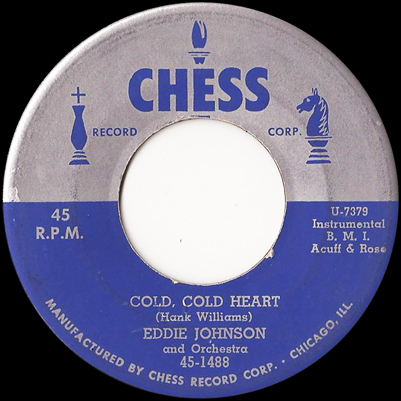
Besides, the brothers had found a new jazz tenor saxophonist who they believed had major jukebox potential. Eddie Johnson had been on the Chicago scene since the late 1930s, and Leonard and Phil had surely crossed paths with him at some point during the previous decade. But the brothers' attention was apparently piqued by the March 1951 Eddie South session (see below), which they'd acquired from Al Benson, and his contributions to Leo Parker's session from July. In October 1951, they gave Johnson and his combo another hit song to work with (in this case, "Cold Cold Heart" by Hank Williams); Chess 1488 was rushed into release (78 and 45 rpm formats) and given a strong advertising push, including a mention of Leonard's new and improved sewer-pipe method. (See the company's ads in Billboard, November 3, 1951, p. 42, and in Cash Box for November 17, 1951, p. 20, and November 24, p. 20). The Ellingtonian "Walk Softly," on the flip side, is what jazz fans today would notice. Interestingly, the November 17 ad made "Walk Softly" the plug side.
Chess 1488 didn't quite meet the elevated sales targets that such activity implied, but the brothers persevered with Johnson, who would be their standard-bearer on tenor sax for the next year or so.
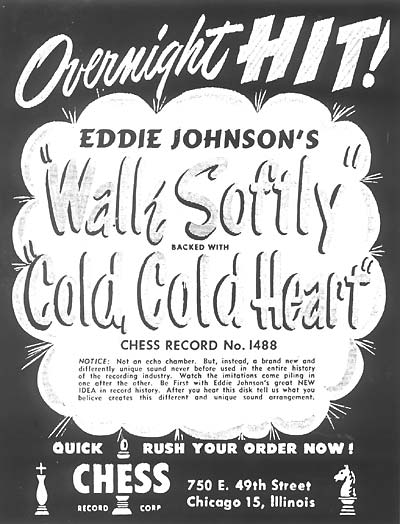
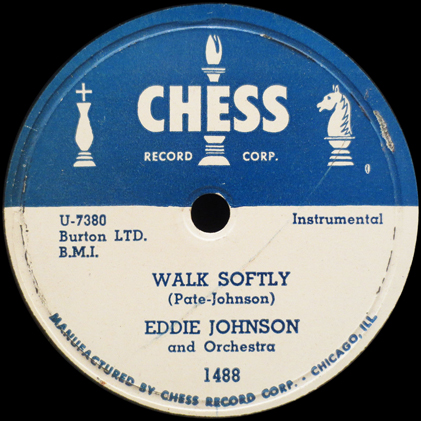
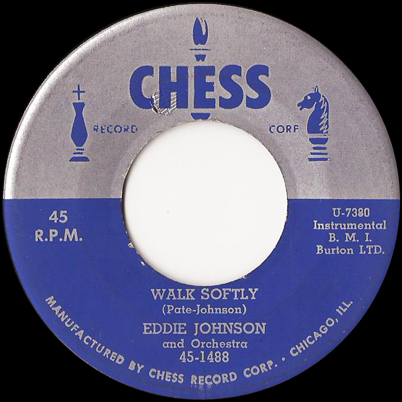
Also in October, Chess invited Eddie Boyd in for a session with his working trio (piano, guitar, and bass). Boyd had a feeling the company was more interested in obtaining songs for its established blues artists than in adding him to the roster, even though he had been on the Chicago scene since the early 1940s and had recorded several sessions as a leader, starting with RCA Victor in 1947.
Boyd was fully justified in his suspicions: there was no effort to release anything from the session. But after his second session for JOB in May 1952 produced a massive hit in "Five Long Years," the Chess brothers rethought their decision. However, the fact that "Five Long Years" as released used a larger combo with tenor sax (the sax was actually overdubbed) and drums discouraged any delayed releases from the October 1951 outing. The sides had to sit until the 1970s reissue programs kicked in.
Cbess also returned to studio recordings of gospel music, as a group generically referred to as Gospel Singers laid down six sides. We can say nothing further, as none have ever been released.
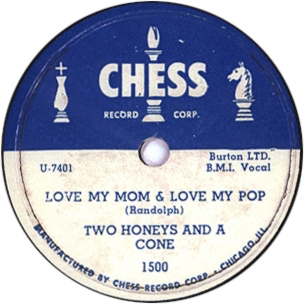
Later in October (well, maybe it was November), the Chess brothers waxed four tracks by a vocal group called Two Honeys and a Cone. Even though the brothers were investing more in 45s, Chess 1500 was among those picked for release in the format, and the company tried to give the single a push in Cash Box, the response to the single obviously did not encourage further explorations of this particular market. The composer credits to "Randolph" point to trumpeter and bandleader Zilner T. Randolph (1899-1994). Sure enough, a brief Chicago item in the March 1, 1952 issue of Billboard declared that "Elaine [Randolph], daughter of cleffer [Zilner Randolph], debuts on the new Chess Records release, "Twenty Robbers," singing as a member of Two Honeys and a Cone group and soloing" (p. 40). The writer unfortunately garbled their names into "Elaine Zilner" and "Randolph Zilner." Cash Box rendered Zilner as "Zelner," but otherwise did much better, giving the family band a featurette ("'Old Man Mose' Randolph's 3 Kids Click for Chess," March 1, 1952, p. 17). Although the story did not mention the group's previous release, it did state that "the kids have been a trio for over four years now professionally." According to Zilner Randolph, he had been rehearsing a vocal group at his house, which was struggling mightily with a piece he had written for them—but then he heard Genie, Hattie, and Lucious, who had been observing the rehearsals, performing the entire thing "with a remarkable swinging beat."
Around the beginning of 1949, Two Honeys and a Cone had cut a (very low circulation) single for Zilner Randolph's own Blue House label. Blue House 1 consists of "So Worried," with a lead vocal by Hattie Randolph and a trumpet solo by Lucious Randolph, who was 13 or 14, and "Blue Be Bop," with a lead by Regina "Genie" Randolph, who was all of 10 years old at the time. Accompaniment was by Zilner Randolph on piano, Ike Perkins on guitar, and Ransom Knowling on bass.
Zilner Randolph had seven children, all of whom received thorough musical training—none of that "Every Good Boy Does Fine" stuff—so the family band underwent some turnover. By 1952, Hattie Randolph was already performing on her own, but an ad that Chess took out in Cash Box identifies the trio as "Jeanie," Hattie, and Lucius, the same as on the Blue House. "Twenty Robbers" is a pure big band vocal number; "Love My Mom" ranges into R&B. Zilner played piano (he takes a very short solo on "Love"), while several uncredited buddies filled out the ensemble on trumpet, trombone, alto sax, tenor sax, baritone sax, bass, and drums.
Lucious Randolph later recorded with Sun Ra's Arkestra and did occasional session work, not to mention a tour or two with Jerry Butler. Hattie Randolph went on to record a single for Drexel (one side was composed by her father); she sang on two sessions with Sun Ra, producing a latter-day jazz classic with "'Round Midnight." Regina Randolph became a schoolteacher and later went into acting.
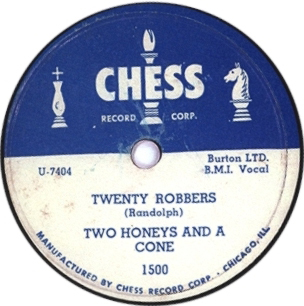
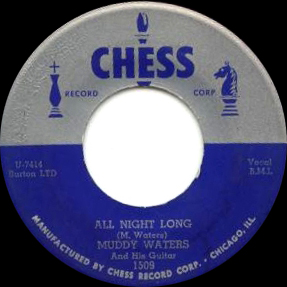
The final session of the year took place on December 29. The main attraction was Muddy Waters. Despite the session's high productivity, however, just one of Muddy's sides was released—a stark, eerie rendition of "All Night Long" that put Leonard Chess's new and improved sewer-pipe reverb to good use. Two other takes of the same piece survive, noticeably different in ambience from the issued version. Nothing else from the session seemed to interest the company, not even a masterpiece on the order of "They Call Me Muddy Waters." The neglected tracks would prove a treasure trove for reissuers, starting in the early 1970s.
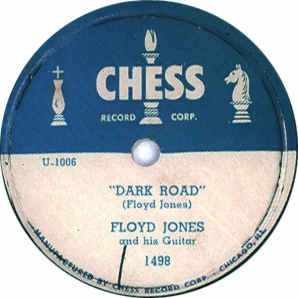
The December 29 session included no follow-on for Jimmy Rogers; instead the Chess brothers brought in Floyd Jones to make another four numbers with most of the band. This was a bit of a reunion, as Floyd Jones, Little Walter, and Jimmy Rogers had all worked on the Tempo-Tone sessions back in May 1949. We will take the word of the discographers who put one Willie Coven on the drums here; the drummer doesn't sound like Elga Edmonds, who was definitely on Muddy's sides.
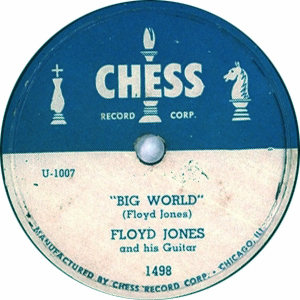
Despite the apparent lack of continuity, F1006 and F1007, versions of "Dark Road" and "Big World" by Floyd Jones, were cut at the same session as U7417 and U7418, "Playhouse" and "Overseas." Some misdirection may been have been involved in the decision to put these two items in a series previously reserved for material recorded elsewhere. In fact, as Dave Sax and the late George Paulus have shown, Chess actually put out two versions of its first Floyd Jones single. Jones had done "Dark Road" and "Big World" on March 22, 1951 with a Sunnyland Slim unit, results duly released on JOB 1001. The ensuing single was JOB's best seller up to that time. Some copies of Chess 1498 are straight reissues of JOB 1001. Others, however—and these are more common—feature the remakes from December 29, 1951. The remakes, done with Muddy Waters' band, were as stark and eerie as their session-mate "All Night Long." Highly esteemed by blues fans today, they probably outsold the JOBs on the strength of superior distribution. Chess's decision to put out a second version of 1498 killed any prospect of cooperation with Joe Brown until 1958. Meanwhile Floyd Jones' "Playhouse" and "Overseas," which were nearly as good as the two that were released, stayed in the vaults until the early 1970s.
| Matrix | Artist | Title | Release Number | Recording Date | Release Date |
| U7284 | Sax Mallard and His Orchestra | Turn Me Loose | unissued | January 8, 1951 | |
| U7285 | Sax Mallard and His Orchestra | Angels Sing | unissued | January 8, 1951 | |
| 7286 | Sax Mallard and His Orchestra | Slow Caboose | Checker 750 | January 8, 1951 | April 1952 |
| 7287 | Sax Mallard and His Orchestra | Darling, Let's Give Love a Chance | Checker 750 | January 8, 1951 | April 1952 |
| U7288 | through | U7299 | Unused | Matrix | Numbers |
| U-7300 | Calvin Bostick and His Trio | Vocal Calvin Bostick | I'm in Love with You (And I Hope That You'r [sic] in Love with Me) | Chess 1451 | mid-January 1951 | March 1951 |
| U-7301 | Calvin Bostick and His Trio | Vocal Calvin Bostick | Fleetwood Blues | Chess 1451 | mid-January 1951 | March 1951 |
| U7302 | Calvin Bostick and His Trio | You Do Something | unissued | mid-January 1951 | |
| U7303 | Calvin Bostick and His Trio | unidentified title | unissued | mid-January 1951 | |
| U-7304 | Muddy Waters and his Guitar | Vocal Muddy Waters | Long Distance Call | Chess 1452 | January 23, 1951 | March 1951 |
| U-7305 | Muddy Waters and his Guitar | Vocal Muddy Waters | Too Young to Know | Chess 1452 | January 23, 1951 | March 1951 |
| U-7306 | Muddy Waters and his Guitar | Honey Bee | Chess 1468 | January 23, 1951 | June 1951 |
| U7307 | Muddy Waters | Howlin' Wolf | (Chess LP 1553) | January 23, 1951 | |
| U-7308 | Jimmy Rogers and His Rocking Four | I Used to Have a Woman | Chess 1506 | January 23, 1951 | April 1952 |
| U-7309 | Jimmy Rogers with His Rocking Four | Vocal Jimmy Rogers | The World Is in a Tangle | Chess 1453 | January 23, 1951 | February 1951 |
| U-7310 | Jimmy Rogers with His Rocking Four | Vocal Jimmy Rogers | She Loves Another Man | Chess 1453 | January 23, 1951 | February 1951 |
| U-7311 | Eddie Ware and His Band | Give Love Another Chance | Chess 1507 | January 23, 1951 | April 1952 |
| U-7312 | Eddy Ware and his Band | Wandering Lover | Chess 1461 | January 23, 1951 | May 1951 |
| U7313 | Eddie Ware and His Band | I Found Out | (P-Vine Special [J] PLP-6022) | January 23, 1951 | |
| U-7314 | Eddy Ware and his Band [vocal really by Eddie Chamblee] |
Lima Beans | Chess 1461 | January 23, 1951 | May 1951 |
| U7315 | Eddie Ware and His Band | Rumba Dust | (P-Vine Special [J] PLP-6022) | January 23, 1951 | |
| U7316 | and | U7317 | See | Purchased | Material |
| U7318 | through | U7323 | See | Purchased | Material |
| U7324 | and | U7325 | See | Purchased | Material |
| U-7326 E1-QB-14488-1A |
John Lee Booker | Louise | Chess 1482 [Modern 852] |
April 26, 1951 | December 1951 |
| U-7327 | John Lee Hooker | High Priced Woman | Chess 1505 [78 and 45 rpm] |
April 26, 1951 | April 1952 |
| U-7328 | John Lee Hooker | Union Station Blues | Chess 1505 [78 and 45 rpm] |
April 26, 1951 | April 1952 |
| U-7329 | John Lee Hooker | unidentified title | unissued | April 26, 1951 | |
| U-7330 E1-QB-14489-1 |
John Lee Booker | Ground Hog Blues | Chess 1482 [Modern 852] |
April 26, 1951 | December 1951 |
| U-7331 | John Lee Booker | Leave My Wife Alone | Chess 1467 | April 26, 1951 | July 1951 |
| U7332? | John Lee Hooker | Just Me and My Telephone | (Chess LP1454) | April 26, 1951 | |
| U-7333 | John Lee Booker | Ramblin' by Myself | Chess 1467 | April 26, 1951 | July 1951 |
| U7334? | John Lee Hooker | Dreamin' Blues | (Chess LP1454) | April 26, 1951 | |
| U7335 | and | U7336 | See | Purchased | Material |
| U-7337 | Gene Ammons Orchestra | Baby Wont You Please Say Yes [sic] | Chess 1464 | May 3, 1951 | June 1951 |
| U-7338 | Gene Ammons Orchestra | Happiness Is Just a Thing Called Joe | Chess 1464 | May 3, 1951 | June 1951 |
| U7339 | Gene Ammons | It's You or No One | (Chess LP 1442) | May 3, 1951 | |
| U7340 | Gene Ammons | You're Not That Kind of a Girl | (Chess LP 1445) | May 3, 1951 | |
| U7339 [sic] | Robert Caffery | Ida Bee | Chess 1470 | May 1951 [New Orleans] |
July 1951 |
| U7340 [sic] | Robert Caffery | Blodie's Blues | Chess 1470 | May 1951 [New Orleans] |
July 1951 |
| U7341 | L. E. Blackwell | Soliloquy | unissued | May or June 1951 | |
| U7342 | L. E. Blackwell | Blues | unissued | May or June 1951 | |
| U7343 | L. E. Blackwell | Crazy Rhythm | unissued | May or June 1951 | |
| U7344 | L. E. Blackwell | The Masquerade Is Over | unissued | May or June 1951 | |
| U7345 | John Peek and his Orchestra with Erline Harris | I Have No Right | unissued | June 19, 1951 | |
| U7346 | John Peek and his Orchestra | unidentified title | unissued | June 19, 1951 | |
| U-7347 | John Peek and his Orchestra (vocal: Arline [sic] Harris) | Long Tall Papa | Chess 1471 | June 19, 1951 | July 1951 |
| U-7348 | Erline Harris with John Peek and his Orchestra | Pushin' My Heart Around | Chess 1471 | June 19, 1951 | July 1951 |
| U7349 | and | U7350 | See | Purchased | Material |
| U7351 | and | U7352 | See | Purchased | Material |
| U-7353 | Leo Parker and his Quintet | Candlelight Serenade | Chess 1477 | July 7, 1951 | September 1951 |
| U7354 | Leo Parker | Hornet | (Chess CHV-413) | July 7, 1951 | |
| U-7355 | Leo Parker and his Quintet | Reed Rock | Chess 1477 | July 7, 1951 | September 1951 |
| U7356 | Leo Parker | Leo's Blues | (Chess CHV-413) | July 7, 1951 | |
| U-7357 | Muddy Waters and His Guitar | Country Boy | Chess 1509 | July 11, 1951 | April 1952 |
| U-7358 | Muddy Waters and His Guitar | She Moves Me | Chess 1490 | July 11, 1951 | December 1951 |
| U-7359 | Muddy Waters and His Guitar | My Fault | Chess 1480 | July 11, 1951 | September 1951 |
| U-7360 | Muddy Waters and His Guitar | Still a Fool | Chess 1480 | July 11, 1951 | September 1951 |
| U-7361 | Jimmy Rogers and his Rocking Four | Money, Marbles and Chalk | Chess 1476 | July 11, 1951 | August 1951 |
| U7362 | Jimmy Rogers | Hard Working Man | (Chess [Br] 6641174) | July 11, 1951 | |
| U-7363 | Jimmy Rogers and his Rocking Four | Chance to Love | Chess 1476 | July 11, 1951 | August 1951 |
| U7364 | Jimmy Rogers | My Little Machine | (Chess [Br] 6641174) | July 11, 1951 | |
| U-7365 | Felix Gross and his Orchestra | I Want You, I Need You | Chess 1474 | July 1951 [Los Angeles?] |
August 1951 |
| U-7366 | Felix Gross and his Orchestra | You Done Me Wrong | Chess 1474 | July 1951 [Los Angeles?] |
August 1951 |
| U7367 | Claude McLin | Swivel Hips | (Chess CHV-414) | August 7, 1951 | |
| U7368 | Claude McLin | Green Dolphin | unissued | August 7, 1951 | |
| U7369 | Claude McLin | Vanity | unissued | August 7, 1951 | |
| U7370 | Claude McLin | Never Mind | (Chess CHV-414) | August 7, 1951 | |
| U7371 | and | U7372 | See | Purchased | Material |
| U7373 | and | U7374 | See | Purchased | Material |
| U7375 | and | U7376 | See | Purchased | Material |
| U7377 | and | U7378 | See< | Purchased | Material |
| U-7379 | Eddie Johnson and Orchestra | Cold Cold Heart | Chess 1488 [78 and 45 rpm] |
October 1951 | November 1951 |
| U-7380 | Eddie Johnson and Orchestra | Walk Softly [78 and 45 rpm] |
Chess 1488 | October 1951 | November 1951 |
| U-7381 | Eddie Johnson and his Orchestra | Sister Murphy [78 and 45 rpm] |
Chess 1503 | October 1951 | April 1952 |
| U7382 | Eddie Johnson and His Orchestra | Sleep Again | unissued | October 1951 | |
| U7383 | Eddie Boyd | Picture in the Frame | (Chess [G] 6.24810AG) | October 1951 | |
| U7384 | Eddie Boyd | I Got the Blues | (Chess CHD2-9385) | October 1951 | |
| U7385 | Eddie Boyd | Got Lonesome Here | (Chess [G] 6.24810AG) | October 1951 | |
| U7386 | Eddie Boyd | I Began to Sing the Blues | (Chess CHD2-9385) | October 1951 | |
| U7387 | Gospel Singers | Ruler of the Land | unissued | November 1951 | |
| U7388 | Gospel Singers | Glorious Days | unissued | November 1951 | |
| U7389 | Gospel Singers | Always Tired | unissued | November 1951 | |
| U7390 | Gospel Singers | A Little While | unissued | November 1951 | |
| U7391 | Gospel Singers | Jubilee | unissued | November 1951 | |
| U7392 | Gospel Singers | Ain't Gonna Study War No More | unissued | November 1951 | |
| U7393 | and | U7394 | See | Purchased | Material |
| U7395 | and | U7396 | See | Purchased | Material |
| U7397 | and | U7398 | See | Purchased | Material |
| U7399 | and | U7400 | See | Purchased | Material |
| U-7401 | Two Honeys and a Cone | Love My Mom & Love My Pop | Chess 1500 [78 and 45 rpm] |
November-December 1951 | March 1952 |
| U7402 | Two Honeys and a Cone | Syrup Pitcher | unissued | November-December 1951 | |
| U7403 | Two Honeys and a Cone | Rain That Falls | unissued | November-December 1951 | |
| U-7404 | Two Honeys and a Cone | Twenty Robbers | Chess 1500 [78 and 45 rpm] |
November-December 1951 | March 1952 [78 and 45] |
| U7405 | through | U7412 | See | Purchased | Material |
| U7413 | Muddy Waters | They Call Me Muddy Waters | (Chess LP 1553) | December 29, 1951 | |
| U-7414 | Muddy Waters and His Guitar | All Night Long | Chess 1509 [78 and 45] |
December 29, 1951 | April 1952 |
| U7414 [alt. 1] | Muddy Waters | All Night Long | (Chess [Br] 6641047) | December 29, 1951 | |
| U7414 [alt. 2] | Muddy Waters | All Night Long | unissued | December 29, 1951 | |
| U7415 | Muddy Waters | Stuff You Gotta Watch | (Chess [Br] 6641174) | December 29, 1951 | |
| U7416 | Muddy Waters | Lonesome Day | (Chess [Br] 6641174) | December 29, 1951 | |
| U7417 | Floyd Jones | Overseas | (Chess [Br] 6641174) | December 29, 1951 | |
| U7418 | Floyd Jones | Playhouse | (Chess LP 411) | December 29, 1951 | |
| U-1006 (F1006 in vinyl) |
Floyd Jones and his Guitar | Dark Road | Chess 1498 [second version] |
December 29, 1951 | January 1952 |
| U-1007 (F1007 in vinyl) |
Floyd Jones and his Guitar | Big World | Chess 1498 [second version] |
December 29, 1951 | January 1952 |
There was also significant growth outside of Universal Recording; the Chess brothers were vastly accelerating their purchases.
Around the beginning of 1951, the Chess brothers bought 6 masters from the blues-oriented Chicago independent JOB, two of which had already been released in 1950 on (the second incarnation of) JOB 100. Joe Brown's label was a mom-and-pop operation that lacked distribution, which probably explained the sales. Another 2 sides were apparently leased to Chess.
Leonard Chess was no longer interested in recording Babyface Leroy Foster, the instigator of a famous Parkway session that Chess fervently wished hadn't happened. But at the price Joe Brown was asking, Chess was OK with reissued Babyface. Chess 1447 is a lot easier to find today than the original single, the second JOB 100.
An entire session by J. B. Lenoir ended up with the Chess brothers. Lenoir's Chess 1449 was advertised in Cash Box on February 24, 1951 (p. 15) and again on March 10 (p. 18); in both cases it was the newly acquired Al Hibbler single (Chess 1455) that got the most space.
The relationship with JOB did not last. In December 1951 Chess rerecorded two Floyd Jones numbers that had already been released on JOB, then leased and reissued on Chess 1498. There ended up being two versions of 1498, one consisting of the sides made for JOB on March 22, and one with the remakes made on December 29 (which are listed above). Clearly, if Chess was licensing the JOB sides, it wasn't supposed to be replacing them with remakes. The Chess 1498 imbroglio would end any kind of cooperative relationship between the companies for several years.

In February 1951, Leonard and Phil scored a major coup when they acquired all of singer Al Hibbler's masters from the defunct Sunrise label. Cash Box announced the purchase on February 24, 1951 (p. 9).
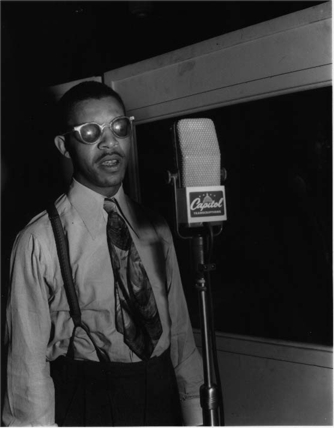
The impact of this deal on the Chess brothers' bottom line cannot be underestimated. We are not sure the company could have survived without it.
How the deal was struck we still don't know. At the time, Sunrise was broke, inactive, and probably still in the custody of its co-founder, Leonard Evans, who was based in New York City. Did the Chess brothers arrange something with Lee Egalnick of Miracle, whose company had distributed Sunrise releases and participated in a joint venture? Egalnick was still operating Premium in Chicago at the time, but he and Evans had quit working together in 1949. Another possibility is J. Mayo Williams, who was taking a hiatus from operating his Ebony label in Chicago but had had a close business relationship with Evans when the latter ran Ebony Distributors in New York. The distributor had been over since 1948, but Williams may have parted with Evans on better terms than Egalnick had.
Most entrepreneurs would not be anticipating big sales on a recording that was already 3 1/2 years old—and had already been a hit. Especially when the artist had kept right on recording for other labels, some with better distribution than Chess. In the end, the Chess brothers sold enough copies of Hibbler's "Trees" to finance a great many forays into jukebox jazz and down-home blues. They did even better with "What Will I Tell My Heart," and not too shabbily with "Solitude," despite a Johnny Hodges instrumental on the other side.
Chess probably had three Hibblers—1455, 1456, and 1457—on the shelves by the end of February. A big ad in Cash Box (March 17, 1951, p. 14) mentioned all three and asked distributors, "Give us a little time to fill your orders." The same issue of Cash Box proclaimed Chess 1455 a "clickeroo over nite" (p. 11).
All of this took place in such hurry that Chess forgot to put out a 1454. Maybe it was supposed to wait a while, but sales on the Hibblers were still roaring as the company picked up its next big thing, Chess 1458 by Jackie Brenston (which was advertised along the Hibblers a week later in Cash Box, March 24, 1951, p. 37).The Chess brothers also made their first purchase from Joe Von Battle's operation in Detroit (2 sides).
Disc jockey Al Benson, who had been the front man for the Old Swing-Master operation in 1949, was starting to do a little free-lance recording; he, too, sold a session to Chess (8 more sides).
A deal that permanently altered Chess's fortunes was entered into in March 1951, with Sam Phillips' Memphis Recording Service. Our estimate is that up to 36 sides were involved that year—after all these years historians are not entirely sure that Phillips was the source for certain masters. Phillips had begun operating his now-legendary studio in 1950; in the early going he recorded material for many independent labels, including 4 Star, Gilt-Edge, and Modern/RPM. For details, see John Boija's page on records that were done at the Sun studio from 1950 through 1952, at http://www.boija.com, and the coverage on earlier years at Memphis Recording Studio and Sun Recording Studio at the comprehensive www.706unionavenue.nl site).

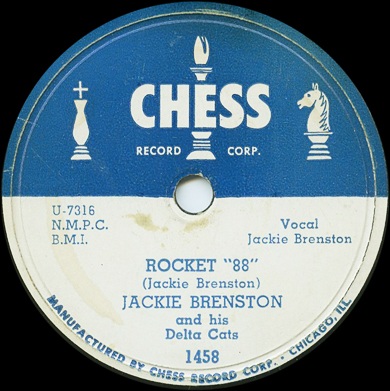
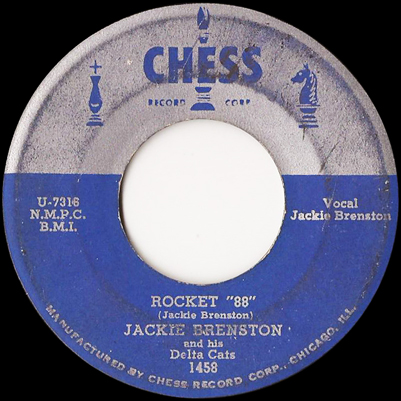
The first Phillips session that went to Chess was cut on March 5, 1951 by Izear Luster "Ike" Turner and his combo from Clarksdale, Mississippi. This consisted of Turner at the piano, Raymond Hill and Jackie Brenston, tenor saxes; Willie Kizart, electric guitar; and Willie Sims, drums. It led to a pair of releases, Chess 1458 and 1459. On 1459, the group was billed as Ike Turner and his Kings of Rhythm. There Turner did the singing, which was never his strong suit.
Chess 1458 was a whole nother matter. Cut after the two 1459 sides, it turned over the vocal chores to Jackie Brenston—reportedly because Sam Phillips insisted—and was opportunistically attributed to Jackie Brenston and his Delta Cats. "Come Back Where You Belong" tended to prove that Jackie Brenston wasn't that good at singing slow blues, on which he was given to yips and whines. But perfectly suited to his narrow skill set was a mutant boogie called "Rocket 88," which Kizart's loud and accidentally fuzz-toned guitar (legend has it that his amplifier either fell off the roof of the band's car, somewhere along Highway 61, or out of the trunk during a frantic tire change, inflicting irreversible damage on its speaker) pushes into rock and roll territory.
Nowadays "Rocket 88" is often billed as the first rock and roll record, but rock and roll was the product of a gradual evolution and there are earlier competitors for this notional honor. In 1951, no one thought to call it rock and roll, but it's fair to infer that a lot of record buyers sensed something different about it and liked it. The record was a big hit, appearing on "Hot in" lists for several months. In 1954 the company even gave it a belated release on 45 rpm, most likely to compete with Bill Haley's cover on Decca.
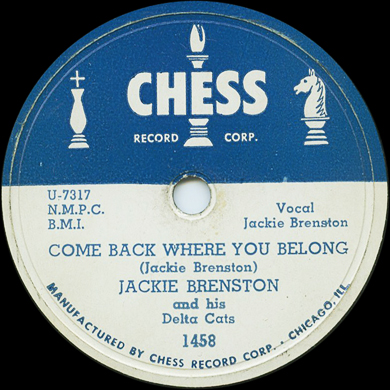
The release date for Chess 1458 has been given as April 1, 1951, but Leonard Chess had no intention of waiting that long. The "New!! Terrific!! Sensational!!" single was advertised in Cash Box on March 24 (p. 37), sandwiched between Al Hibbler's three singles at the top and Muddy Waters' newest at the bottom. A week later (March 31, p. 14), it rated an ad all to itself, with Chess now boasting it was "The Hottest Little Label in the Nation." Another solo ad ran in Cash Box on April 28 (p. 12). When Lou Sargent's Chess 1465 got its launch (Cash Box, May 26, 1951, p. 14), jukebox operators were invited to treat it as the natural successor to "Rocket 88." In July, Sam Phillips bought the rights to "Rocket 88" from Jackie Brenston for $910. Well, he thought he was buying the rights. Chess had already turned the composition over to Lawyer Burton, who sold it to Hill and Range. The first cover version, by Bill Haley, was recorded on June 14.
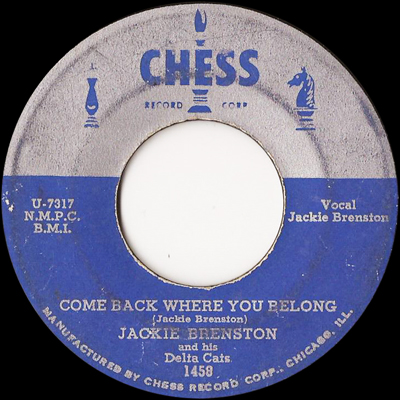
Chess 1465 by Lou Sargent is said to have been recorded in Memphis around May 1951, no day given. With a display ad for it already showing up in Cash Box on May 26, 1951 (p. 14), that had to be early in May. April is even possible.
Lou Sargent didn't know he would be going by that name until Chess 1465 was released. His real name was Luther McCallum Steinberg and he played the trumpet; he began working in Tuff Green's band while still in high school. Born in Memphis on October 24, 1929, Luther was the son of Milton Gus Steinberg, who had been a member of W. C. Handy's band. Milton Steinberg was born in Memphis on November 19, 1988; he played piano at such venues as Pee Wee's Saloon from 1910 until he retired in 1958. Milton Steinberg's father was a pawnbroker on Beale Street and his mother was African-American. Luther's sister Nan was a singer and his brothers Wilbur, Morris, and Lewie were muisicans. Milton Steinberg died in Memphis on December 10, 1964 (see https://www.findagrave.com/memorial/33650217/milton-gus-steinberg).
For this session at Memphis Recording Service "Lou Sargent" was the nominal bandleader of a group that otherwise consisted of Tot Randolph on tenor saxophone, an unidentified baritone saxophonist, Phineas Newborn Jr. at the piano, Wilbur Steinberg (aka Les Mitchell), bass and vocal, and Jeff Greyer at the drums. The featured player on the instrumental, "Ridin' the Boogie," is the pianist. "She Really Treats Me Wrong" is Wilbur's number, though Randolph gets a solo.
Luther Steinberg, who wanted audiences to know that his allegiance was to bebop and not to rock and roll, later left Memphis to work in Lionel Hampton's band. He was married for a time to Martha Jean Jones, who had radio shows in Memphis and later in Detroit. Luther Steinberg died in Memphis on December 24, 1999, of injuries sustained in a car accident (see his obituary at https://www.findagrave.com/memorial/32600379/luther-mccallum-steinberg). Wilbur Steinberg died in Memphis on February 15, 2004 (https://www.findagrave.com/memorial/17314069/wilbur-brock-steinberg).
Judging from this solitary Chess release, Luther Steinberg and band had more to contribute. Maybe the Steinbergs weren't interested, maybe Leonard Chess wasn't.
A little while later, possibly into June, Sam Phillips recorded three sides by a local singer named Rufus Thomas. "Crazy about You Baby" was another "Rocket 88" sequel, but the Chess brothers weren't in a hurry to release it and it was held till January 1952 when it showed up on one side of Chess 1492. "Night Workin' Blues" and "Why Did You Deegee?" came out in July 1951 on Chess 1466. 1466 is not an easy record to find today, but it must have done well enough to warrant a follow-up session for Thomas, which took place in October. The Chess brothers continued along their erratic path with composer credits. "Night Workin'," which was Thomas's signature number at the time, ended up attributed to one Marty Witzel, a friend of Leonard Chess. This wouldn't the last attribution to Witzel.
Although the guitarist and bassist remain unidentified, the band on this occasion included Billy Love at the piano, Herman Green on tenor saxophone, Richard Sanders on baritone, and Houston Stokes on drums.
With a hit still on the charts, Chess wanted more where that came from. Phillips tried on a couple of occasions to get something more out of Jackie Brenston. First, in May or June came "Independent Woman." Same tune as "Rocket 88," different lyrics, different riff from the saxes. Here the band consisted, once again, of Brenston (vocal and tenor sax), Raymond Hill (tenor sax), Ike Turner (piano), Willie Kizart (guitar), and Willie Sims (drums). Kizart was prominent on the side, but his amplifier had been fixed. The track would be used on Chess 1472, but nothing was made at the session that could serve as a flip.
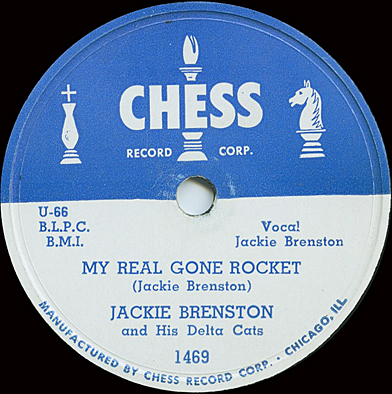
So Phillips tried again, most likely at the end of June. (There is surviving paperwork between Phillips and Brenston with the date of June 28, 1951). Probably the same ensemble plus a trumpeter and a string bass player returned to Phillips' studio in late June to make a sequel. "My Real Gone Rocket" is a pretty obvious continuation, more effective than "Independent Woman," but neither Turner nor Phillips still realized what they had wrought on March 5. With the string bass theoretically helping on the low end, Kizart's guitar becomes less prominent and the resulting performance, despite its raw energy, is more barrelhouse than rock and roll. The Chess brothers may have sensed this, and, besides, Brenston once again didn't record a flip for it. And it wouldn't have made sense to put "Real Gone" on one side and "Independent" on the other; they sounded too similar. Though slated for release on Chess 1469, "My Real Gone Rocket" didn't hit the stores till October, right after Brenston had done still another session.
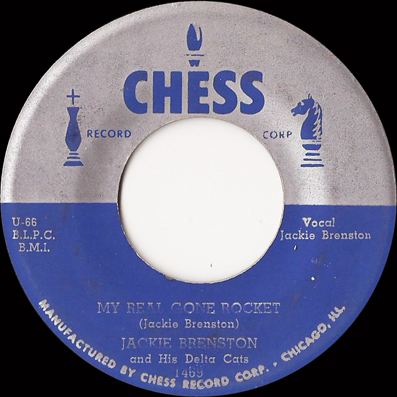
There was a change of plan and Chess 1472 was moved up: "Independent Woman" (and "Juiced") were being advertised in July (Billboard, July 14, 1951, p. 65;Cash Box, July 21, 1951, p. 32; Cash Box's review ran on July 28, p. 13). Ads trailed in Cash Box on August 4 (p. 14), August 11 (p. 18), August 25 (p. 16), and September 1 (p. 16), The switch explains why Chess 1472, but not 1469, was a 78-only release. In July 1951 the company was still holding out against 45s.
"Independent Woman" really was by Jackie Brenston. It was cut at Brenston's first follow-up session, again with Ike Turner's band, and sounded, well, like an outtake of "Rocket 88" with a different riff for the saxes and different lyrics. Meanwhile, "Juiced" was by someone else. Billy Love, a pianist, was born Milton Morse Love, Jr. He applied for his Social Security number in 1944. He had been on the Memphis scene for several years when Sam Phillips paid him $100 to record "Juiced." The 706unionavenue.nl site gives the session date as July 24, 1951. With ads for "Juiced" in print on July 14, this is plainly impossible; the session must have taken place closer in time to Jackie Brenston's second. For all we know, Phillips was setting it up the next day. In any event, it was Sam Phillips' idea to have Love pretend to be Jackie Brenston, so Love obligingly yelled out the soloists' names. Not that Brenston would have attempted Love's Roy Brown impression… (The $100 was charged against Brenston's royalties. It's not clear whether Phillips let Chess in on this bit of trickeration—he was in a good position to get away with it because Love was strictly a local performer in Memphis.) Besides Love's piano, the band consisted of Charles Walker on tenor sax, Calvin Newborn on guitar (responsible for a blazing solo), and Phineas Newborn Sr. on drums. Though Phillips signed Billy Love to a contract on July 31, 1951, later giving him a couple of chances to record under his own name, he remains one of the most obscure artists from this period.
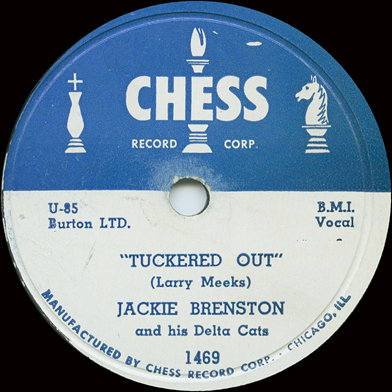
Jackie Brenston returned to the Phillips studio on September 20 (according to some sources; others have suggested an August date). He was now on his fourth session. By this time, Brenston had done some touring with Ike Turner's band—and fallen out with Turner as to whose band it was. Now he picked up the Newborn family band. It featured Memphis greats Phineas Newborn Jr. (piano), who had been on the "Lou Sargent" date, Calvin Newborn (electric guitar), and Phineas Newborn Sr. (drums). "Tuckered Out" is a credible performance, though Brenston didn't like it because it had originally been a Country number. The Chess brothers nonetheless found it a suitable pairing for "Real Gone" from the previous outing. It got a delayed release in October, still numbered Chess 1469 (Cash Box advertised it on October 6, p. 17, along with 1479 by Howlin' Wolf and 1480 by Muddy Waters). This was the first single Chess would release on 45 rpm.
Four other Brenston sides were never used during the original Chess label's lifetime and remain obscure today; they could have been done on September 20, or at another session around this time.
Chess emphatically not being an early adopter of the 7-inch 45, 1469 is highly significant, as the first release from the label to appear on 78 and 45 simultaneously. (Chess 1458 and 1461 would be reissued on 45 rpm, in 1954.) Chess did not return to the 7-inch format until Chess 1487 came out, would not pick up the frequency of 45-rpm releases till Chess 1499, and would not make 45 rpm releases on every title until Chess 1604— which came out in 1955.
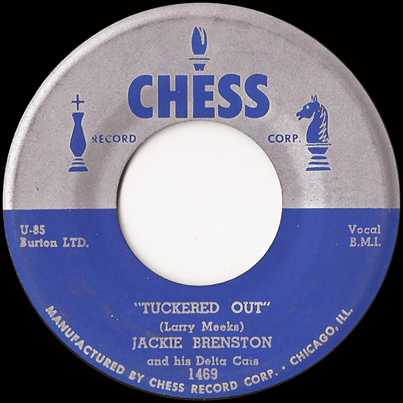
The deal with Sam Phillips was critical to the future of the label, and not just on account of "Rocket 88." It brought Howlin' Wolf to the Chess catalog for the first time. (Incidentally, he was nearly always referred to in New York Times style—as "The Howlin' Wolf"—on Chess labels from this era.) The exact date on his first sides is unclear.
The Wolf probably began recording for Phillips in May. On May 14, or maybe it was a string of dates that included May 14, the Wolf and his band kept working on two numbers: "Ridin' in the Moonlight" and "How Many More Years." Wolf used a trio: his harmonica, Willie Johnson's electric guitar, Willie Steele's drums. These were effectively rehearsal sessions, and nothing from them was released for years. But Phillips sent the masters to RPM and may also have sent them to Chess. The latter possibility has motivated adding these sessions to our discography. We have grouped together the five known takes of each tune, though the band almost certainly went back and forth between them.
In the end it was Chess that got something to release. Chess 1479, from a session or sessions most likely in July, was out by the end of August 1951, and advertised in Cash Box on September 15 and September 22. "How Many More Years" prominently features a pianist. It's never been entirely clear who he was. Ike Turner has often been credited, but Billy Love is more likely. Even though the band had been working on "Ridin' in the Moonlight," another version was not cut on this occasion, and Chess would never release the number (Ike Turner recorded it at radio station KWEM and it came out on ). "Moanin' at Midnight" had no piano on it, maybe because it was meant as a run-through by just the trio, one that ended up producing a master in one take.
Chess didn't yet have a real music publisher, just Lawyer Burton, and the Chess brothers ended up crediting one Carl Germany for two of Wolf's compositions. Germany is said to have been a DJ in Chicago and a promoter of dances in the Midwest. It would be nice to get confirmation. After Chess 1479 had risen up the R&B charts, at least one record store beclowned itself by advertising the single as a Carl Germany record.
Before Sam Phillips recorded The Wolf again, Ike Turner supervised two revenge sessions for the Bihari brothers, who insisted The Wolf was under contract to them. The first, in mid-September at KWEM, produced a strong performance of "Ridin' in the Moonlight," released on RPM 333 along with a pallid remake of "Moanin' at Midnight." The other two sides (one of them a powerful rendition of "How Many More Years") were not released for a decade. A second revenge session, on October 2, 1951 at the YMCA in West Memphis, produced two further singles for RPM.
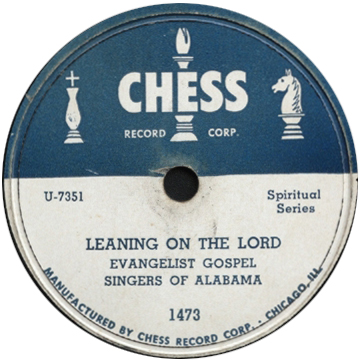
Particularly obscure are some gospel sides that seem to have been recorded in Memphis, but can't be proven to have originated from Sam Phillips' studio. Notations in the Chess files said they came from Phillips, and if they didn't, what other source could there have been? They've been included in Sun reissue packages.
The Evangelist Gospel Singers of Alabama recorded in May or June of 1951. "Leaning on the Lord" and "Lord Stop the War" (the latter clearly aimed at the conflict in Korea) were released in July on Chess 1473. With Willie McInstry singing lead, Leroy Terry playing piano and singing tenor, Willie Banks (baritone), and John Davis (bass), plus an unidentified fifth singer, this was a top-notch group, but Phillips and Chess showed no further interest.
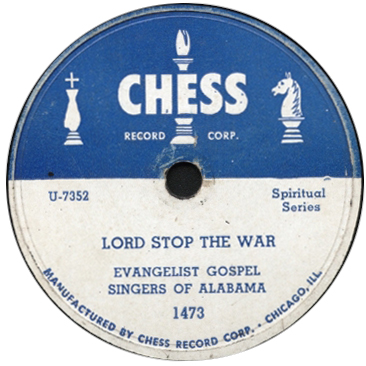
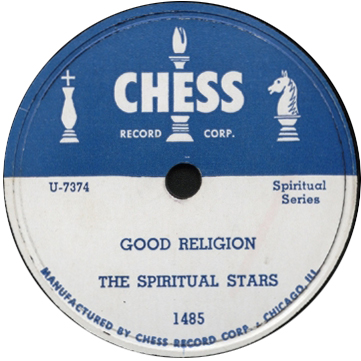
We at least know who four of the five Evangelist Singers were. The Spiritual Stars are still a question mark after all these years. They got one session, probably in July or August 1951, and one release on Chess 1485, probaby in December.
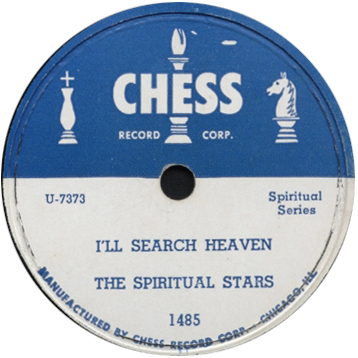
Harmonica Frank Floyd was one of the wilder musicians Sam Phillips recorded—totally Southern Country and totally Country Blues. He is the only white performer from the period to be considered a genuine country bluesman. Frank Floyd was born in Toccopola, Mississippi, then, as now, a rural village of around 200 people, on October 11, 1908. He decided on "Frank" as his first name after his parents separated, it is said, without giving him one. He taught himself how to play the harmonica at age 10 and later learned how to play guitar. His grandparents, who raised him, died when he was a teenager, and he became an itinerant performer in carnivals and medicine shows. Learning to play the harmonica out of one side of his mouth while singing out the other (or playing the harmonica out of his nose while singing) while playing the guitar made him a one-man band. He first appeared on radio in 1932, but he made no records until Sam Phillips recorded him (he was the first white musician to record for Phillips).
Chess tried two couplings from Floyd's session on July 15, 1951. Chess 1475-A (so numbered because 1475 was already taken) originally consisted of the mishap-laden harmonica hunt number "Swamp Root" and the blues "Goin' Away Walkin'." The Chess brothers were talking up "Swamp Root" as a "hillbilly" side in July (Cash Box, July 28, 1951, p. 7). The original coupling was being advertised in Cash Box on August 4, 1951 (p. 14). The ad noted that the Chess brothers had previewed the record at the NAMM convention in Chicago in mid-July (which implies overnight shipment on the master, if it was recorded on July 15). With a different coupling, "Swamp Root" b/w "Step It Up and Go," Chess 1475-A reappeared about a year later.
With 1475, the Chess brothers fell back into late-Aristocratic habits; they duplicated a release number. 1475 was near-simultaneously applied to a gospel record by the Four-A Melody Men (recorded in 1947, and excavated from unissued Aristocrat material) and to the release by Harmonica Frank Floyd. Otherwise, however, the Chess release series proceeded unbroken.
With the Brewsteraires, we at last find a gospel group that Sam Phillips recorded on a definite date, and definitely for Chess. The Reverend William Herbert Brewster was a Baptist minister, born in Somerville, Tennessee on July 2, 1897. He arrived in Memphis in the 1920s and in 1930 began serving as pastor of the East Trigg Avenue Baptist Church. He composed more than 200 songs, including "Move On Up a Little Higher" and Surely God Is Able." The Brewsteraires started in 1943 as the Mount Pisgah Gospel Singers, changing their name when the Rev. Brewster began mentoring them. By 1951, the Reverend had his own radio show on WHBQ and the group had recorded for Gotham. Among the listeners to his radio show were Elvis Presley (who also attended some services at East Trigg Avenue Baptist) and Sam Phillips.
The group that recorded on September 26, 1951 consisted of Solomon Ouston (lead tenor), Nathaniel Peck (tenor), Odell Rice (baritone), and Henry Reed (bass). The Reverend did not sing with the group but arranged a lot of their material. Chess accepted two sides for release on Chess 1502. The company did not show further interest in the group after discovering that the record brought only regional sales. Two further sides were made; since they were effectively made for Chess, we're including them here. One is probably now lost, but "More of Jesus" finally got a commercial issue in 2002, on a JSP Memphis Gospel CD.
After Chess, the Brewsteraires moved to Dot, which in its formative stage was interested in gospel. Although acetates survive from the days when the group did a show on WDIA, there was just one further commercial recording by the Brewsteraires, a single issued in 1972. The group broke up a little while later. The Reverend W. H. Brewster died in Memphis on October 14, 1987.
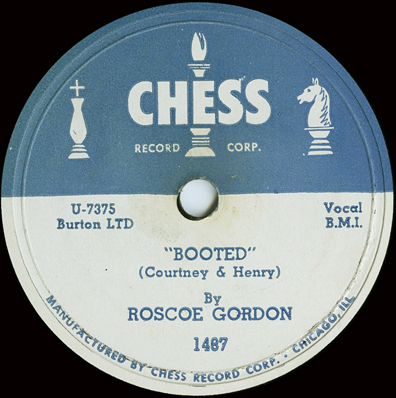
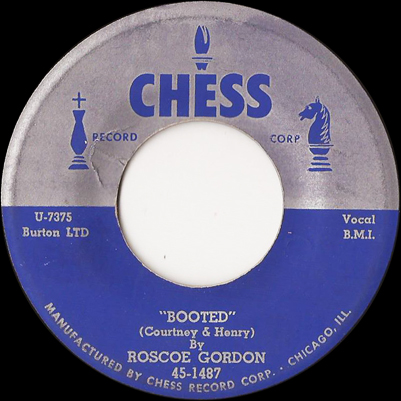
Toward the end of the year, the Chess brothers obtained a Rosco Gordon single from Sam Phillips. Gordon had first approached Phillips about recording in February 1951. Phillips brought him in for a session in July (which went to RPM) and a follow-up in August. The August session, like its predecessors, was recorded direct to disk, as Phillips had not yet invested in a tape machine. Gordon played piano and pretended (on "Booted") to be substantially drunker than he actually was. Willie Wilkes and Adolph Duncan were the tenor saxes (with Wilkes getting the solos), and John Murry Daley was the drummer. http://www.706unionavenue.nl/83574046 puts a string bass on the session, but none is audible. The piano is upfront and Gordon had a heavy left hand.
"Booted" was a sizable hit for Chess, which may explain its simultaneous (or near-simultaneous) issuance on 45 rpm.
The flip was a number by Bobby "Blue" Bland, then just getting his start. (Bland was the cousin of Gordon's regular chauffeur; he had recently driven Gordon to a gig in Arkansas and filled in ably when Gordon spent too long at a dice game in the back room.) Actually, it was sung as a duet between Bland and Gordon. In later days, Bland wasn't terribly fond of it. A fan once asked him to autograph a 78 of Chess 1487. The singer obliged—then put the record between his elbows, broke it, and handed back the halves.
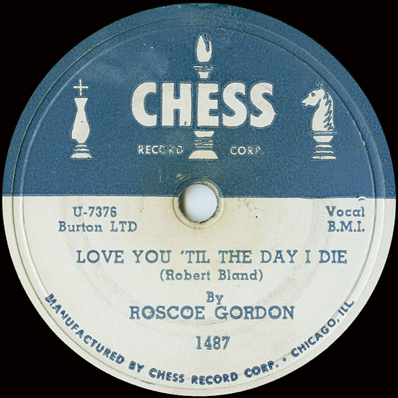
The release of "Booted" led to a big fight between Leonard Chess and the Bihari brothers. The Biharis claimed to have Gordon under contract to RPM, and had already obtained some masters on him. One of the Biharis' responses was to get Gordon to record another version of "Booted." Gordon recorded at Memphis Recording Service on December 3 and 4, 1951; meanwhile, Ike Turner had already gotten two sides out of Bobby Bland in November. Some have said Gordon's December 3 and 4 sessions were meant for Chess, and that RPM got the masters after the Chesses and and the Biharis settled. But there was no need for Chess to rerecord "Booted"; it seems like RPM was the intended recipient for everything by Gordon, though Chess did get two Bobby Bland sides from the outing. The quarrel was resolved, around the beginning of 1952, with Gordon going exclusively to RPM and Howlin' Wolf exclusively to Chess.
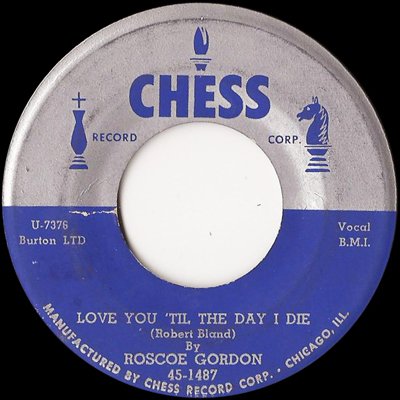
Rufus Thomas was back at Modern Recording Service at the end of September or the beginning of October 1951. He recorded "No More Dogging Around," which ended up on Chess 1492 in January 1952 (the coupling was "Crazy about You" from his previous session). Thomas was backed by Herman Green (tenor sax), Richard Sanders (baritone sax), Billy Love (piano), Houston Stokes (drums), and unidentified guitar and bass. The master of "No More Dogging" was mailed to Chess on October 5. Thomas also cut a "Christmas Song" which has never been released by anyone, but was noted on October 5 as already sent to Chess. The master is long lost.
L. J. Thomas was Lafayette Jerl Thomas, a blues guitarist from Shreveport, Louisiana. Hence the name given to his combo on the labels to Chess 1493. However, Thomas had relocated to Oakland, California, and was touring with Jimmy McCracklin in 1951. Very likely McCracklin's band had a gig in Memphis in October 1951 and Thomas took them into Sam Phillips' studio. As noted at http://www.706unionavenue.nl/83574046, the lineup of two saxes, piano, bass, and drums is the same as can be heard on a session cut in Houston, Texas, some months later. So Jimmy McCracklin, at least, can be penciled in at the piano. "Sam's Drag," a vigorous instrumental on which Thomas is less than perfect technically, and "Baby Take a Chance with Me" were released on Chess 1493 in January 1952.
Billy Love was back at the Memphis Recording Service in his own right on November 2, 1951 (see http://www.706unionavenue.nl/83574046 for the date). It appears he was again in the company of Charles Walker (tenor sax), Calvin Newborn (guitar), and Phineas Newborn Sr. (drums). Three sides resulted. "Drop Top" and "You're Gonna Cry" were selected by Chess for release on 1508, but it was delayed till April 1952, after Chess asked a second time for the master on "Drop Top." "Ain't No More" was never released on Chess and was widely thought to be lost until an acetate in the collection of Stephen LaVere was included in a Bear Family compilation—in 2013. Chess 1508 could have been a big record if the company had put anything behind it.
Isaiah "Doctor" Ross had been wanting to record with Sam Phillips for a while, but having to return to military service during the Korean War (he was in uniform from October 1950 till November 1951) delayed his first studio date, which finally took place on November 29. He cut 6 sides at Memphis Recording Service, some of which have survived in multiple takes. Chess immediately took "Country Clown" and "Doctor Ross Boogie," which were released on Chess 1504 in March 1952. The other tracks were never dealt to another company, so they are also listed here. Doctor Ross sang, played harmonica, and was also responsible for foot stomping; Wiley Gatlin (who sang on one number) played guitar, and Robert "Mook" Moore did his percussive thing with a broom.
Bobby Bland was back at Memphis Recording Service on December 4, 1951, with Rosco Gordon's band. Just the two sides featuring Bland were sold to Chess, which put them out on the obscure Chess 1489. The rest of the session (along with tracks cut the previous day) went to Rosco Gordon's regular employer, RPM. Bobby Bland had already cut two sides for RPM in November, at a session run by Ike Turner, but apparently the Biharis didn't sign him on that occasion. Supposedly the two Bland sides also showed up on Duke 106 (when the label was brand-new and based in Memphis; it's anyone's guess whether Chess 1489 or Duke 106 is rarer). Even if Chess had shown further interest in Bobby Bland, he wasn't available. Bland signed with Duke and remained with the label after it was taken over by Don Robey.
Bob Price was a down-the-line Country singer, the first to record for Sam Phillips. (Phillips and Chess had tried to promote Harmonica Frank as a "hillbilly" performer, but he was too amphibious for the category.) Price's real name was Price Twitty, and he was from Tishomingo, Mississippi. He had made one previous recording, for Decca in August 1949. Quinton Claunch, who would produce some Country sessions for Phillips in the future, brought Price to the studio while the singer was working a gig in Memphis. Claunch shared the composer credits for Price's two release sides. Four tunes were cut on December 2, 1951 (http://www.706unionavenue.nl/83574046). Behind Price's vocals were Quinton Claunch and Roy Cooper (guitars), Bob Smith (piano), Dexter Johnson (mandolin), Harold Buskirk (bass), and an unidentified fiddler.
Price's single on Chess 1495, in January 1952 (talked up in Cash Box, January 19, p. 9, and the subject of a display ad in the same issue, p. 11), was Chess's second foray into country, after the Guy Blakeman single from 1950. For the Price release, the company experimented with a red on white Chess label. Sales did not encourage a repetition. Two other numbers that Price cut at his session were effectively rejected (Phillips later recorded over nearly the entire master tape). Phillips would not get back into Country for a while, and, with one exception for a Tommy Trent single released on Checker later in 1952, Chess didn't try that market again until the fall of 1954.
Harmonica Frank was back in December for a follow-up session. "Howlin' Tomcat" (of which two takes survive) and "She's Done Moved" were just as good as his first offerings, but when they appeared the next month on Chess 1494 they didn't sell. A third side, "Christmas Time Again," was apparently also destined for Chess but is now lost.
Harmonica Frank moved out of the Chess orbit, but in a while Sam Phillips got his Sun label going. He released "Rockin Chair Daddy" b/w "The Great Medical Menagerist" in 1954. In 1958, Floyd cut a single with Larry Kennon on their jointly owned F&L label. That might have concluded his discography, but in 1972 Floyd was "rediscovered" and went on to make LPs for Adelphi and Barrelhouse. He was also featured in Greil Marcus' book Mystery Train. Frank Floyd died on August 7, 1984, in Blanchester, Ohio, at the age of 75.
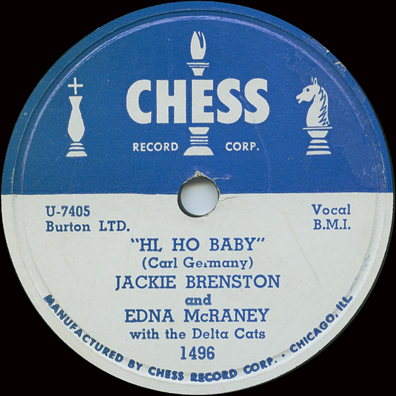
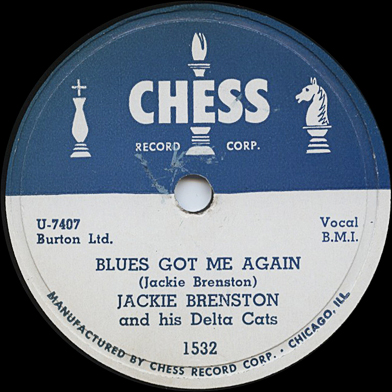
In mid-December, Chess sought to follow up, once again, on "Rocket 88" with another Jackie Brenston session. We had thought Brenston and crew came to Chicago for it, but we've learned that Sam Phillips put the session in his master book (http://www.706unionavenue.nl/83574046), so we've moved it here. Much was obviously expected, as the singer and baritone saxophonist laid down no fewer than 8 sides. Enough planning had gone into the session that Brenston, finally, wasn't generating one or two tracks at a time.
But just four were released, and the sales of Chess 1496 and 1532 must not have been up to expectations. Chess 1496 (78 and 45 rpm) was out promptly the next month (advertised in Cash Box on January 19, 1952) and has shown up in quite a few collections. Chess 1532 (78 only) would be Brenston's last release on the label, and is less often seen.
The full band personnel is not known, but two Memphis stalwarts were on hand: Phineas Newborn Jr. at the piano and his brother Calvin Newborn on electric guitar. Calvin is also credited as the composer on "Starvation," a solid jazz instrumental; did it get the title when the Chess brothers made an estimate of its sales potential? For that matter, one of the Newborns was credited with "Blues Got Me Again," "You Won't Be Coming Back" and "Eighty Eight Boogie," which showed up on an LP three decades later.
The band was rounded out with an alto sax, a tenor sax, bass, drums, and guest singer Edna McRaney (who appeared on "88 Boogie" and "Lovin' Time Blues" as well as "Hi, Ho Baby").
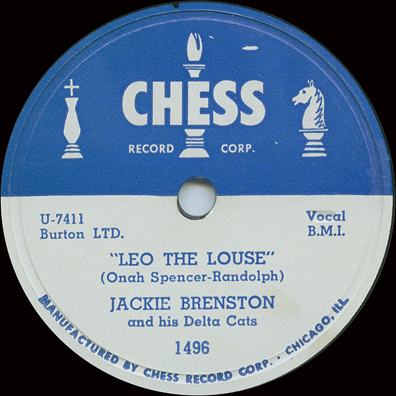
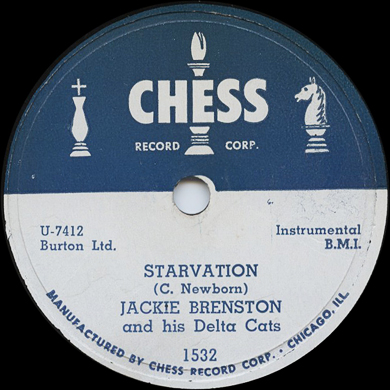
We are grateful to the P-Vine Special label for putting 3 unissued sides on its 1984 LP, Jackie Brenston & His Delta Kings: Rocket 88. "Tell Troubles Goodbye" is now lost.
There was a follow-up session for Howlin' Wolf at Memphis Recording Service. Chess 1497, the company's follow-up to his breakout single, was recorded on December 18, 1951. Six sides were cut (we previously missed "California Boogie," first out in 1976 on a Charly LP, and "Smile at Me," which first appeared in 1977 on a different Charly LP). Chess 1497 was out on January 14, 1952, according to http://www.706unionavenue.nl/83574046.The others had to wait until The Wolf had died and reissue interest in his Memphis material was heating up.
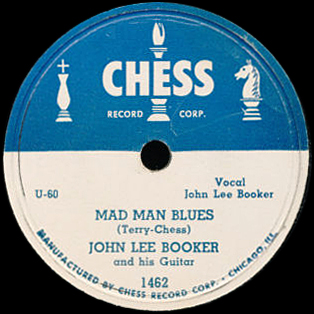
The two aforementioned sides by John Lee Hooker were obtained from Joe Von Battle, who had recorded them in the back of his record store in Detroit; obviously they did well enough in the marketplace to justify transporting Hooker to Chicago for a lengthy session in April (see the preceding section) and releasing some further John Lee "Booker" records. Numbered 60 and 61 on the original Gone release, the sides were given the matrix numbers U-60 and U-61, with later installments in that series going to (some of) the masters obtained from Sam Phillips.
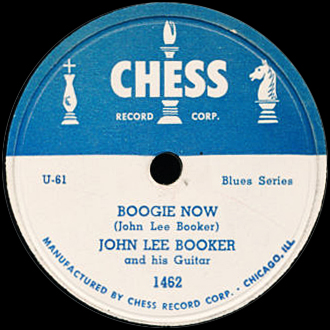
Two more came in from the Hilltop label. Some sources have placed the recording session in New York City, but Hilltop was based in Cincinnati and it wasn't hard to find a studio there. The label was run by one Robert Hill (who happens to be credited as the composer on both sides). Besides, stories ran in the trades about how a Cincinnati DJ named Ernie Waite played a test pressing before he was supposed to and compelled the company to rush Chess 1478 out to distibutors. This might all have been diversionary—Chess didn't want Hilltop to get too big a jump on it in Cincinnati—but the record was being advertised in Cash Box on August 11, 1951 (p. 18), in the same issue as the story about premature play (p. 17). Display ads for the record popped up again in Cash Box on August 25 (p. 16) and September 1 (p. 16), suggesting the company was expecting a lot of juke box action. It appears that John Godfrey, the leader on the session, was a drummer; "Hey Little Girl" features some rather thin vocal harmonies from his trio, and some prominent work by an ornithological alto saxophonist.
In December 1951, Leonard and Phil scarfed up the remains of Lee Eglanick and Lew Simpkins's Premium, which had quit recording in July and closed its doors in September. As we don't know of anything from the Premium deal being released until January 1952, all Premium-derived releases will be included in our 1952 listing.
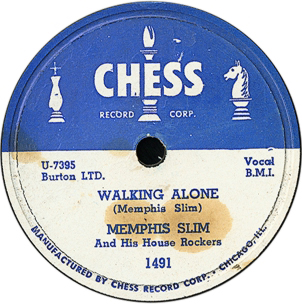
In all, at least 84 sides were purchased. And that's just counting the Premium masters that Chess released on singles. The acquisition effectively encompassed every master that Premium had recorded and not sold to RCA Victor—around 80 sides in all. With such a level of activity, the Chess brothers felt a need to create separate matrix series for purchased items. Characteristically, they never employed these secondary series with full consistency. Some purchased material kept leaking back into the original U7000 series. Some sides they had recorded in Chicago ended up in the secondary series. They started a new series at U60 and U61 for two John Lee "Booker" sides from Detroit (originally issued by Joe Von Battle on the super-low- circulation Gone 60/61), then extended it the material that began cascading in from Sam Phillips in Memphis. After a while, the F1000 series (later altered to C1000) was added. Still, there is plenty of material from Memphis Recording Service that never had any matrix numbers except those in the U7000s.

| Matrix | Artist | Title | Release Number | Recording Date | Release Date |
| 100A [JOB] |
Baby Face Leroy and His Trio | My Head Can't Rest Anymore | Chess 1447A [JOB 100] |
mid 1950 | January 1951 |
| 100B [JOB] |
Baby Face Leroy and His Trio | Take a Little Walk with Me | Chess 1447B [JOB 100] |
mid 1950 | January 1951 |
| U-31641 [JOB] |
J. B. Lenore [sic] and his Bayou Boys | Deep in Debt Blues | Chess 1463 | c. December 1950 [Modern Recording Studio, Chicago] |
June 1951 |
| U-31642 [JOB] |
J. B. Lenore and his Bayou Boys | Carrie Lee | Chess 1463 | c. December 1950 [Modern Recording Studio, Chicago] |
June 1951 |
| JB-31643 [JOB] |
J. B. [Lenoir] and His Bayou Boys | My Baby Told Me | Chess 1449 | c. December 1950 [Modern Recording Studio, Chicago] |
January 1951 |
| J.B.-31644 [JOB] |
J. B. and His Bayou Boys | Korea Blues | Chess 1449 | c. December 1950 [Modern Recording Studio, Chicago] |
January 1951 |
| U-1006 (JB 1001-B in vinyl) |
Floyd Jones and his Guitar | Dark Road | Chess 1498 [first version; from JOB 1001] |
March 22, 1951 | January 1952 |
| U-1007 (JB 1001-A in vinyl) |
Floyd Jones and his Guitar | Big World | Chess 1498 [first version; JOB 1001] |
March 22, 1951 | January 1952 |
| SU-2135 [Sunrise] |
Al Hibbler and His Orchestra (Vocal Al Hibbler) | It Don't Mean a Thing | Chess 1455 | 1948 | late February 1951 |
| SU-2140 [Sunrise] |
Al Hibbler and His Orchestra | What Will I Tell My Heart | Chess 1455 | 1948 | late February 1951 |
| SU-2039 [should be 2029] [Sunrise] |
Al Hibbler and Orchestra | Trees | Chess 1456 [Miracle M-501] |
November 1947 [New York City] |
late February 1951 |
| SU-2030 [Sunrise] |
Al Hibbler and Orchestra | Lover Come Back to Me | Chess 1456 [Miracle M-501] |
November 1947 [New York City] |
late February 1951 |
| EB-1002 [Sunrise] |
Al Hibbler and Orchestra | Solitude | Chess 1457 [Sunrise 2002] |
early 1947 [New York City] |
late February 1951 |
| EB-1004 [Sunrise] |
Al Hibbler and Orchestra | Feather Roll Blues | Chess 1457 [Sunrise 2002] |
early 1947 [New York City] |
late February 1951 |
| U-7371 [Su 2142] |
Al Hibbler | I Love You | Chess 1481 [Miracle M-515] |
1948 | November 1951 |
| U-7372 [EB1003A] |
Al Hibbler | My Little Brown Book | Chess 1481 [Sunrise 2001] |
early 1947 [New York City] |
November 1951 |
| U-7316 [Sam Phillips] |
Jackie Brenston and his Delta Cats | Rocket "88" | Chess 1458 | March 5, 1951 [Memphis] |
March 1951 [78] 1954 [45] |
| U-7317 [Sam Phillips] |
Jackie Brenston and his Delta Cats | Come Back Where You Belong | Chess 1458 | March 5, 1951 [Memphis] |
March 1951 [78] 1954 [45] |
| U-7324 [Sam Phillips] |
Ike Turner and his Kings of Rythm [sic] | Heartbroken and Worried | Chess 1459 | March 5, 1951 [Memphis] |
April 1951 |
| U-7325 [Sam Phillips] |
Ike Turner and his Kings of Rythm | I'm Lonesome Baby | Chess 1459 | March 5, 1951 [Memphis] |
April 1951 |
| U7318 [Al Benson] |
Eddie South and his Orchestra | Pate-rified | (Chess CHV-415) | c. March 3, 1951 | |
| U-7319 [Al Benson] |
Eddy [sic] South and His Orchestra | Vocal and Directed by Al Benson | I Can't Give You Anything but Love | Chess 1460 [Parrot 5000] |
c. March 3, 1951 | April 1951 |
| U7319 [alt.] [Al Benson] |
Eddie South and his Orchestra | I Can't Give You Anything but Love | (Chess CHV-415) | c. March 3, 1951 | |
| U7320 [Al Benson] |
Eddie South and his Orchestra | Fiddle Ditty | (Chess CHV-415) | c. March 3, 1951 | |
| U7320 [alt.] [Al Benson] |
Eddie South and his Orchestra | Fiddle Ditty Ending | (Chess CHV-415) | c. March 3, 1951 | |
| U7321 [Al Benson] |
Eddie South and his Orchestra | Yesterdays | c. March 3, 1951 | ||
| U-7322 [Al Benson] |
Eddy South and his Orchestra | Directed by Al Benson | Currant Jelly | Chess 1460 [Parrot 5000] |
c. March 3, 1951 | April 1951 |
| U7323 [Al Benson] |
Eddie South and His Orchestra | Sentimental Rhapsody | (Chess CHV-415) | c. March 3, 1951 | |
| U-60 [Joe Von Battle] |
John Lee Booker and his Guitar | Vocal John Lee Booker | Mad Man Blues | Chess 1462 [Gone 60/61] |
late 1950 [Detroit] | May 1951 |
| U-61 [Joe Von Battle] |
John Lee Booker and his Guitar | Boogie Now | Chess 1462 [Gone 60/61] |
late 1950 [Detroit] | May 1951 |
| U7335 [Premium] |
Sonny Stitt | I Cover the Waterfront | (Chess LP 1445) | 1951 | |
| U7336 [Premium] |
Sonny Stitt | Don't Worry 'bout Me | (Chess LP 1445) | 1951 | |
| ? [Premium] | Sonny Stitt | unidentified title | 1951 | ||
| ? [Premium] | Sonny Stitt | unidentified title | 1951 | ||
| U-64 [Sam Phillips] |
Lou Sargent and his Orchestra | Ridin' the Boogie | Chess 1465 | April or May 1951 [Memphis] |
May 1951 |
| U-65 [Sam Phillips] |
Lou Sargent and his Orchestra (vocal: Les Mitchell) | She Really Treats Me Wrong | Chess 1465 | April or May 1951 [Memphis] |
May 1951 |
[Sam Phillips] |
Howlin' Wolf | Baby Ride with Me (Ridin' in the Moonlight) | (Bear Family BCD 14560) | around May 14, 1951 [Memphis] |
|
| tk. 1 [Sam Phillips] |
Howlin' Wolf | Baby Ride with Me (Ridin' in the Moonlight) | (Bear Family BCD 15500) | around May 14, 1951 [Memphis] |
|
| tk. 2 [Sam Phillips] |
Howlin' Wolf | Baby Ride with Me (Ridin' in the Moonlight) | (Bear Family BCD 15500) | around May 14, 1951 [Memphis] |
|
| tk. 3 [Sam Phillips] |
Howlin' Wolf | Baby Ride with Me (Ridin' in the Moonlight) | (Bear Family BCD 15500) | around May 14, 1951 [Memphis] |
|
| tk. 4 [Sam Phillips] |
Howlin' Wolf | Baby Ride with Me (Ridin' in the Moonlight) | (Ace CH 52 [LP]) | around May 14, 1951 [Memphis] |
|
[Sam Phillips] |
Howlin' Wolf | How Many More Years | (Bear Family BCD 15460) | around May 14, 1951 [Memphis] |
|
| tk. 1 [Sam Phillips] |
Howlin' Wolf | How Many More Years | (Bear Family BCD 15500) | around May 14, 1951 [Memphis] |
|
| tk. 2 [Sam Phillips] |
Howlin' Wolf | How Many More Years | damaged | around May 14, 1951 [Memphis] |
|
| tk. 3 [Sam Phillips] |
Howlin' Wolf | How Many More Years | (Bear Family BCD 15500) | around May 14, 1951 [Memphis] |
|
| tk. 4 [Sam Phillips] |
Howlin' Wolf | How Many More Years | unissued | around May 14, 1951 [Memphis] |
|
| U-62 [Sam Phillips] |
Rufus Thomas, Jr. | Night Workin' Blues | Chess 1466 | May or June 1951 [Memphis] |
July 1951 |
| U-63 [Sam Phillips] |
Rufus Thomas, Jr. | Why Did You Deegee? | Chess 1466 | May or June 1951 [Memphis] |
July 1951 |
| U-7400 [Sam Phillips] |
Rufus Thomas abd [sic] His Orchestra | Crazy about You Baby | Chess 1492 | May or June 1951 [Memphis] |
January 1952 |
| U-66A [Sam Phillips] |
Jackie Brenston and His Delta Cats | My Real Gone Rocket | Chess 1469 [78 and 45 rpm] |
c. June 1951 [Memphis] |
October 1951 |
| U-7349 [Sam Phillips] |
Jackie Brenston [sic] and his Delta Cats [sic] [Billy Love] |
Juiced | Chess 1472 | c. June 1951 [Memphis] |
July 1951 |
| U-7350 [Sam Phillips] |
Jackie Brenston and his Delta Cats | Independent Woman | Chess 1472 | May or June 1951 [Memphis] |
July 1951 |
| U-7351 [prob. Sam Phillips] |
Evangelist Gospel Singers of Alabama | Leaning on the Lord | Chess 1473 | May or June 1951 [Memphis] |
July or August 1951 |
| U-7352 [prob. Sam Phillips] |
Evangelist Gospel Singers of Alabama | Lord Stop the War | Chess 1473 | May or June 1951 [Memphis] |
July or August 1951 |
| U-7373 [prob. Sam Phillips] |
The Spiritual Stars | I'll Search Heaven | Chess 1485 | June or July 1951 [Memphis] |
December 1951 |
| U-7374 [prob. Sam Phillips] |
The Spiritual Stars | Good Religion | Chess 1485 | June or July 1951 [Memphis] |
December 1951 |
| U-80 [Sam Phillips] |
Harmonica Frank | Swamp Root | Chess 1475-A | July 15, 1951 [Memphis] |
August 1951 |
| U-81 [Sam Phillips] |
Harmonica Frank | Going Away Walkin' | Chess 1475-A [sic; original coupling] |
July 15, 1951 [Memphis] | August 1951 |
| U-82 [Sam Phillips] |
Harmonica Frank | Step It Up and Go | Chess 1475-A [sic; later coupling] |
July 15, 1951 [Memphis] | August 1952 |
| U-83 [Sam Phillips] |
The Howlin' Wolf | Moanin' at Midnight | Chess 1479 | July 1951 [Memphis] |
August 1951 |
| U-84 [Sam Phillips] |
The Howlin' Wolf | How Many More Years | Chess 1479 | July 1951 [Memphis] |
August 1951 |
| U-84 [alt.] [Sam Phillips] |
The Howlin' Wolf | How Many More Years | (Redita RLP 105) | July 1951 [Memphis] |
|
| U-85 [Sam Phillips] |
Jackie Brenston and his Delta Cats | Tuckered Out | Chess 1469 [78 and 45 rpm] |
Sepember 20, 1951? [Memphis] |
October 1951 |
| ? [Sam Phillips] |
Jackie Brenston and His Delta Cats | Make My Love Come Down | (Chess [J] 6027) | c. June 1951 [Memphis] |
|
| ? [prob. Sam Philips] |
Jackie Brenston | I Want to See My Baby | (Chess [J] LP 6027) | 1951 [Memphis] | |
| ? [prob. Sam Philips] |
Jackie Brenston | My Baby Left Town | (Chess [J] LP 6027) | 1951 [Memphis] | |
| ? [prob. Sam Philips] |
Jackie Brenston | Fat Meat Is Greasy | (Chess [J] LP 6027) | 1951 [Memphis] | |
| ? [prob. Sam Philips] |
Jackie Brenston | Jackie's Chewing Gum | (Chess [J] LP 6027) | 1951 [Memphis] | |
| U-7375 [Sam Phillips] |
Roscoe [sic] Gordon | Booted | Chess 1487 [78 and 45 rpm] |
August 1951 [Memphis] |
December 1951 |
| U-7376 [Sam Phillips] |
Roscoe Gordon [vocal really by Gordon and Bobby "Blue" Bland] |
Love You 'til the Day I Die | Chess 1487 [78 and 45 rpm] |
August 1951 [Memphis] |
December 1951 |
| U-7377 [prob. Sam Phillips] |
Evangelist Gospel Singers of Alabama | Never Grow Old | Chess 1486 | August or September 1951 [Memphis] |
December 1951 |
| U-7378 [prob. Sam Phillips] |
Evangelist Gospel Singers of Alabama | Walk in the Light | Chess 1486 | August or September 1951 [Memphis] |
December 1951 |
| ? [prob. Sam Phillips] |
Evangelist Gospel Singers of Alabama | Jesus (Is My Friend) | (Macomba 3905 [CD]) | August or September 1951 [Memphis] |
|
| F 1008 [Sam Phillips] |
The Brewsteraires | Where Shall I Be (When That First Trumpet Sounds) | Chess 1502 | September 26, 1951 [Memphis] |
April 1952 |
| F 1009 [Sam Phillips] |
The Brewsteraires | (The Lord Gave Me) Wings for My Soul | Chess 1502 | September 26, 1951 [Memphis] |
April 1952 |
| ? [Sam Phillips] |
The Brewsteraires | In the Middle of the Night | unissued | September 26, 1951 [Memphis] |
|
| ? [Sam Phillips] |
The Brewsteraires | More of Jesus, Less of Me | (JSP 77154 [CD]) | September 26, 1951 [Memphis] |
|
| U-7399 [Sam Phillips] |
Rufus Thomas and His Orchestra | No More Doggin' Around | Chess 1492 | early October 1951 [Memphis] |
January 1952 |
[Sam Phillips] |
Rufus Thomas and His Orchestra | Chrismas Song | lost | early October 1951 [Memphis] |
|
| U-7393 [Sam Phillips] |
L. J. Thomas and His Louisiana Playboys | Baby Take a Chance with Me | Chess 1493 | October 1951 [Memphis] |
January 1952 |
| U-7394 [Sam Phillips] |
L. J. Thomas and His Louisiana Playboys | Sam's Drag | Chess 1493 | October 1951 [Memphis] |
January 1952 |
| 1014 [Sam Phillips] |
Billy "Red" Love and his Orchestra | Drop Top | Chess 1508 | November 2, 1951 [Memphis] |
April 1952 |
| 1015 [Sam Phillips] |
Billly "Red" Love and his Orchestra | You're Gonna Cry | Chess 1508 | November 2, 1951 [Memphis] |
April 1952 |
| ? [Sam Phillips] |
Billly "Red" Love and his Orchestra | Ain't No More | (Bear Family [G] BCD 17310 [CD]) | November 2, 1951 [Memphis] |
|
| tk. 1 [Sam Phillips] |
Doctor Ross and His Jump and Jive Boys | Country Clown | (Charly CDSUNBOX 7) | November 29, 1951 [Memphis] |
|
| F-1012 tk. 2 [Sam Phillips] |
Doctor Ross and his Jump and Jive Boys | Country Clown | Chess 1504 | November 29, 1951 [Memphis] |
March 1952 |
| F-1013 [Sam Phillips] |
Doctor Ross and His Jump and Jive Boys | Doctor Ross Boogie | Chess 1504 | November 29, 1951 [Memphis] |
March 1952 |
| ? [Sam Phillips] |
Doctor Ross and His Jump and Jive Boys | Cat Squirrel | (Charly CDSUNBOX 7) | November 29, 1951 [Memphis] |
|
| tk. 1 [Sam Phillips] |
Doctor Ross and His Jump and Jive Boys | Little Soldier Boy | (Arhoolie LP 1065) | November 29, 1951 [Memphis] |
|
| tk. 2 [Sam Phillips] |
Doctor Ross and His Jump and Jive Boys | Little Soldier Boy | (Charly CDSUNBOX 7) | November 29, 1951 [Memphis] |
|
| tk. 1 [Sam Phillips] |
Doctor Ross and His Jump and Jive Boys | Shake A My Hand | (Arhoolie LP 1065) | November 29, 1951 [Memphis] |
|
| tk. 2 [Sam Phillips] |
Doctor Ross and His Jump and Jive Boys | Shake A My Hand | (JSP 4239 [CD]) | November 29, 1951 [Memphis] |
|
| ? [Sam Phillips] |
Doctor Ross and His Jump and Jive Boys (Wiley Gatlin, Vocal) | That's Alright (Goin' Back South) | (Arhoolie 371 [CD]) | November 29, 1951 [Memphis] |
|
| F-1002 [Sam Phillips] |
Bob Price | Vocal Bob Price | How Can It Be? | Chess 1495 | December 2, 1951 [Memphis] |
January 1952 |
| F-1003 [Sam Phillips] |
Bob Price | Sticks and Stones | Chess 1495 | December 2, 1951 [Memphis] |
January 1952 |
| ? [Sam Phillips] |
Bob Price | Why So Blue | rejected | December 2, 1951 [Memphis] |
|
| ? [Sam Phillips] |
Bob Price | Donatin' My Time | rejected | December 2, 1951 [Memphis] |
|
| U-7397 [Sam Phillips] |
Robert Bland with Roscoe [sic] Gordon And His Orchestra | Crying | Chess 1489 | December 4, 1951 [Memphis] |
December 1951 |
| U-7398 [Sam Phillips] |
Robert Bland with Roscoe Gordon And His Orchestra | A Letter from a Trench in Korea | Chess 1489 | December 4, 1951 [Memphis] |
December 1951 |
| 1504-A [Sam Phillips] |
Harmonica Frank | Howlin' Tomcat | Chess 1494 | December 1951 [Memphis] |
January 1952 |
| 1504-A tk. 2 [Sam Phillips] |
Harmonica Frank | Howlin' Tomcat | (Puritan 3003 [LP]) | December 1951 [Memphis] |
|
| 1504-B [Sam Phillips] |
Harmonica Frank | She's Done Moved | Chess 1494 | December 1951 [Memphis] |
January 1952 |
[Sam Phillips] |
Harmonica Frank | Christmas Time Again | lost | December 1951 [Memphis] |
|
| U-7405 [Sam Phillips] |
Jackie Brenston and Edna McRaney with the Delta Cats | Hi, Ho Baby | Chess 1496 [78 and 45 rpm] |
December 15, 1951 [Memphis] |
January 1952 |
| U-7406 [Sam Phillips] |
Jackie Brenston | Tell Troubles Goodbye | unissued | December 15, 1951 [Memphis] |
|
| U-7407 [Sam Phillips] |
Jackie Brenston and his Delta Cats | The Blues Got Me Again | Chess 1532 | December 15, 1951 [Memphis] |
December 1952 |
| U-7408 [Sam Phillips] |
Jackie Brenston | You Won't Be Comin' Back | (Chess [J] PLP 6027) | December 15, 1951 [Memphis] |
|
| U-7409 [Sam Phillips] |
Jackie Brenston | 88 Boogie | (Chess [J] PLP 6027) | December 15, 1951 [Memphis] |
|
| U-7410 [Sam Phillips] |
Jackie Brenston | Lovin' Time Blues | (Chess [J] PLP 6027) | December 15, 1951 | |
| U-7411 | Jackie Brenston and his Delta Cats | Leo the Louse | Chess 1496 [78 and 45 rpm] |
December 15, 1951 [Memphis] |
January 1952 |
| U-7412 [7412-A in vinyl] |
Jackie Brenston and his Delta Cats | Starvation | Chess 1532 | December 15, 1951 [Memphis] |
December 1952 |
| F-1005 [Sam Phillips] |
The Howlin' Wolf | Howlin' Wolf Boogie | Chess 1497 | December 18, 1951 [Memphis] |
January 1952 |
| ? [Sam Phillips] |
The Howlin' Wolf | California Blues #1 | (Charly CR 30102) | December 18, 1951 [Memphis] |
|
| ? [Sam Phillips] |
The Howlin' Wolf | California Boogie | (Charly CR 30102) | December 18, 1951 [Memphis] |
|
| ? [Sam Phillips] |
The Howlin' Wolf | Look-a-Here Baby | (Charly CR 30134) | December 18, 1951 [Memphis] |
|
| F-1004 [Sam Phillips] |
The Howlin' Wolf | The Wolf Is at Your Door | Chess 1497 | December 18, 1951 [Memphis] |
January 1952 |
| ? [Sam Phillips] |
The Howlin' Wolf | Smile at Me | (Charly CR 30134) | December 18, 1951 [Memphis] |
|
| U-701-A [Robert Hill] |
John Godfrey Trio | Hey Little Girl | Chess 1478 [Hilltop 701] |
1951 [Cincinnati] |
August 1951 |
| U-702-B [Robert Hill] |
John Godfrey Trio | Booging the Blues | Chess 1478 [Hilltop 701] |
1951 [Cincinnati] |
August 1951 |
As 1952 began, Leonard Chess had obviously made some commitments about musical direction. Now that the company had two of the top-selling down-home blues artists in its catalog (Muddy Waters and Howlin' Wolf) Chess continued its efforts in this genre. There was the inconvenience, however, of The Wolf's continuing to record for the Bihari brothers in Memphis as well as Sam Phillips; this was eventually resolved in a deal that committed the Wolf exclusively to Chess while the Biharis got Roscoe Gordon. Meanwhile, jazz was not getting much emphasis. Early in the year, Chess lost interest in Claude McLin when he left town for Los Angeles. The label would presumably have liked to record Gene Ammons, but he moved first to Decca and then to the company's new Chicago-based rival, United. The most significant jazz artist that Chess recorded in 1952 was Eddie Johnson; clearly the hope was that numbers like "Twin Rock" would appeal to the R&B-consuming public. And Sax Mallard recorded another session for the label, but this was definitely an R&B effort; in the future, he would be restricted to accompanying singers and doo-wop groups.
During January 1952, the company undertook no new recording. Apparently the Chess brothers were too busy digesting the remains of Premium—around this time they were affixing new matrix numbers to two sides by tenor saxophonist Lynn Hope and alto saxophonist Tab Smith.
Activity resumed at Universal on February 11, with a session split between Jimmy Rogers and Eddie Ware.
The company had expanded far enough to justify opening a subsidiary. (Disc jockeys, even when handsomely compensated for featuring the company's product, were reluctant to play too many items on the same label in a row.) The first releases on the Checker label, 750 and 751, were advertised in Cash Box on April 5, 1952, and reviewed in Billboard on April 26 (p. 27).
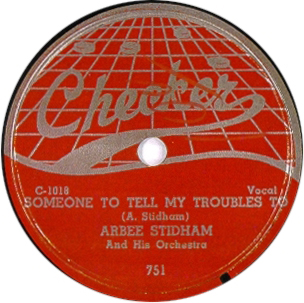
Checker 751 appears to have been Arbee Stidham's debut as a guitarist (he had been a regular on RCA Victor from 1947 to 1950, strictly as a singer). Stidham, who was born in DeValls Bluff, Arkansas, on February 9, 1917, was the son of Luddie Stidham, who played in Jimmie Lunceford's big band. Arbee had been a professional musician since he was 12 or 13 years old. He originally played the alto saxophone, but had to give up the instrument for health reasons. His singing voice was a strangely portentous, quavery baritone that made him seem much older than he really was. During his RCA years, when he enjoyed a big hit with "My Heart Belongs to You," Stidham often recorded with Sax Mallard. After RCA dropped him, he picked up with Bob Shad's Sittin' in label. On his first session for Checker, Stidham was accompanied by Andrew "Goon" Gardner (alto sax); Tommy "Mad Man" Jones (tenor sax); Eddie Ware (piano); Ransom Knowling (bass); and Judge Riley (drums). (Some sources have put Willie Lacey on the guitar instead of the leader.) Checker 751 was part of the official launch for the new label; it got a joint advertisement in Cash Box (with Checker 750) on April 5, 1952. Checker 751 was not a big seller, though it apparently prompted RCA Victor to reissue "My Heart Belongs to You."
Goon Gardner would appear on another blues session or two for Chess, but the label unfortunately made no further use of Tommy Jones' bar-walking skills (frustrated by his lack of exposure on recordings, Jones would eventually launch his own Mad label). At least today's listeners can enjoy Jones' little explosion in the middle of "Mr. Commissioner," a plea to the Chicago police hierarchy to suspend their crackdown on "policy" (aka the numbers).
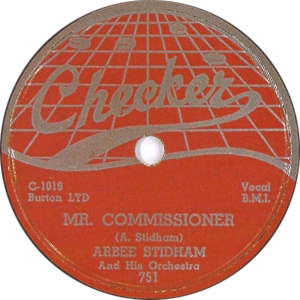
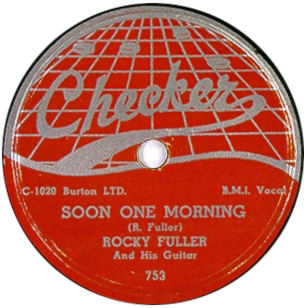
The company had more studio time booked on March 13, for a down-home blues artist who at the time was calling himself Rocky Fuller. Born Iverson Minter in Bessemer, Alabama, on March 23, 1932, he had been orphaned at the age of five and was already an experienced performer on guitar, harmonica, and vocals when the Chess brothers decided to record him. The session produced a large number of takes, partly because "Fuller"'s tunes, like his occasional duet partner John Lee Hooker's, evolved as they were repeated. The company tried one release on Fuller: Checker 753 paired two typically dramatic blues sides. Retail sales eluded it, making it a major collector's item today.
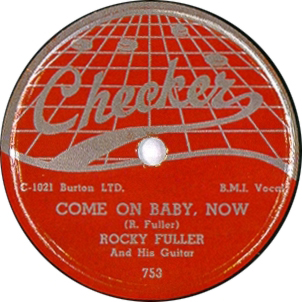
The artist next showed up on a self-produced single for Fuller Records, made in Detroit in 1953; on that occasion, he went as Playboy Fuller. But when he cut a duet with John Lee Hooker, in Detroit later that same year, he'd metamorphosed into Rockin' Red. By 1960, he'd settled on the name Lousiana Red, the same name he would use for the rest of his career, making a single in New York for Atlas. He recorded prolifically in the 1960s, making singles for Glover and Laurie and LPs for Roulette and Atco, and continuing in the 1970s and 1980s for such labels as L & R and Tomato.
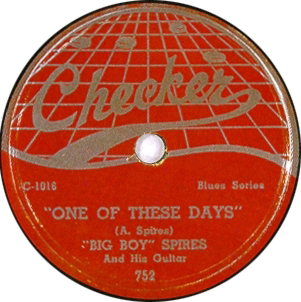
Stylistically quite different were the two other sides laid down that same day in March, by down-home blueman Arthur "Big Boy" Spires. Born in Natchez, Mississippi on February 25, 1912, Spires played guitar and sang with the deep sonority of Charlie Patton and Son House. But without help from accompanists, his time tended to wander. During this period he was working Chicago clubs with his Rocket Four, which included Eddie El on second guitar. On his Checker outing, which was his first appearance on record, he further benefited from the contributions of guitarist Earl Dranes. On "Murmur Low," a tribute to a "big fat mama, with meat shakin' on her bones," Willie Smith, who often played drums in Spires' working group, does the shaking on maracas. Both sides are considered classics today, but when released on Checker 752 they stirred little sales action, and the Chess brothers quickly dropped Spires from their roster.
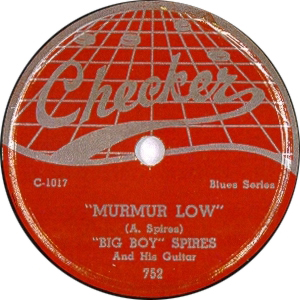
Spires would record again under the joint auspices of JOB and Chance in January 1953. He would do another in December 1954 in Al Smith's basement for United (this was left unreleased till years later). Spires, who continued to play the clubs with the Rocket Four during the remainder of the 1950s, made an still largely unreleased session for Testament in 1965, subsequently being forced to give up the guitar by advancing arthritis; he died in Chicago on October 22, 1990.
At some point during March or April, the company recorded a veteran gospel singer, the Reverend W. M. Chambers, who had made records before World War II. The Reverend was accompanied on his only Chess release by a female vocal group, organ, and guitar; the sound quality is fairly rough and could have been taken off a radio broadcast from a church. Chess 1511 appears to have been his last recording.
An artist that got away was one Bill Bailey, who, according to a brief item in Billboard (March 22, 1952) "will cut four sides, country style, for Chess Records next week" (p. 23). These tracks, if ever recorded, have disappeared without a trace. The Chess brothers would not really get involved in country music until 1954, when they started the Chess 4858 series in collaboration with Stan Lewis, their distributor in Shreveport, Louisiana.
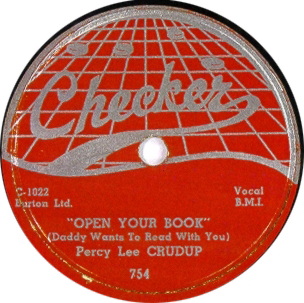
On a trip southward in May, Leonard Chess indulged in a little extracurricular recording, taping two sides by bluesman Arthur "Big Boy" Crudup in Jackson, Mississippi. Crudup was under contract to RCA Victor at the time, so, in a move that fooled no one, the two sides were attributed to one Percy Lee Crudup on release. Checker 754 remains a curiosity, as Chess wouldn't get another opportunity to record the durable bluesman.
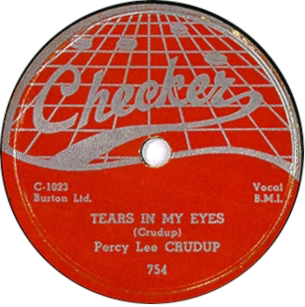
After an early string of musically interesting releases that all sold rather poorly and in some cases remain obscure today, Checker justified its separate status in August 1952, when Checker 758 (Little Walter's "Juke") was released. "Juke" grew into a tremendous hit, so quickly that Walter left Muddy Waters' band while it was still on the road in Louisiana, so he could return to Chicago and organize his own combo.
"Juke" came out of a regular Muddy Waters session, which took place on May 12, 1952. To round out the session, Little Walter was asked to record an instrumental that he often performed with the band.
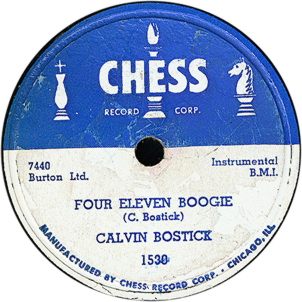
Calvin Bostick and his trio were still holding down their gig at the 411 Club when they returned for another session on May 27. This time just two tracks were laid down. "411 Boogie" is a gimmicky instrumental that moves a good way from the Nat King Cole mold with its addition of a second, sped-up piano line via overdubbing. The side was held till late in the year for a Christmas release, then, after Bostick was drafted into the army, was re-paired with its session-mate "Bang Bang Blues" for a mid-1954 issue, which would be the pianist's last for the company.
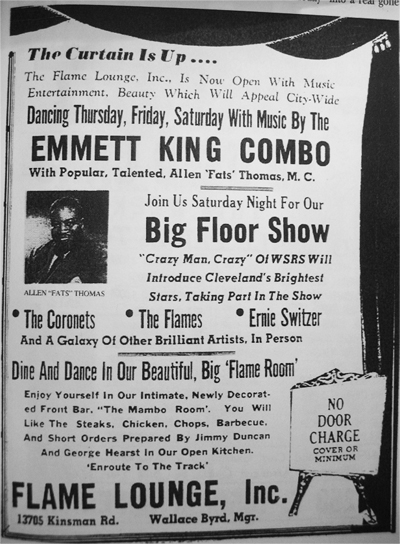
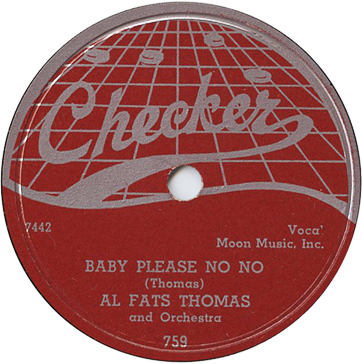
One of those who managed to escape being swept up Checker's wave of success was Al Fats Thomas, whose only release for the company would appear on Checker 759. Allen Thomas was a showbiz personality from Cleveland, Ohio. He had been on the scene since at least 1935, in a number of roles. Thomas sang and acted as master of ceremonies. Occasionally he led a band. Thomas was even credited, once in a long while, with playing an instrument: "congo drums," in an ad from 1950; trombone, in 1954. His axe in 1949, when he was a member of Smitty Al's trio, was a Victrola horn bent into the approximate shape of a tenor saxophone, with a kazoo for a mouthpiece (Tom Ehrbar, "A Nostalgic Glimpse at a Big Band Musician," Cleveland Call and Post, December 25, 1971, p. 17 A).
Thomas, who was sometimes billed as "the big man with the big voice," had a heavy bass/baritone equally well suited to shouting the blues and intoning lounge ballads. He recorded four sides in New York City for a small company called Lissen in 1947, backed the band of one Lee Norman; these were released on two singles (which were announced in the Chicago Defender, October 18, 1947, p. 18). In 1949, he cut four sides for National, leading to just one single. National 9088 was released on August 15, 1949 (Billboard, August 13, p. 28) and reviewed, not too favorably, on August 27 (p. 107). On National, which also recorded him in New York, Thomas rated the services of a top-grade studio band (featuring such high-profile musicans as Eddie "Lockjaw Davis" on tenor sax and George Duvivier on bass).
In 1952, Thomas was tight with Alan Freed, who spun R&B platters at Cleveland's radio station WJW. When he was impressed by a vocal group called the Crazy Sounds that was performing at a club called the Loop, Thomas phoned Freed and let him listen to the group. Freed took the group under his wing and renamed them the Moonglows, after his on-the-air persona. Freed sponsored a massive "Moondog Maytime Ball" at the Cleveland Arena, with three shows on May 17 and 18, 1952; headlined by the Dominoes, the bill included H-Bomb Ferguson, Little Jimmy Scott, the bands of Todd Rhodes, Freddy Mitchell, and Morris Lane, and "Sensational Singing Entertainer" Fats Thomas. Not mentioned in the original Call and Post display advertisement, which ran on May 10, were "Jackie Brenston and his Delta Cats direct from Memphis plus Arbee Stidham and his great orchestra direct from Chicago" (Call and Post, May 17, 1952, p. 5 D); obviously Freed had made a last-minute deal with the Chess brothers to add them to the bill. "Big Fat" Thomas reappeared as the MC of the Dawn Dance at the Paradise on May 30, 1952 (Cleveland Call and Post, May 31, 1952, p. 3 D). In July he was featured with Live Mackay and The Three Naturals at Jack's Musical Bar (Cleveland Call and Post, July 26, 1952, p. 6 D)
Thomas's appearance on Checker is the first concrete indication that talent was being sent the Chess brothers' way by Alan Freed. The Moonglows would end up recording for them, but not for another two years: first the group cut one single for a label run by Freed himself, then Freed arranged for them to sign with one of the Chess brothers' rivals, Chance, where they would remain until owner Art Sheridan decided to close the label in 1954. The Coronets, another group under Freed's sponsorship, would end up on Chess much sooner.
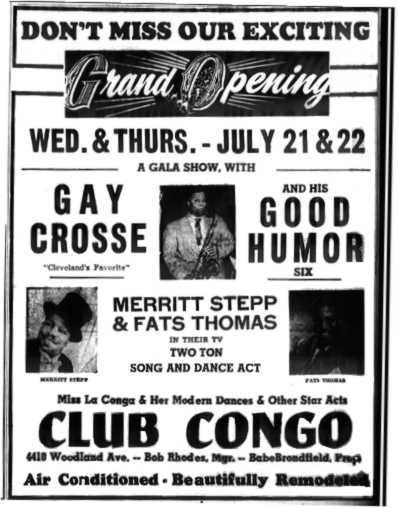
On June 13, 1952—or a little before if the date is for mastering—Fats Thomas cut his two sides for Checker. These were obviously made in Cleveland; there is no evidence Thomas ever performed in the Windy City. While Thomas got exclusive composer credit on both sides, it's not hard to figure out who owned Moon Music.
The single that resulted was, well, eccentric. "Baby Please No No" is a funereal ensemble chant begging forgiveness; only the rhythm section, with some help from Thomas on the "congo drums," plays on it. The flip is a jazz instrumental, titled "Dog Days" on account of its release date (July, rather than August, but close enough). Far from torpid or listless, it is a lively bop number played by an excellent sextet of trumpet, tenor sax, electric violin, piano, bass, and drums.
Thomas had been working, earlier in 1952, in a trio with trumpeter Herbie Francis. Pianist Maceo Owens, then with a group called the Four Tones, told the Cleveland Call and Post (August 9, 1952, p. 4 D), that he had played on this session. Owens later joined the Nation of Islam, changed his name to Sheikh Al-Hajj Hazziez, published The Book of Muslim Names in 1976, and eventually became the secretary of Muhammad's Mosque #7 in New York City. The violinist, whom Anthony Barnett has identified as Jimmy Lane, had obviously heard of Stuff Smith. The bassist, who is addressed as "Baker" as he gets a well-deserved solo on "Dog Days," is in the league of Wilbur Ware and Charles Mingus; Barnett (email communication, March 5, 2024) says that he was probably George Barkley. In the same email, Barnett gives a probable attribution to Dave ("Bubba" or "Bubber") Brooks on tenor sax and a possible to Ernie Harewood at the drums (Harewood had previously recorded with Barkley for the Uptown label).
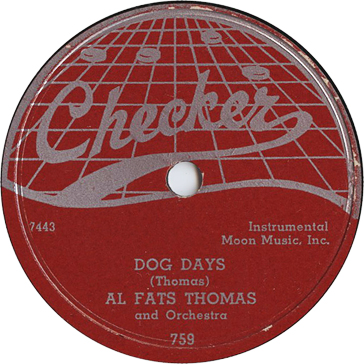
Thomas recorded just one more time that we know of, around a year later for a very small Cleveland-based label called Hawk, which was owned by another DJ. He did an uptempo blues ("Blowing My Horn") on Hawk 72053 and a lounge ballad ("I Thought I Found Love," also featuring Jimmy Lane) on Hawk 72054. These were explicitly credited to pianist Nate Spencer and his Orchestra with vocalist "Allen" Thomas. The same two Hawk sides were mentioned, with highly approximate titles, in an announcement for a New Year's Eve Show at the Cedar Gardens, where Thomas was appearing in a revue (Cleveland Call and Post, January 2, 1954, p. 7 B). The other two sides on these Hawk releases were credited to "Kitty Kaye and the Cats"; they appear to be the work of the Spencer crew at a different session backing a female vocalist.
On January 26, 1953, Thomas took up an engagement for a week at Club Ebony. The Call and Post referred to him as "local boy who made good when he made the 'Moondoggers' howl" (January 24, 1953, p. 6 B). On February 7, 1953, the Cleveland Call and Post (p. 6 B) ran an item about a charity event at the Pla Mor Ballroom featuring such performers as singer Terry Timmons, a group of boys called "The Hamboners" imitating a recent Red Saunders hit, and a band led by Fats Thomas. Thomas worked Club Congo in Cleveland in 1954, as part of a song and dance duo. After being involved in some amateur shows at Club Congo in the early months of 1955, he landed a gig as MC at the Flame Lounge (not related to the Chicago establishments with the same name). He remained active in the clubs through the end of the decade. In June 1958 he was the featured vocalist at the Lake Glen Country Club (Cleveland Call and Post, June 21, 1958, p. 7 C). In July 1958 he was back with his old song and dance partner, Merritt Stepp, for the Steppettess Social Club gathering at the Wheel Lounge (Cleveland Call and Post, August 2, 1958, p. 7 C). In March 1960 was hosting his own TV show, the Fats Thomas Revue, which ran on Saturday nights on local station WEWS (Cleveland Call and Post, March 12, 1960, p. 6 C).
Our thanks go to Anthony Barnett, Howard Rye, Joe Mosbrook, and John Richmond for tracking down Al Thomas, Nate Spencer, and Maceo Owens, to Barnett for identifying Jimmy Lane, George Barkley, and Dave Brooks—and to the late George Paulus for locating Hawk 72054.
On July 11, the company undertook a marathon blues session featuring Memphis Minnie and Blue Smitty. Born Lizzie Douglas in Algiers, Louisiana, in 1897, singer and guitarist Memphis Minnie was by this time a veteran of the blues recording industry; she had made her first records in 1929 and adopted Chicago as her home base in the early 1930s. As the Melrose combine faded, her long association with Columbia Records came to an end in 1949. She recorded for the short-lived Parkway label in 1950, but the company dealt her sides away to Regal, which went out of business about a year after Parkway did. For her Checker session, she was joined by her husband and long-time duet partner, Ernest "Little Son Joe" Lawlars on second guitar, an unidentified drummer, and (on three of the four sides), Little Walter on harmonica. "Left Me with a Broken Heart" (in two takes) was the first tune on the session and the only one to include a pianist. (Whether this was the original plan or Walter was late arriving, we have no way of knowing.) In a letter to Mike Leadbitter after she had been confined to a nursing home, Minnie remembered the pianist in question as "Black Bob," but the mystery keyboarder from the 1930s had long been off the scene. Daniel Gugolz's suggestion, that the pianist was Bob Call, makes perfect sense.
The resulting peformances are highly valued by blues fans who might read this now, but the company was hesitant about their commercial potential. Checker 771 included a remake of her early 1940s hit "Me and My Chauffeur," yet it didn't hit any shelves for 10 months after the sides were recorded, by which time Little Walter (who played on "Chauffeur") had become red-hot commercially. Although it was re-pressed more than once (there are copies with the later, maroon Checker label as well as the original red) and the single was still in the company catalogue in the early 1960s, it is not so easy to find today.
When her contract was not renewed, Memphis Minnie moved on to JOB, laying down what turned out to be her last commercial session in October 1953. In the late 1950s, she and Little Son Joe returned to Memphis. She had to give up performing after suffering a stroke in the early 1960s, and died in Memphis in 1973.
The remaining sides recorded that day were the work of Claude Smith, a guitarist who went in the clubs as Blue Smitty. Muddy Waters, who had worked with Smitty in the mid-1940s, acknowledged him as an influence, but Smitty kept his day job at a radio repair shop, and his session for Chess would be his only opportunity to record. Accompanied by pianist Malron Jett, drummer Ike Smith, and a bassist whose last name was Stewart, Smitty laid down two intense slow blues, which were pretty promptly released on Chess 1522. This is far scarcer today than Memphis Minnie's single on Checker. The other two sides from the session—one of which, "Date Bait," is positively perky—would remain in the vaults until the early 1970s; an alternate take of "Crying" was also unearthed and released on LP. An unintended consequence: the fierce master take of "Crying" is much harder to find today, though it can be heard on a Top Notch CD titled More Ugly Guitar from the Kings of Distortion.
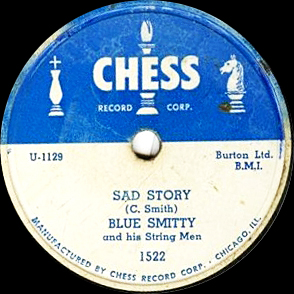
The advent of Checker seems to have thrown some confusion into the matrix number series. Chess kept using the U7000 series from Universal Recording (though items not recorded at that venue were often thrown into the series with no apparent consistency). Early in the year a 1000 series was opened for purchased material (most of it from the prolific Sam Phillips in Memphis); then the 1000s acquired a C prefix, and the series came to be used for material intended for the new Checker label—even though much of it was recorded back home at Universal in Chicago. (Adding to the overall messiness, the C series matrix numbers on both releases from the July 11 session were bumped up in error from the 1000s to the 1100s.) Finally, a U4300 ledger was opened at Universal for the freelance recording operations of Al Benson, who was reguarly dealing material to Chess during the second half of 1952. During the first half of 1953, many native Chess sessions would be given U4300 series matrix numbers...
A week later, the company brought Arbee Stidham back for four more sides. On the occasion, he was accompanied by tenor sax, piano, electric guitar, bass, and drums. The saxophonist has been identified as J. T. Brown, but the performer who can be heard on two of the tracks, though loud enough, is actually too crude and blowsy to be J. T. Brown. Sugarman Penigar is a better bet. The bassist hasn't been identified as Willie Dixon, but he was around at the time and the work sounds like his. Two of the tunes were tried in versions with a male vocal group (which can now be heard) and versions without (which we fear never will be). Apparently Leonard Chess was displeased with the day's output, with or without the doowoppers, for he would try again with Stidham, while nothing from this session would be released for many years. Just two tracks have appeared—on a bootleg LP, Doo Woppin' the Blues, that was clandestinely compiled from Aristocrat and Chess material.
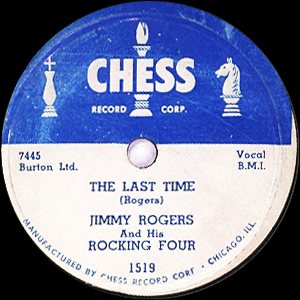
On August 12, Jimmy Rogers dropped in for four tunes of his own. Unusually, he was not accompanied by Muddy Waters, who was on the road on the time. Rogers' combo consisted of Henry Gray (piano), Po' Bob Woodfork (guitar), Willie Dixon (bass), and A. J. Gladney (drums). "The Last Time" and "Out on the Road" were promptly released on Chess 1519. (Fancourt and McGrath claim that Muddy provided backing vocals on "The Last Time," but the company was merely experimenting with vocal overdubs. Joe Williams' infamously double-tracked vocal on "Every Day I Have the Blues," covered below under Purchased Sessions, had been cut at Universal Recording in July.)
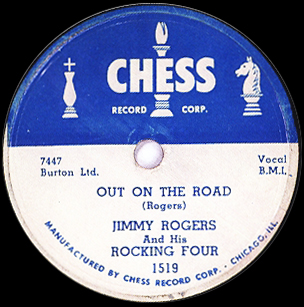
The next month was uncharacteristially slack, producing four unreleased gospel sides by one Reverend Green and another four pop or jazz sides by an artist who remains unidentified.
In early September, the company tried two sides by Eddie Johnson, but they were deemed unsatisfactory. Nothing has since been heard of them, which most likely means nothing ever will.
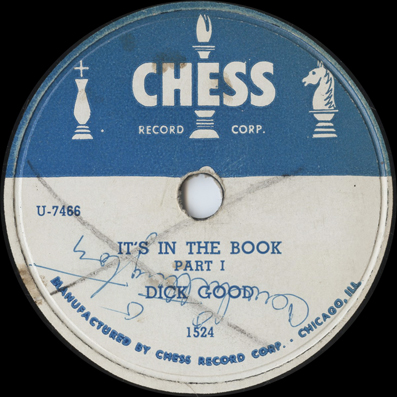
Next, the Chess brothers made an odd early foray into comedy. Dickie Goodman (abbreviating his name to Dick Good) recorded two versions of a monologue in which he deconstructed "Bo Peep." In Part I, he spoke posh; Part II consisted of the same material done in a heavy Yiddish accent. Both monologues appear to have been recorded in the studio, with canned laughter spliced in to create the illusion of an audience. The resulting release on Chess 1524, though funny, apparently didn't sell at all and was forgotten for many years; a copy turned up at an auction in 2009. In company files, the comedian's first name turned into "Deck" and the titles were rendered as "Bo Beep (English)" and "Bo Beep (Jewish)." Chess would not return to comedy until the company was regularly releasing LPs. In 1956, Dickie Goodman teamed up with comedian Bill Buchanan and record impresario George Goldner, starting the New York-based Luniverse label, which was in operation from 1956 to 1958. Their first release, "The Flying Saucer," full of clips from current rock and roll and R&B hits, including a couple lifted from Chess sides by Chuck Berry and Bobby Charles, caused a lot of legal headaches but was still a commercial success.
Chess got back on track with the Eddie Johnson session of September 12, which produced one of the greatest jukebox jazz singles, a coupling the boogie "Tiptoe" with the swinger "Twin Rock" on Chess 1544.
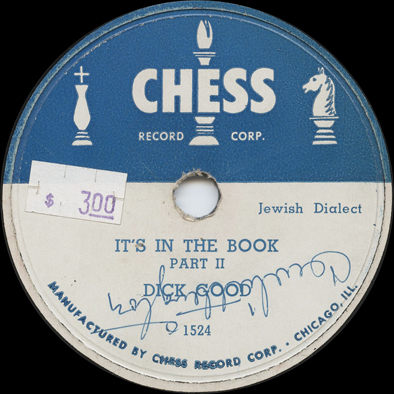
The company promptly followed with another classic Muddy Waters session, which took place on September 17. Little Walter was off leading his own band, so the red-hot amplified harmonica on these sides belongs to Amos "Junior" Wells, who was now working for Muddy even though he wouldn't turn 18 until December. Jimmy Rogers remained on second guitar, and Elga Edmonds on the drum stool. After four numbers had been concluded, Muddy turned over the lead guitar and vocal duties to Floyd Jones: note the close similarity between Floyd's "You Can't Live Long" and Muddy's "Standing Around Crying," both impassioned blues that creep at a funereal pace.
While Muddy's first release from the session (Chess 1526, on 78 and 45) was a hit, and Chess used a third side later on, sales of Floyd's release were disappointing (Chess 1527, a 78-only, is much harder to find today than Chess 1498) and the company quickly dropped him from its roster. He would return to his former label, JOB, in January 1953, then to Vee-Jay around a year later.
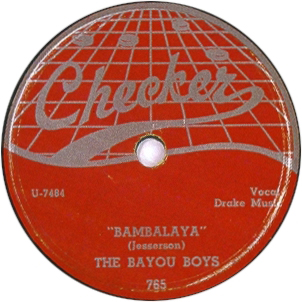
Later in September, the Chess brothers tried a vocal group called the Bayou Boys, about whom we still know little. Two of the sides were released on Checker 765, both 78 and 45; the other two have languished and are probably now lost. From the four-tune entry, we're inferring that the Bayou Boys were recorded in Chicago at Universal; the publisher identifications on the labels give us no further clue, as both sides of Checker 765 were standards.
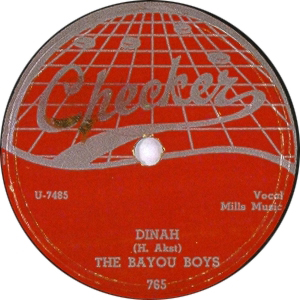
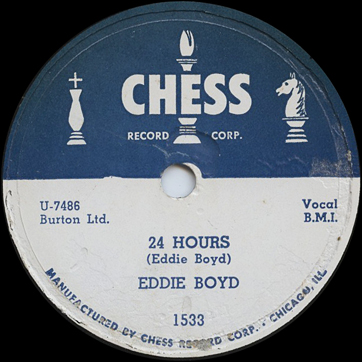
On October 10, Eddie Boyd returned to Chess after his excursion to JOB and a single outing for Al Benson (the latter is listed below, under Purchased Sessions). On this occasion, the songwriter-pianist was accompanied by Robert "Little Sax" Crowder (tenor sax), Robert Jr. Lockwood (guitar), Willie Dixon (bass), and Percy Walker (drums). "24 Hours," a classic complaint, and the ebullient instrumental "The Tickler" were coupled on Chess 1533, to considerable commercial success on both 78 and 45.
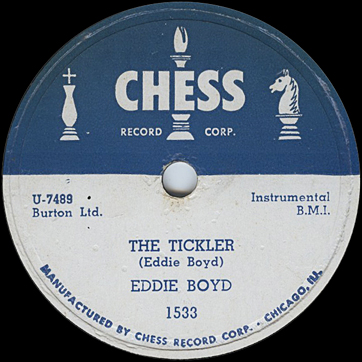
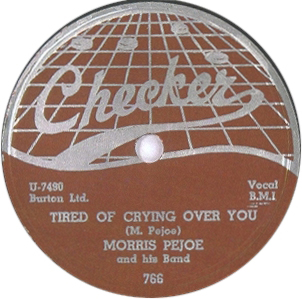
Next up was a 2-tune outing by Morris Pejoe. Checker issued a second single on him, on 78 and 45 rpm, but Checker 766 did not sell well, and it would be his last for the Chess brothers.
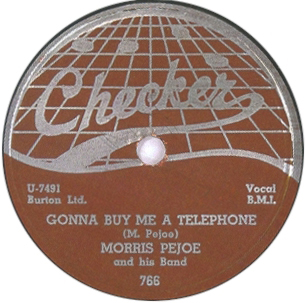
Fresh off a tour with his new band, Little Walter was brought back in October, for the first session that he would do on his own. It was a four-tune outing: two slow instrumentals, a fast instrumental, and one vocal (Walter's rendition of "Mean Old World," which had been done by T-Bone Walker for Rhumboogie). "Mean Old World" and one of the slow instrumentals, "Sad Hours," were promptly released on Checker 764. The other slow instrumental, later titled "Blue Midnight" had to wait till June 1960 for an appearance on Checker 955 (reviewed in Cash Box on June 18, 1960, p. 14). It partly redeemed the 45, which had an awful overdubbed version of "My Babe" on the plug side. An alternate take of "Blue Midnight" has also survived. The fast instrumental made it onto record in the 1970s.
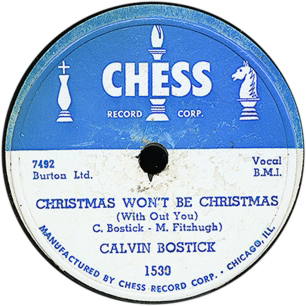
The company seems to have taken an extended holiday from Universal Recording at the end of the year. Calvin Bostick had joined forces with McKie Fitzhugh, the DJ, putting together a Christmas song. This was probably committed to tape in November, accompanied by strings; apparently it had no session mates. When released it was paired with a tune from his previous session.
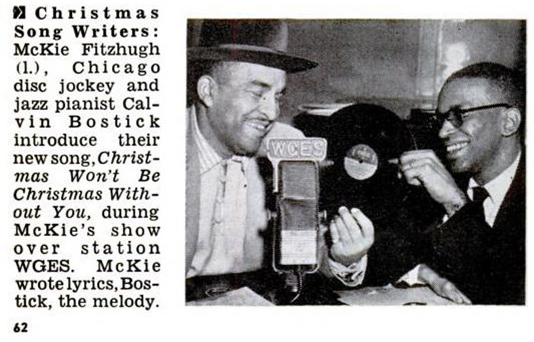
Bostick's association with Chess would end when he was drafted by the U.S. Army in 1953. He served two years in the Special Services Branch in Korea. Returning to Chicago, Bostick began a long residency at the 411 Club, which ran from October 1955 ("Chicago Nighteries on Swing, Bop Kick; Ravens in Spotlight," New York Age, October 8, 1955, p. 8) through much of 1957. He was now playing the organ for the most part. In June 1957, Bostick completed his formal music education, getting a degree from the Chicago Conservatory of Music. On June 12, 1958, he posted an indefinite contract at the Nocturne. He continued to perform throughout the Midwest, and reportedly recorded for Fraternity, RCA, and "Canadian" (probably Canadian-American) Records. He composed songs for Sammy Davis Jr. and his old inspiration Nat King Cole, among others. Beginning in 1963, Bostick began an 11-year career as a lounge act for the Holiday Inn circuit. Around 1970, he settled in Erie, Pennsylvania, where he died on April 9, 1974.
Sources on Calvin Bostick: “Calvin Cuts 2 New Sides,” Chicago Defender, 14 October 1950; “Calvin T. Bostick, 45, Musican, Songwriter,” Erie Times, 11 April 1974; Chicago Public Library's Musician Death Files.
The Chess brothers also tried a session with guitarist and singer Danny Overbea, which must not have turned out well, as nothing from it has ever surfaced. They would have better luck in the future.
Although Chess continued to keep its issue numbers in reasonably good order, the company dropped the ball in November 1952, when it put out two different 1525s. (It was long believed that there was no Chess 1524, but this turns out to have been the comedy record by Dick Good.) One Chess 1525 was a country recording by Guy Blakeman and His Blue Grass Serenaders (recorded in Shreveport, Louisiana, most likely a couple of years earlier); the other was a jazz recording (one side reissued from 1949; the other in the vault since 1950) by Gene Ammons.
In all, there are 106 known sides newly recorded for Chess in 1952 (if we count known alternate takes, but do not include some unexplained gaps in the series, such as U7452 through U7456 and U7472 through U7475). Three sides were cut in Jackson, Mississippi, where Leonard Chess made a clandestine session with Big Boy Crudup (C1022 and C1023 plus an alternate; in a move that fooled no one, these were attributed to "Percy Lee" Crudup). With the likely exception of the two Fats Thomas sides, the rest all seem to be from Universal Recording in Chicago.
| Matrix | Artist | Title | Release Number | Recording Date | Release Date |
| U7419 | through | U7422 | See | Purchased | Material |
| U-7423 | Eddie Johnson and his Orchestra | At Last | Chess 1503 [78 and 45 rpm] |
early February 1952 | April 1952 |
| U-7424 | Jimmy Rogers and His Rocking Four | Back Door Friend | Chess 1506 | February 11, 1952 | April 1952 |
| U-7425 | Eddie Ware and His Band | Jealous Women | Chess 1507 | February 11, 1952 | April 1952 |
| Eddie Ware and His Band | Failure Is My Destiny | February 11, 1952 | |||
| Eddie Ware and His Band | Lonesome and Forgotten | February 11, 1952 | |||
| Eddie Ware and His Band | Unlucky Gambler | February 11, 1952 | |||
| Jimmy Rogers and His Rocking Four | Crying Shame | (Chess 2ACMB207) | February 11, 1952 | ||
| C-1016 | "Big Boy" Spires and His Guitar | One of These Days | Checker 752 | March 13, 1952 | June 1952 |
| C-1017 | "Big Boy" Spires and His Guitar | Murmur Low | Checker 752 | March 13, 1952 | June 1952 |
| C-1018 | Arbee Stidham and His Orchestra | Some to Tell My Troubles To | Checker 751 | March 13, 1952 | April 1952 |
| C-1019 | Arbee Stidham and His Orchestra | Mr. Commissioner | Checker 751 | March 13, 1952 | April 1952 |
| C-1019 [alt.] | Arbee Stidham | Mr. Commissioner | (Chess CHD4-9340) | March 13, 1952 | |
| Arbee Stidham | Knob on the Door | March 13, 1952 | |||
| Arbee Stidham | Love You Give to Me | March 13, 1952 | |||
| C-1020 | Rocky Fuller and His Guitar | Soon One Morning | Checker 753 | March 13, 1952 | June 1952 |
| C-1020 [alt.] | Rocky Fuller | Funeral Hearse at My Door | (P-Vine Special Chess [J] PLP-6032) | March 13, 1952 | |
| C-1021 | Rocky Fuller and His Guitar | Come On Baby, Now | Checker 753 | March 13, 1952 | June 1952 |
| C-1021 [alt.] | Rocky Fuller | Rock Me Baby | (P-Vine Special Chess [J] PLP-6032) | March 13, 1952 | |
| Rocky Fuller | Under a Neon Sign | (P-Vine Special Chess [J] PLP-6032) | March 13, 1952 | ||
| Rocky Fuller | Catch Me a Freight Train | (P-Vine Special Chess [J] PLP-6032) | March 13, 1952 | ||
| Rocky Fuller | Looking for the Mail Man | (P-Vine Special Chess [J] PLP-6032) | March 13, 1952 | ||
| Rocky Fuller | Gonna Leave This Town | (P-Vine Special Chess [J] PLP-6032) | March 13, 1952 | ||
| Rocky Fuller | The Moon Won't Go Down | (P-Vine Special Chess [J] PLP-6032) | March 13, 1952 | ||
| Rocky Fuller | Raining and Storming | (P-Vine Special Chess [J] PLP-6032) | March 13, 1952 | ||
| U7426 | and | U7427 | See | Purchased | Material |
| U-7428 | Rev. Chambers | It's Praying Time | Chess 1511 | March or April, 1952 | May 1952 |
| U-7429 | Rev. Chambers | Me and the Devil | Chess 1511 | March or April, 1952 | May 1952 |
| U-7430 | Eddie Johnson and His Orchestra | This Love of Mine | Chess 1512 [78 and 45 rpm] |
c. April 1952 | May 1952 |
| 7431 | Eddie Johnson featuring Edna McRaney | Back-Up | Chess 1512 [78 and 45 rpm] |
c. April 1952 | May 1952 |
| 7432 | and | 7433 | See | Purchased | Material |
| U-7434 | Sax Mallard and His Orchestra | I'm Yours | Checker 755 | May 12, 1952 | July 1952 |
| U-7435 | Sax Mallard and His Orchestra | Teen Town Strut! | Checker 755 | May 12, 1952 | July 1952 |
| U7436 | Sax Mallard and His Orchestra | Left Alone | unissued | May 12, 1952 | |
| 7437 | Little Walter and His Night Cats | Juke | Checker 758 [78 and 45 rpm] |
May 12, 1952 | August 1952 |
| U7347 [alt.] | Little Walter and His Night Cats | Juke | (Chess CHD-9330) | May 12, 1952 | |
| 7438 | Little Walter and his Night Cats | Can't Hold On Much Longer | Checker 758 [78 and 45 rpm] |
May 12, 1952 | August 1952 |
| U7438 [alt.] | Little Walter and His Night Cats | Can't Hold Out Much Longer | (Chess CHD2-9357) | May 12, 1952 | |
| 7439 | Muddy Waters and his Guitar | Please Have Mercy | Chess 1514 | May 12, 1952 | June 1952 |
| C-1022 | Percy Lee [Arthur "Big Boy"] Crudup | Open Your Book (Daddy Wants to Read with You) | Checker 754 | May 11, 1952 [Jackson, MS] |
June 1952 |
| C-1023 | Percy Lee Crudup | Tears in My Eyes | Checker 754 | May 11, 1952 [Jackson, MS] |
June 1952 |
| C-1023 [alt.] | Percy Lee Crudup | Tears in My Eyes | (Genesis 2) | May 11, 1952 [Jackson] |
|
| 7440 U-7440 |
Calvin Bostick Calvin Bostick on Piano |
Four Eleven Boogie | Chess 1530 [78 and 45 rpm] Chess 1572 [78 and 45 rpm] |
May 27, 1952 | December 1952 prob. May 1954 |
| U-7440-A | Calvin Bostick on Piano | Bang Bang Blues | Chess 1572 [78 and 45 rpm] |
May 27, 1952 | prob. May 1954 |
| 7442 | Al Fats Thomas and Orchestra | Baby Please No No | Checker 759 | June 13, 1952 [Cleveland] |
July 1952 |
| 7443 | Al Fats Thomas and Orchestra | Dog Days | Checker 759 | June 13, 1952 [Cleveland] |
July 1952 |
| 1024 | Memphis Minnie with Little Joe and his Band | Broken Heart | Checker 771 [78 and 45 rpm] |
July 11, 1952 | May 1953 |
| C1024 [alt.] | Memphis Minnie with Little Joe and his Band | Broken Heart [alt.] | (Chess CHD4-9340) | July 11, 1952 | |
| C1025 | Memphis Minnie with Little Joe and his Band | Conjur Man | (Chess CHD4-9340) | July 11, 1952 | |
| C1026 | Memphis Minnie with Little Joe and his Band | Lake Michigan | (Chess CHD-9330) | July 11, 1952 | |
| 1027 | Memphis Minnie with Little Joe and his Band | Me and My Chauffeur | Checker 771 [78 and 45 rpm] |
July 11, 1952 | May 1953 |
| 1027 [alt.] | Memphis Minnie with Little Joe and his Band | Me and My Chauffeur | (MCA CD 380 596) | July 11, 1952 | |
| C1028 [U-1128] |
Blue Smitty and his String Men | Crying | Chess 1522 | July 11, 1952 | October 1952 |
| C1028 [alt.] | Blue Smitty and his String Men | Crying | (Chess LP 411) | July 11, 1952 | |
| C1029 [U-1129] |
Blue Smitty and his String Men | Sad Story | Chess 1522 | July 11, 1952 | October 1952 |
| C1030 | Blue Smitty and his String Men | Elgin Movements | (Chess [Br] 6641 174) | July 11, 1952 | |
| C1031 | Blue Smitty and his String Men | Date Bait | (Chess [Br] 6641 174) | July 11, 1952 | |
| Arbee Stidham | Blues | unissued | July 18, 1952 | ||
| Arbee Stidham | Baby Stop the Clock | (Rarin' LP 777) | July 18, 1952 | ||
| Arbee Stidham | Baby Stop the Clock | unissued | July 18, 1952 | ||
| Arbee Stidham | Blues, Why Do You Pick on Me | (Rarin' LP 777) | July 18, 1952 | ||
| Arbee Stidham | Blues, Why Do You Pick on Me | unissued | July 18, 1952 | ||
| Arbee Stidham | Same Old Story | unissued | July 18, 1952 | ||
| U7444 | Jimmy Rogers | Mistreated Baby | (Chess [Br] 6641 174) | August 12, 1952 | |
| 7445 | Jimmy Rogers and His Rocking Four | The Last Time | Chess 1519 | August 12, 1952 | October 1952 |
| U7446 | Jimmy Rogers | What's the Matter | (Chess [Br] 6641 174) | August 12, 1952 | |
| 7447 | Jimmy Rogers and His Rocking Four | Out on the Road | Chess 1519 | August 12, 1952 | October 1952 |
| U7448 | Rev. Green | unidentified title | unissued | August 1952 | |
| U7449 | Rev. Green | unidentified title | unissued | August 1952 | |
| U7450 | Rev. Green | unidentified title | unissued | August 1952 | |
| U7451 | Rev. Green | unidentified title | unissued | August 1952 | |
| U7452 | |||||
| U7453 | |||||
| U7454 | |||||
| U7455 | |||||
| U7456 | |||||
| U7457 | unidentified artist | Hole in the Jug | unissued | c. August 1952 | |
| U7458 | unidentified artist | Air Mail | unissued | c. August 1952 | |
| U7459 | unidentified artist | Uncle Bill | unissued | c. August 1952 | |
| U7460 | unidentified artist | Caravan | unissued | c. August 1952 | |
| U7461 | |||||
| U7462 | and | U7463 | See | Purchased | Material |
| U7464 | Eddie Johnson and his Orchestra | Night and Day | unissued | early September 1952 | |
| U7465 | Eddie Johnson and his Orchestra | unidentified title | unissued | early September 1952 | |
| U-7466 | Dick Good | It's in the Book Part I | Chess 1524 | early September 1952 | |
| U-7467 | Dick Good | It's in the Book Part II | Chess 1524 | early September 1952 | |
| U-7468 | Eddie Johnson and his Orchestra | Twin Rock | Chess 1544 [78 and 45 rpm] |
September 12, 1952 | July 1953 |
| U-7469 | Eddie Johnson and his Orchestra | I'm Just a Lucky So and So | (Chess CHV-415) | September 12, 1952 | |
| U-7470 | Eddie Johnson and his Orchestra | Tiptoe | Chess 1544 [78 and 45 rpm] |
September 12, 1952 | July 1953 |
| U-7470 [alt.] | Eddie Johnson and his Orchestra | Eddie's Boogie | (Chess CHV-415) | September 12, 1952 | |
| U-7471 | Eddie Johnson and his Orchestra | Cool Down Daddy | unissued | September 12, 1952 | |
| U7472 | |||||
| U7473 | |||||
| U7474 | |||||
| U7475 | |||||
| U-7476 | Muddy Waters and his Guitar | Who's Gonna Be Your Sweet Man | Chess 1542 [78 and 45 rpm] |
September 17, 1952 | May 1953 |
| 7477 | Muddy Waters and his Guitar | Standing Around Crying | Chess 1526 [78 and 45 rpm] |
September 17, 1952 | November 1952 |
| 7478 | Muddy Waters and his Guitar | Gone to Main St. | Chess 1526 [78 and 45 rpm] |
September 17, 1952 | November 1952 |
| U7479 | Muddy Waters | Iodine in My Coffee | (Chess [Br] 6641174) | September 17, 1952 | |
| U7480 | Floyd Jones | You Can't Live Long | Chess 1527 | September 17, 1952 | November or December 1952 |
| U7481 | Floyd Jones | Early Morning | Chess 1527 | September 17, 1952 | November or December 1952 |
| U7482 | The Bayou Boys | September Song | September 1952 | ||
| U7483 | The Bayou Boys | Sweetheart | September 1952 | ||
| U-7484 | The Bayou Boys | Bambalaya | Checker 765 [78 and 45 rpm] |
September 1952 | December 1952 |
| U-7485 | The Bayou Boys | Dinah | Checker 765 [78 and 45 rpm] |
September 1952 | December 1952 |
| U-7486 | Eddie Boyd | 24 Hours | Chess 1533 [78 and 45 rpm] |
October 10, 1952 | February 1953 |
| U7487 | Eddie Boyd | Hard Time Gettin' Started | (Chess CHD4-9340) | October 10, 1952 | |
| U7488 | Eddie Boyd | Best I Could | (Chess [J] PLP 6019) | October 10, 1952 | |
| U-7489 | Eddie Boyd | The Tickler | Chess 1533 [78 and 45 rpm] |
October 10, 1952 [78 and 45 rpm] |
February 1953 |
| U7489 [alt.] | Eddie Boyd | The Tickler | (Chess [J] PLP 6019) | October 10, 1952 | |
| U-7490 | Morris Pejoe and his Band | Tired of Crying over You | Checker 766 [78 and 45 rpm] |
October 1952 | March 1953 |
| U-7491 | Morris Pejoe and his Band | Gonna Buy Me a Telephone | Checker 766 [78 and 45 rpm] |
October 1952 | March 1953 |
| 1050 [alt.] | Little Walter | Blue Midnight | (Le Roi du Blues LP 2017) | October 1952 | |
| 1050 [10208*] |
Little Walter | Slow Blues [Blue Midnight*] |
Checker 955* [45 rpm] | October 1952 | June 1960 |
| 1051 | Little Walter | Boogie | (Genesis 3) | October 1952 | |
| U-1052 | Little Walter and his Night Caps [sic] | Mean Old World | Checker 764 [78 and 45 rpm] |
October 1952 | November 1952 |
| U-1053 | Little Walter and his Night Caps | Sad Hours | Checker 764 [78 and 45 rpm] |
October 1952 | November 1952 |
| 7492 | Calvin Bostick | Christmas Won't Be Christmas (With Out You) | Chess 1530 | October or November 1952 | December 1952 |
| 7493 | Danny Overbea | Walkin' with Danny | unissued | c. December 1952 | |
| 7494 | Danny Overbea | Flight of Danny | unissued | c. December 1952 | |
| 7495 | Danny Overbea? | unidentified title | unissued | c. December 1952 | |
| 7496 | Danny Overbea | Early One Morning | unissued | c. December 1952 | |
| 7497 | Danny Overbea | Do Right | unissued | c. December 1952 |
Leonard and Phil Chess continued to hedge their bets by obtaining a substantial portion of their material from other labels. A total of 79 sides are known to have been purchased in 1952. (We won't try to incorporate anything acquired from Premium but not released on Chess, because most of the masters the Chess brothers picked up in the deal they had no near-term interest in using. See ourPremium page for details.)
Again the biggest single source was Sam Phillips in Memphis, who provided 25 tracks, many of them by Howlin' Wolf. There was considerable tension between Sam Phillips and Leonard Chess in 1952, but Phillips pulled back from his first attempt to run a Sun label (which was not relaunched until 1953). Like it or not, he still needed Chess and Checker as outlets for many of the sides that he was cutting.
Three sessions at the Sun Studios produced four Chess releases by Howlin' Wolf. Both sides of Chess 1510 came out of a session on January 23, 1952, as did one side on Chess 1515. The other side of 1515 came from a session on April 17, 1952, the rest of which lay unreleased for many years. "Saddle My Pony," the side chosen for 1515, was a Charley Patton number whose primitive feel was inadvertently enhanced by some harmonica playing so out of tune as to make one suspect an elliptical record; it was the work of a young and inexperienced James Cotton. Nothing was wrong with the other tracks, but the Chess brothers lost interest in the session. A follow-up on October 7, 1952 yielded two of The Wolf's all-time best sides. Chess 1528, released in January 1953 (see the ad in Cash Box for January 17), coupled a lament ("My Last Affair") with a Harlem Hamfats number ("Oh Red"), on which The Wolf was accompanied by gutbucket tenor sax and trombone.
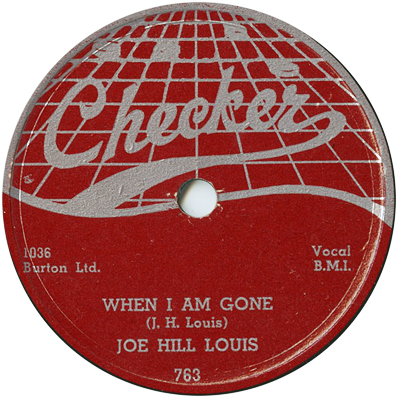
Joe Hill Louis played guitar, harmonica, and drums in a one-man band format. His first outing had been for Columbia in 1949, when he cut four sides in New York. He began recording heavily in Memphis in 1950, when he was responsible for a release on the ephemeral It's the Phillips label, then a whole slew of sides for Modern. In 1952, he returned to Sam Phillips, who dealt two of his sides to the Chess brothers. Despite the falling out between Sam Phillips and Leonard Chess, Phillips wasn't really ready to run his own label yet and the Chess brothers needed more masters for their new Checker label. A session on March 31, 1952 featuring just his guitar (and Nolan Hall on drums) yielded "When I Am Gone." The original master ran longer than the 3 minutes deemed reasonable for a single, so it was cut, producing an abrupt ending on the single. A follow-up on July 18, 1952, on which Louis recorded with a real combo of Walter Horton (harmonica), Jack Kelly (piano), and Willie Nix (drums), produced the powerful boogie "Dorothy Mae." Good as his Checker single was, the raw West Memphis guitar and rough sonics may not have appealed to record buyers, and the Chess brothers did not seek his services in the future. Joe Hill Louis continued to record for Phillips in 1952, producing a release on Sun. In 1953, he moved to Lester Bihari's Meteor label, adopting the peculiar pseudonym "Chicago Sunny Boy." After a final session for Sun that went unreleased at the time, he recorded for several small Memphis-area companies through 1957.
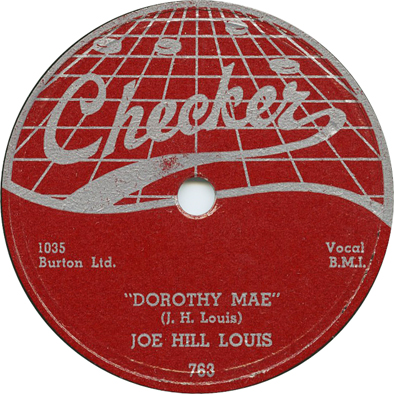
Not all of the Memphis-based artists recorded by Phillips turned out to have the Wolf's commercial appeal. The most extreme case was bluesman Woodrow Adams, who made just two sides for Phillips in May 1952. His release on Checker 757 is so rare that just one copy (it was in the collection of the late George Paulus) is known to have survived. Adams would have slightly better luck in 1955, when he recorded for Lester Bihari's Meteor label, producing a single that actually sold a handful of copies.
Al Benson's freelance activities in Chicago generated 12 more sides. He may also have been involved in some sessions with artists who were under contract to the Chess brothers. Meanwhile his Parrot operation, still prenatal in 1952, would do joint releases with Checker until June 1953.
Benson's first session under the new arrangement featured singer Joe Williams with the King Kolax combo including Bennie Green (trombone), Dick Davis (tenor sax), Prentice McCarey (piano), Ike Perkins (guitar), "Cowboy" Martin (bass), and Kansas Fields (drums). The July outing produced a hit version of "Every Day I Have the Blues." This would remain a signature tune for Williams after he joined the Count Basie Band at the end of 1954 and finally gained national prominence. Checker 762 was still in the company's active catalogue 10 years later. The other two sides from the session are not listed here because they were never used by Chess and the tapes didn't remain in the company's possession; when Benson sold his Parrot label at the beginning of 1956, he unloaded all four to Herman Lubinsky, who wanted Joe Williams material for his Regent and Savoy labels.
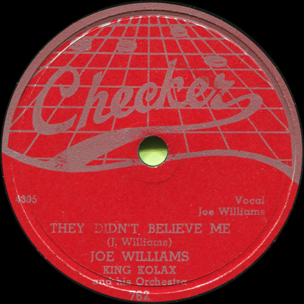
A new matrix series, the U4300s, was opened at Universal for the Benson productions. However, it was reserved for this purpose only till the end of 1952. During the first half of 1953, several regular Chess sessions would be slotted into it.
In August, Benson cut four sides by Eddie Boyd, who had scored a nationwide hit on JOB but wasn't satisfied with the royalties he was getting out of it. The move to Benson's freelance operation was easier for Boyd than signing with Chess, which he had every reason to believe had ripped him off the previous year. Chess 1523, "Cool Kind Treatment" b/w "Rosalee Swing," was released in October (advertised in Cash Box on October 15, 1952, p. 23). Cash Box, like the Chess brothers, expected another hit. The trade paper gave Chess 1523 a "Sleeper of the Week" (November 8, 1952, p. 20). Chess 1523 wasn't a hit, but Boyd's next outing would be directly for the Chess brothers—and this time he would cut "24 Hours."
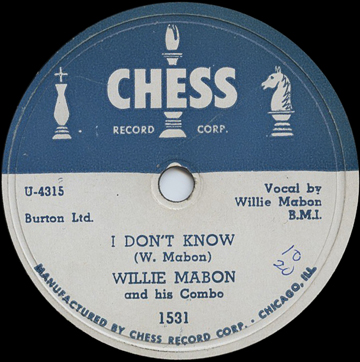
In October, Benson scored a second hit on his third try, a session featuring pianist Willie Mabon. Mabon got the idea of taking a Cripple Clarence Lofton number (recorded back in 1943 for Session) and modernizing it. "I Don't Know" became a huge hit. Benson figured it would be big and tried to launch his Parrot label with it, but copies of Parrot 1050 are extremely rare and probably never circulated outside of Chicago (see our Parrot page for an example). The Chess brothers rebranded some left-over Parrots as Checker 1050, which was 78 rpm only because Parrot 1050 had been 78 rpm only. As the Checker 750 series ground on, more than a decade elapsed, and no one remembered rebranding the Parrot. So an in-series Checker 1050 appeared, on 45 rpm only, in July 1963. This was by Gloria Brown; Checker 1050 on 78 would have nothing to do with Checker 1050 on 45.
It was the release on Chess 1531 that would get national distribution—and would be available on 45 rpm. Chess 1531 (attributed to someone called "Little Mahon") was first mentioned in "This Week's Territorial Best Sellers to Watch" in Billboard, November 22, 1952, p. 41.
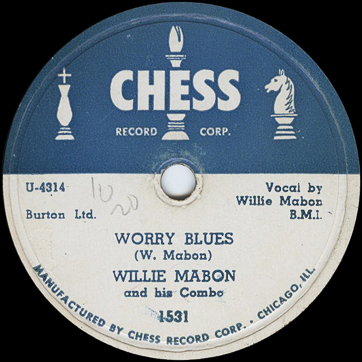
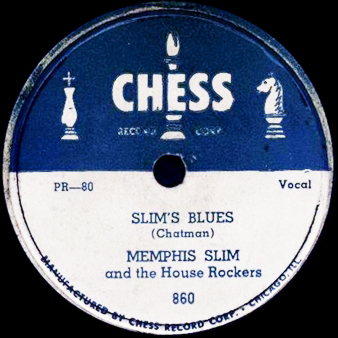
In December 1951, Chess acquired upwards of 50 masters from the now-shuttered Premium operation; 18 were used at the time. In three cases that we can document (the 78-rpm issue of Lynn Hope on Chess 851, its counterpart on Chess 861, and the Memphis Slim on Chess 860), Chess simply stuck its own labels onto unsold copies of the Premium pressings. Other possible relabel jobs are Chess 855 and 868, reissues of Premium 855 and 868 by the Reverend Robert Anderson (we have not been able to examine a copy to determine whether the Chess 78s still have a Premium-style runoff area). Another possible relabel is Chess 903 by Memphis Slim; we have not been able to examine this one either, but on the labels the FL-series matrix numbers have been distorted to FI. In another case, the Chess brothers decided to re-pair two gospel sides by Robert Anderson: Chess 858 thus consisted of one side from Premium 858 and one from Premium 859 (Premium 858 and 859 had, in their turn, been reissues of singles from the Miracle label).
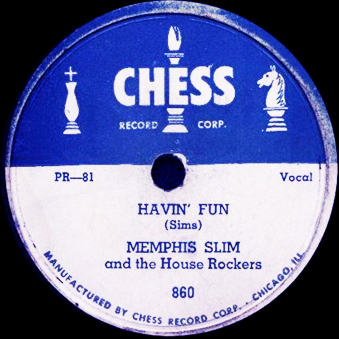
Premium did not put out 45s, so the one 45-rpm release from Premium stock that we have encountered (Chess 45-851) was newly pressed for the Chess brothers.
Other Premiums could easily have been rebranded; previous discographies have suggested that this happened to Memphis Slim on Premium 850 (though we will keep questioning the purported release number on Chess—840—until we see a copy with Chess labels on it). When Chess labels were merely applied to unsold 78-rpm pressings, we will in some cases be talking about low-volume releases. More investigation is still called for.
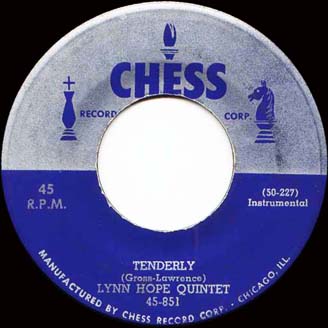
Meanwhile, there were three releases of previously unissued Premium material: Chess 1491 by Memphis Slim, Chess 1499 by Lynn Hope, and Chess 1501 by Tab Smith. Each sported new matrix numbers in the U7000 series, but there were giveaways as to provenance.
For instance, the Tab Smith release, which paired his effort at crooning (the song was titled "Love Is a Wonderful Thing" when he redid it for United) with a booting instrumental for his tenor sax, shows a scratched out matrix number (WB-51-196) in the trail-off vinyl on the "Love" side. (Why the WB? Apparently, because United Broadcasting Studio had once been World Broadcasting.) Both tunes show Premium Music Co. as their publisher. Despite the opportune titling of the instrumental side with the aim of drawing plays from a powerful disk jockey (originally called "Slow and Easy," it was called "Easy, Mr. Benson" on the first 78 rpm pressing), Chess 1501 (released on 45 as well as 78) didn't move enough disks to motivate further dipping into Smith's Premium sides. Smith rerecorded "Love Is a Wonderful Thing" for United in October 1951; the new version was released on United 113 in April 1952, which could not have helped sales on the Chess version. Smith would then remain securely under contract to United until the label folded at the end of 1957. In 1958 the Chess brothers were finally able to sign him, but his new tracks were given a fairly dreadful middle of the road production, and it soon became apparent that his popularity had faded.
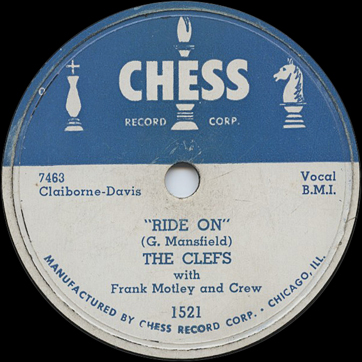
Two doowop sides by The Clefs came over from Lillian Claiborne's DC Records. The vocal group consisted of Scotty Mansfield (lead tenor), Pavel Bess (tenor), Frank Newman (2nd tenor), Fred Council (baritone), and Leroy Flack (bass). They usually worked with a guitarist named Leo Carter, but on this occasion the group was accompanied by Frank Motley's combo. Motley was an established bandleader in the Washington, DC, area, having recorded twice for the Gotham label in Philadelphia the previous year. In 1952, he cut two band sessions for DC, one of which was dealt to Specialty (apparently DC's distribution never grew beyond the regional). The date of the Clefs' session is not known with precision, but Motley made records under his own name for DC Records in May and June of 1952.
Motley is hard to miss, as he liked to play two trumpets at once, often in the upper register; note his fanfare at the beginning of "Ride On," and the extra blare he brings to the riffing later in the tune. However, it was the band's two excellent tenor saxophonists who got the instrumental solo space on Chess 1521. One of them was probably Herbert Whittaker, a long-time associate of Motley's. The likely lineup for the rhythm section: James Crawford (piano), Jimmy Harris (guitar), Leonard "Heavy" Swain (bass), and the redoubtably named TNT Tribble (drums). The accompaniment is vigorous and the overall sound on the record is OK, although Mrs. Claiborne liked to lay on more studio echo than Leonard Chess would have thought prudent with this kind of ensemble.
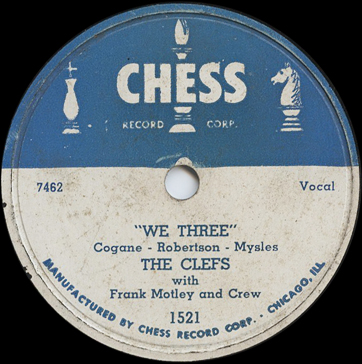
The Clefs would make one more session, for Peacock around the end of 1954. Motley continued to lead bands for a number of years. From 1953 through 1955 he cut variously for DC and two other local labels, Gem and Big Town, and in 1956 he recorded for Hollywood and Grand Prix.
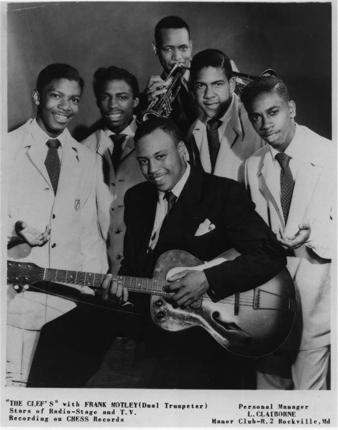
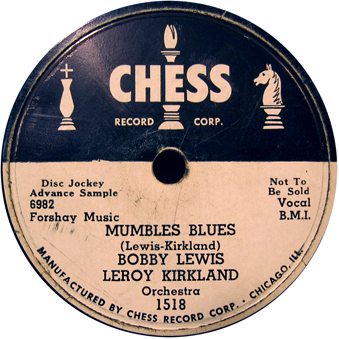
Bobby Lewis was a significant artist for Chess, despite the limited extent of his contributions (just the two sides of Chess 1518). Born in Indianapolis on February 17, 1933, he was orphaned at an early age. He learned to play the piano at age 6. When he was 12, a couple from Detroit adopted him and he was able to leave the orphanage. At 16, Bobby Lewis was working as a disk jockey in Detroit, and soon after that, he was touring. "Mumbles Blues," the 19-year-old Lewis's first recording, was cut in New York City in August, with a band led by Leroy Kirkland that included Alfred Cobbs on trombone, Sam the Man Taylor on tenor sax, Dave McRae on baritone sax, Fletcher Smith at the piano, James Cannady on guitar, and an unidentified bassist and drummer. Some of the mumbles were later appropriated by Screamin' Jay Hawkins (for "Little Demon"). We'd like to know who Lewis recorded the single for, before it was dealt to Chess.
Before Chess could get the record out, Paul Bascomb's band recorded another rendition of "Mumbles Blues," in Chicago for States on August 25. Then, for reasons that are now obscure, Leonard Allen dealt "Mumbles Blues" and a Bascomb instrumental to Mercury, which promptly released them. Since in 1952 Bobby Lewis and Paul Bascomb were both based in Detroit, we figure someone heard a live performance there and took immediate action.
Lewis stayed in Detroit for the rest of decade, working on a local TV series with comedian Soupy Sales. Moving to New York, he scored a #1 hit in 1961 with "Tossin' and Turnin'." He followed up with his only other chart hit, "One Track Mind," later that year. Bobby Lewis is one of a handful of early Chess artists still alive today.
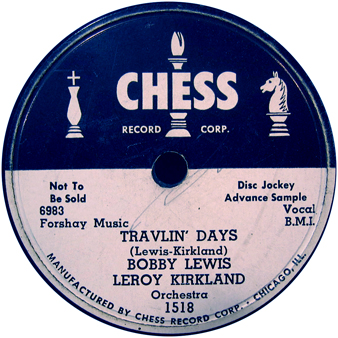
A special subseries, in the U6980s, was now set aside for some of the material Chess was purchasing. The sides by the vocal group The Encores were backed by tenor sax, piano, guitar, bass, and drums; we have no idea who the musicians were.
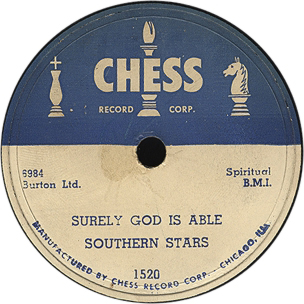
The Southern Stars were a jubilee-style gospel group, singing with one acoustic guitar for accompaniment. Who recorded them for the first time we aren't sure, but we figure it was a local outfit in Richmond, Virginia. Publicity on one of their later Chess releases mentioned such a connection. And then there's a delayed bit of promotion for Chess 1520, which had been released in September 1952. On March 14, 1953, Cash Box ran an item, complete with photo, on the group appearing at Archie Record Shop, run by Archie Elkins in Richmond ("'Don't Give Up'," p. 22). According to Hayes and Laughton, the Southern Stars' most likely lineup was Lin Harris, Doug Harris, Clarence Harley, John Light, Theodore Flemming, and John Green. One of them played acoustic guitar.
Although no one got confused over "Don't Give Up," the flip was supposed to be "Surely God Is Able," which the group had indeed recorded. Instead, Chess 1520 carried "This World's in a Bad Condition" (which the Chess master book, in turn, rendered as "World's Not in a Bad Condition." Acccording to Hayes and Laughlin, a 45-rpm "reissue" on Chess 1520 (well into the 1960s) used the real "Surely God Is Able."
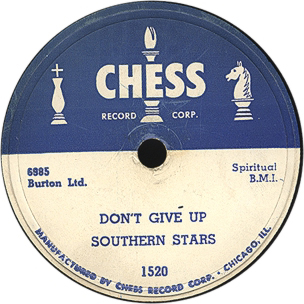
The Tommy Trent sides on Checker, probably the second pairing to be recorded in Shreveport, Louisiana, then brought to the company by Stan Lewis, are among the very few country releases from the early Chess years. They also use the U6980 matrix series.
A 13-side session by John Lee Hooker that had taken place in Detroit was immediately sold to Chess, very likely by Bernie Besman; one more apparently Besmanian side was acquired a little later.
| Matrix | Artist | Title | Release Number | Recording Date | Release Date |
| FI-210 [sic] [Premium 903] |
Memphis Slim and the House Rockers | Tia Juana | Chess 903 | mid-1951 [Cleveland] |
January 1952? |
| FI-213 [sic] [Premium 903] |
Memphis Slim and Terry Timmons | I'm Crying | Chess 903 | mid-1951 [Cleveland] |
January 1952? |
| U-7395 [Premium] |
Memphis Slim and His House Rockers | Walking Alone | Chess 1491 | mid-1951 [Cleveland] |
January 1952 |
| U-7396 [Premium] |
Memphis Slim and His House Rockers | Rocking the Pad | Chess 1491 | mid-1951 [Cleveland] |
January 1952 |
| 50-226, 5026 [UB50-226, Premium] |
Lynn Hope Quintet | Song of the Wanderer | Chess 851 [78 and 45 rpm] [Premium 851] |
March 1950 | January 1952? |
| 50-227, 5027 [UB50-227, Premium] |
Lynn Hope Quintet | Tenderly | Chess 851 [78 and 45 rpm] [Premium 851] |
March 1950 | January 1952? |
| 50-606 [UB50-606, Premium] |
Robert Anderson | Holding My Saviors Hand [sic] Part I | Chess 855 [Premium 855] |
June 1950 | January 1952? |
| 50-606-A [UB50-606A, Premium] |
Robert Anderson | Holding My Saviors Hand Part II | Chess 855 [Premium 855] |
June 1950 | 1950 |
| UB50-825 [Premium] |
Lynn Hope Quintet | Poinciana | Chess 861 [Premium 861] |
c. August 1950 | January 1952? |
| UB50-826 [Premium] |
Lynn Hope Quintet | Star Dust | Chess 861 [Premium 861] |
c. August 1950 | January 1952? |
| PR-71 [UB50-40, Miracle] |
Robert Anderson | Do You Know Him | Chess 858 [Premium 859, Miracle 154] |
January 1950 | January 1952? |
| PR-73 [91139, Miracle] |
Robert Anderson | My Friend Jesus | Chess 858 [Premium 858, Miracle 147] |
August 1949 | January 1952? |
| 50-607 [UB50-607, Premium] |
Robert Anderson | Prayer Changes Things | Chess 868 [Premium 868] |
June 1950 | January 1952? |
| 50-1065 [UB50-38 tk. 2, Miracle] |
Robert Anderson | God Answers Prayers | Chess 858 [Premium 868] |
January 1950 | January 1952? |
| PR-80 [UB50-219, Premium] |
Memphis Slim and the House Rockers | Slim's Blues | Chess 860 [Premium 860] |
March 1950 | January 1952? |
| PR-81 [UB50-220, Premium] |
Memphis Slim and the House Rockers | Havin' Fun | Chess 860 [Premium 860] |
March 1950 | January 1952? |
| U-7419 [UB50-228, Premium] |
Lynn Hope Quintet | Star Dust | Chess 1499 [78 and 45 rpm] |
March 1950 | March 1952 |
| U-7420 [UB50-229?, Premium] |
Lynn Hope Quintet | More Bounce to the Ounce | Chess 1499 [78 and 45 rpm] |
March 1950 | March 1952 |
| U-7421 [UB51-196, Premium] |
Tab Smith and His Orchestra | Love | Chess 1501 [78 and 45 rpm] |
April 1951 | March 1952 |
| U-7422 [UB51-199?, Premium] |
Tab Smith and His Orchestra | Easy, Mr. Benson [on an early 78 pressing] Slow and Easy [on all other copies] |
Chess 1501 [78 and 45 rpm] |
April 1951 | March 1952 |
| U-7426 [Sam Phillips] |
The Howlin' Wolf | Gettin' Old and Grey | Chess 1510 | January 23, 1952 [Memphis] |
April 1952 |
| U-7427 [Sam Phillips] |
The Howlin' Wolf | Mr. Highway Man | Chess 1510 | January 23, 1952 [Memphis] |
April 1952 |
| 1029 [Sam Phillips] |
The Howlin' Wolf | Worried All the Time | Chess 1515 | prob. January 23, 1952 [Memphis] |
July 1952 |
| ? [alt.; prob. Bernie Besman] |
John Lee Hooker | Walkin' the Boogie | (Chess LP 8203) | April 24, 1952 [Detroit] |
|
| 7432 [prob. Bernie Besman] |
John Lee Hooker | Walking the Boogie | Chess 1513 | April 24, 1952 [Detroit with overdubs in Chicago] |
June 1952 |
| 7433 [prob. Bernie Besman] |
John Lee Hooker | Sugar Mama | Chess 1513 | April 24, 1952 [Detroit] |
June 1952 |
| ? [prob. Bernie Besman] |
John Lee Hooker | Please Don't Go | (Chess LP 1454) | April 24, 1952 [Detroit] | |
| ? [prob. Bernie Besman] |
John Lee Hooker | I Don't Want Your Money | (Chess LP 1454) | April 24, 1952 [Detroit] | |
| ? [prob. Bernie Besman] |
John Lee Hooker | Hey Baby | (Chess LP 1454) | April 24, 1952 [Detroit] | |
| ? [prob. Bernie Besman] |
John Lee Hooker | Bluebird | (Chess LP 1454) | April 24, 1952 [Detroit] |
|
| ? [prob. Bernie Besman] |
John Lee Hooker | Love Blues | (Chess LP 1438) | April 24, 1952 [Detroit] |
|
| ? [prob. Bernie Besman] |
John Lee Hooker | Lonely Boy Boogie (New Boogie) | (Chess LP 1454) | April 24, 1952 [Detroit] |
|
| ? [prob. Bernie Besman] |
John Lee Hooker | Apologize | (Chess LP 1454) | April 24, 1952 [Detroit] |
|
| ? [prob. Bernie Besman] |
John Lee Hooker | The Journey | (Chess LP 1454) | April 24, 1952 [Detroit] |
|
| ? [prob. Bernie Besman] |
John Lee Hooker | Worried Life Blues | (Chess LP 1454) | April 24, 1952 [Detroit] |
|
| ? [prob. Bernie Besman] |
John Lee Hooker | Down at the Landing | (Chess LP 1438) | April 24, 1952 [Detroit] |
|
| ? [prob. Bernie Besman] |
John Lee Hooker | You Have Two Hearts | (Chess CHD2-9391) | 1952 [Detroit] |
|
| 1024 [Sam Phillips] |
Rufus Thomas, Jr. | Juanita | Chess 1517 | April 11, 1952 [Memphis] |
September 1952 |
| 1025 [Sam Phillips] |
Rufus Thomas, Jr. | Decorate the Counter | Chess 1517 | April 11, 1952 [Memphis] |
September 1952 |
| 1026 [Sam Phillips] |
Willie Nix | Truckin' Little Woman | Checker 756 | April 25, 1952 [Memphis] |
July 1952 |
| 1027 [Sam Phillips] |
Willie Nix | Just One Mistake | Checker 756 | April 25, 1952 [Memphis] |
July 1952 |
| 1028 [18753] [Sam Phillips] |
The Howlin' Wolf | Saddle My Pony (Gonna Find My Baby out in the World Somewhere) | Chess 1515 | April 17, 1952 [Memphis] |
July 1952 |
| ? [Sam Phillips] |
The Howlin' Wolf | Bluebird | (Chess CHD3-9332) | April 17, 1952 [Memphis] |
|
| ? [Sam Phillips] |
The Howlin' Wolf | (Well) That's All Right | (Chess CHD3-9332) | April 17, 1952 [Memphis] |
|
| ? [Sam Phillips] |
The Howlin' Wolf | Everbody's in the Mood | (Chess CHD2-9349) | April 17, 1952 [Memphis] |
|
| ? [Sam Phillips] |
The Howlin' Wolf | Color and Kind | (Rounder LP 28) | April 17, 1952 [Memphis] |
|
| ? [Sam Phillips] |
The Howlin' Wolf | Dorothy Mae | (Chess CHD2-9349) | April 17, 1952 [Memphis] |
|
| ? [Sam Phillips] |
The Howlin' Wolf | Sweet Woman | (Chess CHD2-9349) | April 17, 1952 [Memphis] |
|
| ? [Sam Phillips] |
The Howlin' Wolf | Decoration Day | (Chess CHD2-9349) | April 17, 1952 [Memphis] |
|
| C1030 [Sam Phillips] |
Woodrow Adams and the Three B's | Pretty Baby Blues | Checker 757 | May 24, 1952 [Memphis] |
July 1952 |
| C1031 [Sam Phillips] |
Woodrow Adams and the Three B's | She's Done Come and Gone | Checker 757 | May 24, 1952 [Memphis] |
July 1952 |
| 1033 [Sam Phillips] |
Billy (Red) Love | My Teddy Bear Baby | Chess 1516 | May 28, 1952 [Memphis] |
August 1952 |
| 1034 [Sam Phillips] |
Billy "Red" Love | Poor Man | Chess 1516 | June 10, 1952 [Memphis] |
August 1952 |
| 6980 [source unidentified] |
Encores | When I Look at You | Checker 760 [78 and 45] |
1952 [Baltimore?] |
September 1952 |
| 6981 [source unidentified] |
Encores | Young Girls, Young Girls | Checker 760 [78 and 45] |
1952 [Baltimore?] |
September 1952 |
| 6982 [source unidentified] |
Bobby Lewis | Leroy Kirkland Orchestra | Mumbles Blues | Chess 1518 [78 and 45] |
August 6, 1952 [New York City] |
September 1952 |
| 6983 [source unidentified] |
Bobby Lewis | Leroy Kirkland Orchestra | Travlin' Days [78] Travelin' Days [45] |
Chess 1518 [78 and 45] |
August 6, 1952 [New York City] |
September 1952 |
| 6984 [source unidentified] |
Southern Stars | Surely God Is Able [sic] [This World's In a Bad Condition] |
Chess 1520 | ? [Richmond VA] |
September 1952 |
| 6985 [source unidentified] |
Southern Stars | Don't Give Up | Chess 1520 | ? [Richmond VA] |
September 1952 |
| 6986 [Stan Lewis] |
Tommy Trent | Paper Boy Boogie | Checker 761 | 1952 [Shreveport] |
September 1952 |
| 6987 [Stan Lewis] |
Tommy Trent | Sweetheart I Am Missing You | Checker 761 | 1952 [Shreveport] |
September 1952 |
| 4301 [Al Benson] |
Joe Williams | King Kolax and his Orchestra | Every Day I Have the Blues | Checker 762 [78 and 45] |
c. July 1952 | September 1952 |
| 4305 [Al Benson] |
Joe Williams | King Kolax and his Orchestra | They Didn't Believe Me | Checker 762 [78 and 45] |
c. July 1952 | September 1952 |
| 7462 [DC] |
The Clefs with Frank Motley and Crew | We Three | Chess 1521 | prob. May or June 1952 [Washington DC] |
October 1952 |
| 7463 [DC] |
The Clefs with Frank Motley and Crew | Ride On | Chess 1521 | prob. May or June 1952 [Washington DC] |
October 1952 |
| U 4310 [Al Benson] |
Eddie Boyd and His Chess Men | Blues for Baby | (Chess [G] 6.24810 Chess [J] PLP 6019) |
c. August 1952 | |
| U-4311 [Al Benson] |
Eddie Boyd | Cool Kind Treatment | Chess 1523 | c. August 1952 | October 1952 |
| U 4312 [Al Benson] |
Eddie Boyd | untitled instrumental | c. August 1952 | ||
| U-4313 [Al Benson] |
Eddie Boyd | Rosalee Swing | Chess 1523 | c. August 1952 | October 1952 |
| 1035-A [Sam Phillips] |
Joe Hill Louis | Dorothy Mae | Checker 763 [78 and 45 rpm] |
July 18, 1952 [Memphis] |
November 1952 |
| 1036-A [Sam Phillips] |
Joe Hill Louis | When I Am Gone | Checker 763 [78 and 45 rpm] |
March 31, 1952 [Memphis] |
November 1952 |
| 1037-3 [Sam Phillips] |
Howlin' Wolf | Oh, Red!! | Chess 1528 [78 and 45 rpm] |
October 7, 1952 [Memphis] |
January 1953 |
| 1038-2 [Sam Phillips] |
Howlin' Wolf | My Last Affair | Chess 1528 [78 and 45 rpm] |
October 7, 1952 [Memphis] |
January 1953 |
| U-4314 [Al Benson] |
Willie Mabon and his Combo | Worry Blues | Chess 1531 [78 and 45 rpm] (Parrot 1050) (Checker 1050) |
c. October 1952 | November 1952 |
| U-4315 [Al Benson] |
Willie Mabon and his Combo | I Don't Know | Chess 1531 [78 and 45 rpm] (Parrot 1050) (Checker 1050) |
c. October 1952 | November 1952 |
| U4315A [Al Benson] |
Willie Mabon and his Combo | See Me Cry | unissued | c. October 1952 | |
| U4315B [Al Benson] |
Willie Mabon and his Combo | L.A. | unissued | c. October 1952 | |
| 1041 [Sam Phillips] |
Walter Horton | Walter's Boogie | Chess 1529 (withdrawn) | September 15, 1952 [Memphis] |
November 1952 |
| 1042 [Sam Phillips] |
Walter Horton | West Winds Are Blowing | Chess 1529 (withdrawn) | September 15, 1952 [Memphis] |
November 1952 |
| U-4316 [Al Benson] |
Danny Overbea and his Combo | Train, Train, Train | Checker 768 [78 and 45 rpm] |
c. December 1952 | January 1953 |
| U-4317 [Al Benson] |
Danny Overbea and his Combo | I'll Wait | Checker 768 [78 and 45 rpm] |
c. December 1952 | January 1953 |

By the end of 1952, Chess Records was expanding significantly. Even so, the company's total recording activity in Chicago hadn't climbed all the way back to the mark that Aristocrat had set in 1947. Leonard Chess remembered how dangerous it was for a small company to record and master 135 sides in a year when there was no assurance that most of them would ever bring in revenue.
We are indebted to Michel Ruppli's Discography of the Chess Label for our basic listing. We have supplemented this with Les Fancourt's Chess Blues Discography and many other sources. Our thanks to Mike Kredinac for supplying label information and dubs of the rare Chess 1430. Bill Daniels supplied further details concerning Howlin' Wolf's sessions with Sam Phillips during this period, and a list of issues of Billboard in which 1953 and 1954 releases were first mentioned. Alex Podlecki corrected our release date for one of the two Chess 1525s; the Chess 1525 by Gene Ammons was first reviewed in the trade papers on August 30, 1952.
Special kudos go to Dave Sax and Colin Escott for sorting out the 1951 and 1952 John Lee Hooker recordings (see their notes to the 1998 2-CD package John Lee Hooker: The Complete '50s Chess Recordings, Chess CHD2-9391). Dave Sax also provided some corrections to our Eddie Boyd listings (email communication, September 7, 2006). Blues with a Feeling: The Little Walter Story, by Tony Glover, Scott Dirks, and Ward Gaines (New York: Routledge, 2002), is a valuable discographical source on the many sessions on which Little Walter participated. Robert Javors turned up a previously unknown Premium 78 rebranded with the Chess label: Chess 861 by Lynn Hope. Tony Berci turned up Chess 860 by Memphis Slim. There may still be a couple more of these.
We strongly recommend Nadine Cohodas' book on the Chess brothers and the Aristocrat/Chess label: Spinning Blues into Gold: The Chess Brothers and the Legendary Chess Records, published in May 2000. (For more about the book see http://www.bluestogold.com.) This is not just one of the best books ever written about the Chicago scene, it may be the best book ever written about the record business. Among other things, it is our source for the April 1951 Chess Records catalog and the launch date for the Checker label.
Click here to return to the Red Saunders Research Foundation
Click here to return to Robert L. Campbell's Home page.